BLUE MOUNTAIN
Issue 31 april 2024
conversation with billy bob thornton & J.d. Andrew of the boxmasters
Rev. SeiFu Singh-Molares on spiritual companionship & healing
andrew MCFADyEN-KETCHUM with Fightorflight

january gill o’neil walks the glitterroad
nicole witt Weaves her soul into deep, country roots
Chelsey clammer champions life through essays get into notre dame’s mfa program
Poetry, Fiction, Essays & Microfiction
A JOURNAL OF CULTURE
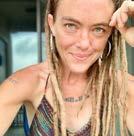
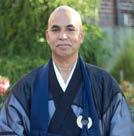

REVIEW THE
Chelsey Clammer January gill o’nEil Rev. S ei F u Anil Singh-Molares
TABLE OF CONTENTS INTRODUCTIOn ................................................ 1 A World of Our Making by Stuart Dischell LITERARY INTERVIEWS ...................................... 7 Andrew McFadyen-Ketchum ............................................. 9 Chelsey Clammer .............................................................. 13 Christopher Moore .......................................................... 17 Heather Hartley ................................................................ 19 January Gill O’Neil ........................................................... 23 Laura McHugh .................................................................. 29 Mark Doty ......................................................................... 33 Michael B. Tager ............................................................... 35 Nathan Spoon ................................................................... 41 Reverend SeiFu Anil Singh-Molares ................................ 45 Robert Petrillo .................................................................. 49 MUSIC INTERVIEWS ........................................ 55 Billy Bob Thorton & J.D. Andrew of The Boxmasters ............................................................ 57 Nicole Witt ........................................................................ 65 visual art INTERVIEWS ................................. 69 Shallon Fadlien ................................................................. 71 Special Features.......................................... 75 Graham Pritz-Bennett ...................................................... 77 Lauren Alwan ..................................................................... 83 Paul Cunningham ............................................................. 87 Rose Wislar ........................................................................ 91 Keith Flynn ....................................................................... 93 Michael Jann .................................................................... 97 REVIEWS ...................................................... 99 Uncut and Unfiltered, a Guide to Alan Cumming’s New Cabaret Show by Judy Kirkwood ........................................................... 101 A Splice of Life by Matthew Schmidt ............................... 103 Fight or Flight by Jennifer Yanez-Alaniz ........................ 107 Fiction ...................................................... 109 Laundromat Salvation by Ben McFry ............................ 111 Yard Friends by Brian Belefant ...................................... 115 Essays ........................................................ 121 The Magic of Connection by Echo Montgomery Garrett ......................................... 123 Confessions of a Deviant Reader by Marilyn Kriete ............................................................ 127 Because That Happened by Chelsey Clammer ............... 131 Building a Movement Against Circumcsision by Georganne Chapin ............................. 135 Skin in the Game by Kevin Garrett ................................. 143 If You Find This by Bryan Fry ........................................ 147 Congo Dance Notes by Chris Daly .................................. 153 The Zaza Stands Alone by Jana Harris ........................... 157 Finding Reasons to Run by Melissa Anne Tolentino ........................................... 161 The Road to Woodstock by Robert Petrillo .................... 167
The Hammer’s Strike by Andrew McFadyen-Ketchum .....................................
Heaven-Fire by Andrew McFayden-Ketchum .....................................
Catch & Release by Andrew McFadyen-Ketchum .....................................
And The World Spins by William Waters ...........................................................
Hand-Tinting 25-Cent by Tyrone Jaeger .......................
Dressing for Dinner, or Here Goes My Darling At Depatures -
Napoli by Heather Hartley .............................................
Momma’s Song by Heather Harris .................................
A Russian-American Novel by Maxim D. Shrayer ......................................................
Blue by Homa Mojadidi ..................................................

by Kendel Hippolyte ............................................
Squishmallow Poem by Nathan Spoon
I’ve Recently Been Diagnosed with Dumbass Disease by Rani Ruad0 ...................................
In the Santa Maria Sopra Minerva by Raye Hendrix .............................................................
Sagra Del Pesce, Camogli by Stephanie Papa ................
I Don’t Remember What She Looks Like by Trey Rhone ..............................................
POETRY ...................................................... 171
173
175
177
179
181
183
185
187
191 Life
193
197
201
Sentences by Jeffrey Greene ....................................
Rock by John Robert Lee ................................................
Bright
203
...........................
207
211
213
215
A WORLD OF OUR MAKING
by STUART DISCHELL
“This is not a world of my making,” my mother would frequently say, regarding things both large and small, during the latter decades of her very long life that lasted until the age of 101. Approaching 70, I find myself dutifully echoing the same sentence when confronted with many aspects of contemporary existence that I find annoying, irritating, and downright aggravating. Try as I might not to be a curmudgeon, I hover in the doorway of the present because I do not know how to properly enter.
Let me give some, petty examples. I changed planes at Newark’s Liberty Airport and wanted a drink and something to eat. I attempted to order from the bartender at the bar where I seated myself, but she told me that everything must ordered through the touchpad in the harness between us. I ordered my beer and sandwich. I was the only customer at the bar. It took what seemed a long while for my beer to be processed to her station. She and I were part of the cosmic joke together. The sandwich never arrived. I canceled it, but the charge appeared on my credit card anyway.
Recently, I stayed in an accommodation—not exactly a rental apartment or hotel room—but a suite in something like a small condominium building. It was paid for by some kind folks who invited me for an event. It was not the kind of place I would book for myself. I was contacted via text to upload my identification and credit card details. The “hotel” sent me a confirmation text and on the day of arrival after four pm they sent a code that allowed entry to the room. No front desk, no bellhop, no concierge, no security guard, no bar, or restaurant. There was a number to call or text in case of issues regarding the room. I nearly froze to death because I did not realize that the bedside remote control was for the heater.
I helped my son find a rental apartment. We located something available online. We were directed to a service that gave us a few set hours to unlock the key box to the apartment. We paid for this service. We toured the apartment and locked up afterwards. The lease was processed online. Every month he pays through an online company that charges a fee. I was taken aback to learn there was no place to mail a check or drop one off. When I lived in Cambridge, in the 1980s I would put my rent check, frequently late, through the mail slot of Mrs. Cronin’s faded pink Victorian on Mass. Ave. Certainly, a memory of a bygone era.
I can go on with my peeves. Everyone my age has them. If there’s an app for older people with peeves, I would gladly download it. I realize how fortunate I am to have such complaints--like not having enough bubbles in the champagne or that the caviar eggs are too large. Undeniably, information delivery technology is a boon in instances other than the cranky examples from my life. The newspapers and journals, such as The Blue Mountain Review--I read online, and the bounty of music and films I stream bring me great pleasure. Our delivery systems of literature, art, and culture keep changing fast--even and especially in the manner these words have been written by me and read by you. I am not against technology, but I militate against the acceptance of a culture of impersonality that has derived from its uses. Some people have swiftly adapted with each incarnation of machinery. I am not certain that it is a good thing.
Let me hit the pause button, if only for a moment. As citizens we hold elections over our competing rights, but nobody voted for the devices and technologies that have irrevocably changed our lives and rewired so many brains. I have questions to pose. Can a person have an inner life with a device? Has knowing how and where to find knowledge made people less knowledgeable? Have our communication technologies brought about peace, coexistence, or worked as a positive unifying force for humanity? One might unfortunately conclude that it is not the technology at fault but like all else, it is in the manner in which people use it.
My mother believed that art and literature could uplift humanity. She was awarded the Saint-Gaudens Medal for an outstanding New York City high school art student but never formally trained as an artist. Cornell University offered her a scholarship, but her family was still too poor, so she declined. Her father had died when she was a child and her mother retreated into grief. Never a hearty person, she nonetheless lived to 101. Until her death, she was the most voracious reader I have ever known. A true autodidact, she had a lot of strong opinions.
President of the Atlantic County League of Women Voters, my mother waged a lifelong fight for civil rights and women’s rights. Much to my father’s amusement and chagrin, the FBI photographed her at demonstrations. My niece considers her a feminist artist, and I am inclined to agree. Her paintings, mostly of women, depict harmony and
1

friendship. She and her friends were the only intellectuals I knew as a child. Her only portraits of men were done of my brother, me, and then Dr. King after his assassination.
In a world of my mother’s making, artistic endeavor would be respected and compensated, experts and scientists would be valued and valorized, and heads of state would work together to improve the lives of citizens. There would be no condescension towards the poor, no mockery of the infirm, no religious hypocrisy, no torment to the struggling, and no idolatry of celebrity, except for those who have accomplished notable achievements. My mother would deride a human that needed to use A.I. and would not tolerate the concept of an “influencer.”
Mary Dischell painted well into her mid-90s. The worse her vision got, the more vibrant her colors became. Perhaps her last and lasting lesson is: if this is not a world of your making and you cannot remake it, you can still create.
2
https://open.spotify.com/episode/3DoVsLpj6AR3IECiOCJKof?si=Mf7rnmLsTBOYVMxa49ScRQ
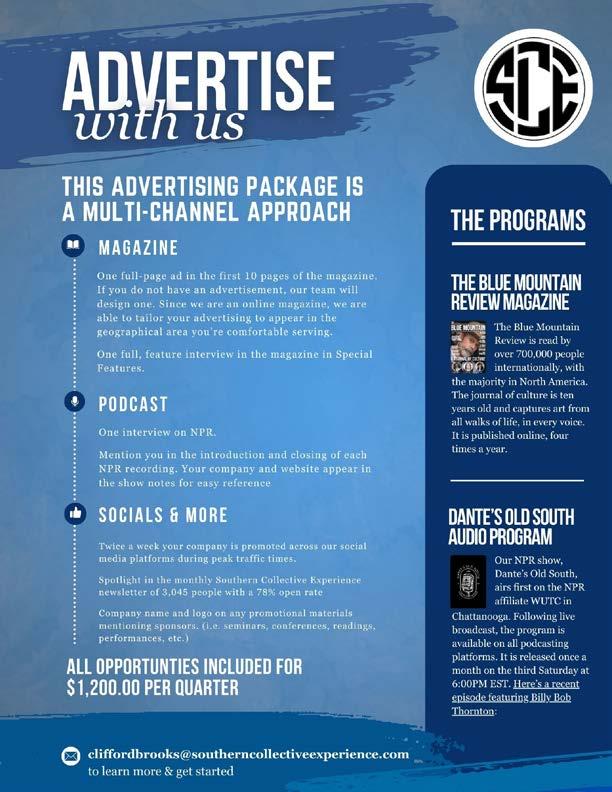
cliffordbrooks@southerncollectiveexperience.com
The SCE Press Presents The SCE Press Presents



Lynne Kemen’s writing appears in various literary journals and anthologies. She published her chapbook, More Than a Handful, in 2020 with Woodland Arts Editions. She contributes as an Interviewer and Essay Editor for The Blue Mountain Review, a culture-focused journal. She is a member of The Southern Collective Experience and is on the boards of two not-for-profit organizations. She lives with her husband, William Rossow, and their four cats in the Great Western Catskills of Upstate New York.
Lynne Kemen’s Shoes for Lucy is a beautiful and relatable collection of poems that explores a wide range of emotions. From grief to rediscovery, Kemen writes with a deft hand, creating vibrant and introspective pieces that remind us to cherish life’s simple pleasures.
— Kelli Russell Agodon
Author of Dialogues with Rising Tides (Copper Canyon Press)
Shoes for Lucy is like a beautiful summer storm on the porch - bursts of light, cool breeze, fragments of childhood dreams, and echoes spreading out in all directions.
— Jack B. Bedell
Author of Against the Woods’ Dark Trunks, Poet Laureate of Louisiana, 2017-2019
A genre-bending powerhouse of a collection. A spare, artful blend of poetry and fiction, Kemen combines masterful storytelling with lyrical prowess. A bit Oliver, a bit Forster, and a bit Bass, Kemen deftly invokes her literary heroes, while inking her heart on her sleeve. “I go outside and touch my flowers and wish it was you.” she longingly writes. Penned in the beautiful voice of a wise and witty friend.
Nicole Tallman
Author of Poems for the People (SCE Press) and Something Kindred (SCE Press)


Exiles of Eden by Clifford Brooks 978-1-7347498-6-1
978-1-7347498-0-9

Something Kindred by Nicole Tallman
978-1-7362306-1-9

Poems for the People by Nicole Tallman
978-1-7362306-2-6

Draw of Broken Eyes & Whirling
by Clifford Brooks
978-1-7347498-3-0

Things I Wish I Could Tell You by Casanova Green
978-1-7362306-0-2

the Butterfly by Tracy Hagan 978-1-7347498-8-5


The Ghost Gospels by Laura Ingram 978-1-7347498-7-8

Tell Me What You Saw and What You Think It Means by Steve Bellin-Oka
dreamterludes by Monica Kim
The
Metaphysics
Flutterby
Athena Departs: Gospel of a Man Apart by Clifford Brooks
learn more & purchase: southerncollectiveexperience.com/the-sce-press/ Shoes for Lucy by Lynne Kemen 978-1-7362306-4-0
https://www.southerncollectiveexperience.com/the-sce-press/

NEW RELEASES AND FORTHCOMING

RELEASE DATE FEBRUARY 20, 2024

RELEASE DATE
SEPTEMBER 24, 2024

RELEASE DATE OCTOBER 1, 2024
THIS PENIS BUSINESS A Memoir
Georganne Chapin with Echo Montgomery Garrett Activist Memoir/Bioethics/ Medical Ethics
ISBN: 9781950495450 $21.99

RELEASE DATE FEBRUARY 20, 2024
PLEASE DON’T CUT THE BABY! A Nurse’s Memoir
Marilyn Fayre Milos with Judy Kirkwood Activist Memoir/Medical Nursing/Social, Ethical & Legal Issues
ISBN: 9781950495498 $21.99

RELEASE DATE MAY 5, 2024
SING FOR THE RED DRESS Smokey River Suspense Series
Joseph M. Marshall III Sagas/Thrillers/Suspense/ Indigenous Families/ Mystery/Detective
ISBN: 9781950495542 $26.99
WAITING FOR GABE A Novel
Diana Black Fiction/Ghost Family & Relationships/ Death/Grief/Bereavement
ISBN: 9781950495566 $17.99

RELEASE DATE OCTOBER 1, 2024
TWIRLING IN A BEAM OF LIGHT
Judy Kirkwood Poetry/Divorce/ Parenting/Love and Loss
ISBN: 9781950495573
$15.99
THE WOLF AND THE CROW Smokey River Suspense Series
Joseph M. Marshall III Sagas/Thrillers/Suspense/ Indigenous Families/ International Crimes & Mystery
ISBN: 9781950495528 $26.99

RELEASE DATE OCTOBER 1, 2024
FALL 2024/WINTER 2025
LAST PRISONER OF LITTLE BIGHORN Smokey River Suspense Series
Joseph M. Marshall III Sagas/Thrillers/Suspense/ Indigenous: Mystery/ Detective/Romance
ISBN: 9781950495559 $26.99
Blood on the Dress Smokey River Suspense Series by Joseph M. Marshall III, 10/1/24 ‘Twas Halloween Night By Geoffrey Owens, Illustrations by Karen Hopkins Harrod, 10/1/24
Happenstance Time Binder Series, Book 2 by Andrea Faye Christians, 10/29/24
Fragrance of a Shadow True Love and Other Legends, The Spellbound Series, Book 2 by Connor Judson Garrett and Kevin N. Garrett, 2/18/25
5
lucidhousepublishing.com
lucidhousepublishing.com


ISBN: 9781950495313
$18.99

ISBN: 9781950495382 $18.95
THE BOX MUST BE EMPTY
A Memoir of Complicated Grief, Spiritual Despair, and Ultimate Healing
Marilyn Kriete
WINNER
BEA Christian Non-Fiction

SUSPENSION
The Time Binder Series, Book One
Andrea Faye Christians FINALIST
BEA Paranormal Romance

AWARD WINNERS

ISBN: 9781950495115
$18.95

ISBN: 9781950495382 $14.99
RECENT WINNER

RELEASE DATE OCTOBER 3, 2023

RELEASE DATE MAY 23, 2023
RUSTY AND EMMA’S BIG SHOCK!
Emma Puff’s Secrets Series, Book 1
Annie Wilde
Beebe Hargrove WINNER
IBPA Benjamin Franklin Awards
ISBN: 9781950495412 $19.99

THE RENAISSANCE SISTERS The Inn at Verde Springs Trilogy, Book One
Wendy Cohan Contemporary and Western Romance/ Women’s Literary Fiction
ISBN: 9781950495375 $18.99
PARADISE ROAD
Marilyn Kriete WINNER
15th NIEA Memoir and New Adult Non-Fiction BEA Adventure-Non-fiction FINALIST
NIEA Book Cover Design: Non-Fiction—Troy King

MONEY PLAIN & SIMPLE What the Institutions and the Elite Don’t Want You to Know
Stephen J. Spence WINNER
BEA Finances


ISBN: 9781950495283 $14.99

ISBN: 9781950495122 $18.95

RELEASE DATE OCTOBER 1, 2024

RELEASE DATE OCTOBER 3, 2023
THE MAGIC PURPLE POTION
Emma Puff’s Secrets Series, Book 1
Annie Wilde
Beebe Hargrove
Juvenile Fiction: Fantasy & Magic, Family/Orphans & Foster Homes, Action & Adventure, Holidays/ Christmas
ISBN: 9781950495412 $19.99
LOVE CHILD
The Inn at Verde Springs Trilogy, Book Two
Wendy Cohan Contemporary and Western Romance/ Women’s Literary Fiction
ISBN: 9781950495436 $18.99
SPELLBOUND UNDER THE SPANISH MOSS
The Spellbound Series, Book 1
Connor Judson Garrett and Kevin N. Garrett
WINNER
15th NIEA Book Cover Design: Fiction—John J. Pearson
FINALIST
BEA Young Adult Fiction

A SEASON IN LIGHTS
Gregory Erich Phillips
GRAND PRIZE WINNER
2020 CISBA Contemporary and Literary Fiction
WINNER
16th NIEA Book Cover Design: Contemporary Fiction—Troy King
BEA Performing Arts (Film,Theatre, Dance, Music)
FINALIST
16th NIEA Contemporary Fiction


FROM THE PUBLISHER
All our titles are available in both print and e-pub format from Ingram Wholesale. Some titles are available as audiobooks and distributed by Blackstone. We love our independent bookstores and libraries. Our titles are available by request at your favorite local bookseller or library, at Bookshop.org, or online from the big players. Thank you for your support of independent booksellers and small publishers.
6 BLUE MOUNTAIN REVIEW APRIL 2024
BEA - Book Excellence Awards NIEA - National Indie Excellence Awards CISBA - Chanticleer International Somerset Book Award
LITERARY INTERVIEWS

LITERARY INTERVIEWS

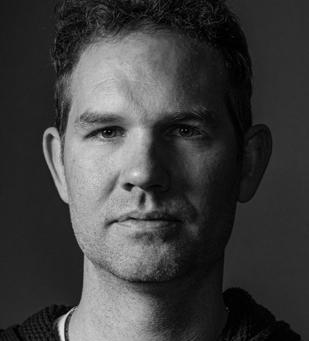
an
interview with
ANDREW MCFADyEN-KETCHUM
by CLIFFORD BROOKS
You do things a little differently. You’re not a professor at a university. Poemoftheweek.com is a totally unique institution. You lived in a tent for two years and wrote a book about it. These poetry parties you throw every year at AWP are becoming legendary. What gives?
The PoBiz is too often about duplication. A journal does something well and here come 500 duplicates. Someone writes a killer poem and all the sudden everyone is writing that poem. PoemoftheWeek.com is the only institution I am aware of that celebrates existing books and provides supplementary content that enhances the experience of the poems and the poet who made them. Since I started POW in 2006, it seems every journal has started something they call PoemoftheWeek, but it’s almost always just a poem they previously published followed by a bio. Really? Please copy me a little better than that, _______ Review.
I quit teaching because universities have lost their way. I don’t want my money connected to all that. And teaching for 50 years and writing a book every 5 years sounds like I’m some cog in a machine rather than really living and poet-ing. isn’t at all appealing. To each their own of course. I lived in a tent because I was tired of paying rent and waking up under a piece of drywall. I’m editing MAKE IT SO: an anthology of TrekPo with Said Shaiye because why not? The AWP parties: Same thing. I want to celebrate poetry and have fun doing it. The Nashville Poetry Party--
The Nashville Poetry Party? What the hell is that?
If SNL, Jimmy Fallon, and a poetry reading had a baby, you’d get the Nashville Poetry Party. It’s going to be at a legendary bar in Nashville once a month March-October. Think booze, house band, dance offs, makeovers, tarot readings, interview, magick, and poetry all wrapped into one. You know: A party! It’s gonna be the tits, as they say.
TrekPo as in...Star Trek Poetry?
Exactly. I’m making fun of PoBiz a little bit. No one’s put together an anthology of TrekPo before that was at all serious. i think there was one full of basically FanPo, which I suppose any poems written about Star Trek have a
9
fan element, but the goal is something more meaningful. It’s cheesy to say but TNG has gotten me through many many bad days. And I’m not alone. I’m genuinely interested to see what we get. The submissions we’ve gotten so far have been shockingly good.
What are you writing these days?
Angry poems.
Angry poems? Maybe it’s obvious but what do you mean by that?
I am pissed. At all of us. Walk around in the world (at AWP or cruising CNN.com or a public school), and there’s just far too much backstabbing and careerism and murder and cancellation based on lies any damn fool can see. How did Ripley put it: “You know, Burke, I don’t know which species is worse. You don’t see them fucking each other over for a goddamn percentage.” We see this fucking over in our families as much as we see it in the culture; I imagine that’s where iot starts. I’ve always sung my mother and father and sister’s praises in my work, but I’m healed from whatever made it impossible for me to see what was really going on in our family, and I’m not happy about it. So that’s what I’m writing: Angry poems about this place we’ve made and seem dead set on squandering. I’m writing mirror image love poems about my children and my wife, their mother, who bring me true joy like nothing before. We’re making something real and beautiful here together. All of us. Karen, me, the dog, the three kids. We’re a team set on living joyfully, and, magically, blessedly, it’s working.
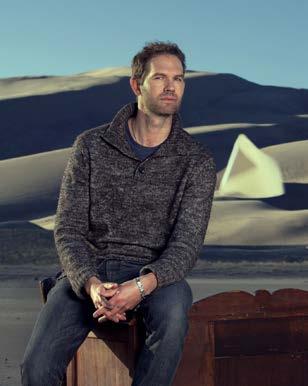
ABOUT andrew:
Andrew McFadyen-Ketchum is an author, producer, editor, & ghostwriter. He is Author of three poetry collections, Fight or Flight, Visiting Hours, & Ghost Gear; Producer and Host of the NashvillePoetryParty; Assistant Director of the Owsley Fork Writer’s Sanctuary; Founder and Editor of PoemoftheWeek.com, The Floodgate Poetry Series, and Apocalypse Now: Poems & Prose from the End of Days; and Acquisitions Editor for Upper Rubber Boot Books. Learn more at AndrewMK.com
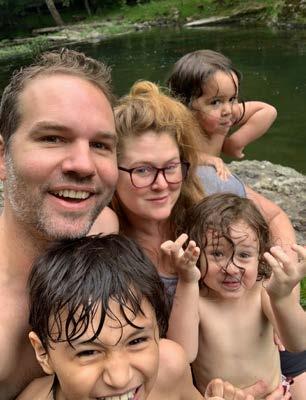

Winner of the 2024 Reed Environmental Writing Award
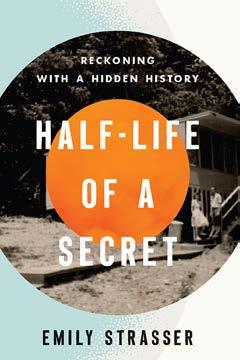

—Kerri Arsenault, Star Tribune “
Finalist for the Minnesota Book Award in the Memoir & Creative Nonfiction category
Strasser’s prose reaches beyond the straits normally reserved for academic presses in which this book was published, and her patience against some of the biggest ethical questions humans face is a thing of great strength. A profound debut of memory, research, and imagination that mines conflicts of heart and intellect.”
A well-researched, poignant journey of discovery, Emily Strasser’s Half-Life of a Secret interrogates and reveals the secrets, stories, and human and emotional cost of the Oak Ridge Nuclear Weapons facility. From Tennessee to Hiroshima, Strasser’s weave of historical fact and the story of her grandfather brings a muchneeded truth and relevancy to a difficult and ever-present topic: the devastating legacy of nuclear weapons and the choices we face to the present day. A must read.” “
—Kristen Iversen, author of Full Body Burden: Growing Up in the Nuclear Shadow of Rocky Flats
—Dan Zak, reporter for The Washington Post and author of Almighty: Courage, Resistance, and Existential Peril in the “
With a detective’s focus, a philosopher’s yearning, and a granddaughter’s devotion, Strasser deftly fuses memoir with biography, lyricism with hard truths, and a hidden history with the forgetful present. This book is intimate and epic, harrowing and healing. It chases the phantoms of America, reveals the contamination of secrecy, and finds grace in a fraught inheritance: hers and the nation’s.”
Nuclear Age

11


Are you, or someone you know on the spectrum?
Do you constantly feel out of place due to Autism? Did a late-in-life diagnosis give you some peace of mind, but leave many more unanswered questions?

Learn coping Techniques Get Inspiration Gain Confidence
Adulting with Autism
Lectures and Mentorship on How to Thrive on the Spectrum
Educated Compassionate Honest
http://teachable.sjv.io/doP5mk
Learn More & Enroll Here
https://teachable.sjv.io/c/3209676/1547114/12646

- About Your Instructor -
Clifford Brooks is founder of the Southern Collective Experience and Editor-in-Chief of The Blue Mountain Review. Aside from his business ventures he is also a poet. To date Clifford has two full-length collections of poetry, The Draw of Broken Eyes & Whirling Metaphysics and Athena Departs: Gospel of a Man Apart, Exiles of Eden is a limited edition chapbook available solely from its author. Over the last twenty years Clifford traversed the traditional route in publishing and learned how to create, sell, and market creative writing. Throughout his tenure as writer and educator, Clifford stands as an advocate for those on the autism spectrum. As board member of Autism Speaks, he is intimately aware of the need for greater community and understanding.
Here on Teachable, Clifford shares his wisdom on living the creative life and adulting with autism.
12 BLUE MOUNTAIN REVIEW APRIL 2024
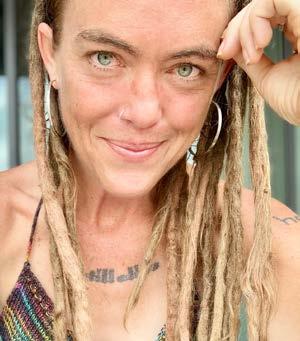
an interview with
Chelsey Clammer
bY CLIFFORD BROOKS
What is your writing process?
My process has changed a lot throughout the years. I’ve been writing “for reals” (with the aim of publication) since 2010 when I first got sober. I basically replaced the drink with the pen and just wrote and wrote. I would write for 8+ hours a day—whether that was first by hand or then typing up the handwriting and editing it. Now, I usually write for 10-20 minutes a day by hand, and spend one or two days a week typing of that writing and editing it. It takes me longer to write essays, but I think the quality of the essays is much better. Additionally, instead of writing for those 8 hours a day, I now spend about 4-6 hours a day knitting. What do I think about when I knit? WRITING. It’s the time when I write first drafts (in my head) or think through an essay. So instead of physically writing down and figuring out an essay, I’m thinking through it while I knit. The result is a longer process, but much more intentional essays. Plus, I spend less time creating 10+ drafts of essays. It usually takes me 2-5 drafts to complete an essay now because I spend so much time thinking through each one while I knit.
How do mental health and writing intersect in your life?
Writing helps my mental health and my past mental struggles give me something to write about. It’s a win–win situation here. That is, I take my past struggles—all that pain and mental anguish I went through—and turn it into a type of art. I’ve been through much trauma in my life. From abusive relationships to a sexual assault and self-harming behaviors. But I now use these experiences as fuel for my writing. From this, and especially during the editing process, I get to view those past challenges in a new way. It’s like I get to digest them differently in my mind and body and although writing is cathartic, it’s the editing that makes the process therapeutic. From this, my mental health is much better because I’m able to view past experiences differently and move forward in my life with a more balanced and understanding perspective.
13
How did you get started writing?
I’ve always journaled, but in 2010, right when I got sober, I decided that I wanted to take my writing seriously. Why mess around with just writing drunk at a bar when I could replace that bar scene with a coffee shop and take myself seriously as a writer. Then, also around that time, I had the opportunity to meet and work with my favorite author—Marya Hornbacher. We became good friends and I actually ended up being her roommate for about a year. During that year, I got to see how an author lived her life—how she dedicated her soul and time to her craft. It was like I was an apprentice of sorts. From Marya, I learned both how to write and how to live in the world as a writer. I just kept at the writing craft and, with Marya’s encouragement, started submitting my essays for publication. I littered the literary world with my essays, and now I probably have over 250 publications and three books.
What movies had a tremendous impact on you and why?
Funny story: I don’t actually watch movies. I don’t even own a TV or have a monitor/screen thingy. I like documentaries, but I can’t even remember any that I saw that really had an impact on me. I live in words, and so zoning out in front of a screen has never been a thing for me. Pulp Fiction was cool, though. And who doesn’t like A League of Their Own?
If you could sit down with three people alive or dead to discuss literature, who would they be and why?
Marya Hornbacher (author, Madness), Melissa Grunow (author, I Don’t Belong Here), and Angela Mackintosh (editor in chief of WOW! Women on Writing). These are three of my favorite authors and women who exist. Marya was my writing inspiration and mentor back in 2009–2010 and she eventually became a dear friend. Melissa was one of my clients whose memoir, Realizing River City, I edited long ago. She also became a dear friend. Angela is technically my boss at WOW, but she is also a dear friend who— get this—I’ve worked with for 8 years and have never met. But these women live literature. They breathe writing and their published works inspire me to be a better

BLUE MOUNTAIN REVIEW APRIL 2024
writer and person. I love talking writing with women who understand how past trauma influences the ways in which we write about our lives—not just the topics but the structures and formats of how we create words on a page. They too consider the reader’s experience of their writing and this approach to creating written works of art completely enthralls me. Plus, I want hangout time with my buddies. Thanks.
What’s your philosophy behind being a good teacher?
Focus on what’s working in a piece and start from there. I like to show my students what they’re doing right in their writing—what’s working, what’s kicking ass, what has potential—so that they see how they are good writers and where they can improve to be even better. I also learned to write through understanding how others edited my work. So, I teach through editing and hardcore critiquing my students’ work. When you understand how someone else is experiencing your writing, you start to see how you can objectively approach it and learn from what you’re doing right. Then keep doing more of that.
What band or musician are you into that more folks need to know about?
Patrice Pike. Hands down. I’ve followed her music since I was 16 (starting back in 1998). Her voice speaks to my soul and her lyrics lift me up. With amazing music to jam out to, her voice just carries each word she’s written to the maximum level of amazingness. She’s a rockstar but also an incredible human being. Caring, compassionate, open, and honest, her music reflects how when we approach life with a sense of love and good, we can create peace and empathetic perspectives in our lives. And she does all of this through the power of her voice and her music.
ABOUT chelsey:
Chelsey Clammer is the award-winning author of the essay collections Human Heartbeat Detected (Red Hen Press, 2022), Circadian (Red Hen Press, 2017), and BodyHome (Hopewell Publications, 2015). Her work has appeared in Salon, The Rumpus, Brevity, and McSweeney’s, among many others. She teaches online writing classes with WOW! Women On Writing and is a freelance editor. www.chelseyclammer.com
15
CHRISTOPHER SWANN
AWARD-WINNING AUTHOR, GEORGIA AUTHOR OF THE YEAR
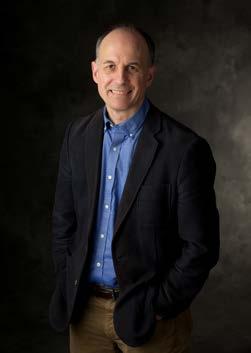

—J. T. Ellison, New York Times bestselling author BOOK 3 AVAILABLE JULY 2023!

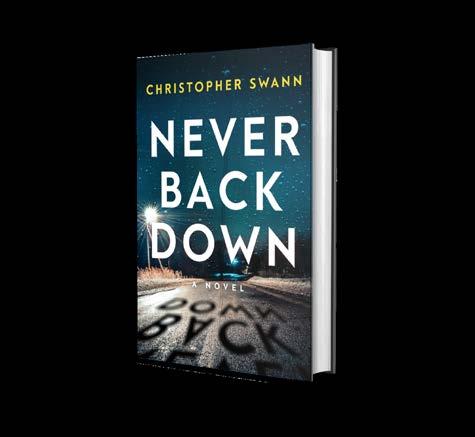
"Christopher Swann never disappoints . . . A must read."

SHE'S A WEAPON FORGED IN THE FIRES OF HER PAST
h o t o b y : S t e v e P e o s i
P
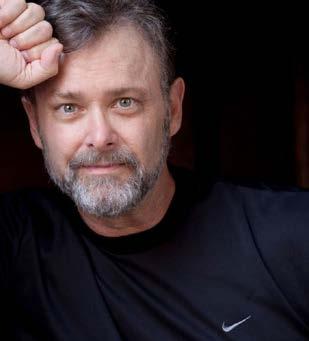
an interview with
CHRISTOPHER MOORE
bY CLIFFORD BROOKS
In RAZZMATAZZ the characters we fell in love with from NOIR return to further their gritty romance in 1940’s. Did you see this story as a series from the start?
No, I hadn’t planned on writing the first one -- I was going to use 1940s San Francisco as the setting for my Midsummer Night’s Dream book, featuring my Shakespearean Fool, Pocket, but my publisher didn’t want another Shakespeare book at the time and I had already done the research, so I wrote Noir instead. I decided to write Razzmatazz because I enjoyed writing the characters so much and we were in the midst of Covid lockdown, so any “on site” research was out of the question, so I went for something that didn’t require travel and in-person contact.
What research did you do to create believable characters from this Casablanca-style era?
I don’t know how believable they are, at least in their diction, but I tried to portray characters who were dealing with the societal churning of post-World War II: a traumatized vet, the cab driver, an African American man who migrated from the South to work in the shipyards, a couple of Wendy the Welders, women who worked at highly skilled industrial jobs during the war but afterward were expected to return to being housewives, 2nd generation Chinese Americans who worked in the nightclubs of Chinatown, portraying Anglo entertainers, lesbians in the drag king trade who were dealing with the police crackdown on cross-dressers, and a fellow who was not able to serve because of an injury and was ashamed because of it.
I also explored a previous generation of Chinese characters who immigrated at the turn of the century and were involved in gang society and sex slavery-- most of their stories are told in flashbacks.
Squid King Tang is a favorite of mine in RAZZMATAZZ. What drew you to choose an opium den as a location of interest? How did you come up with the name “Squid King Tang”? is there an example of his personality in your reality?
The opium den comes from the real circumstances of Chinatown around the turn of the century -- and some of the opium trade remained during WW2. Chinese workers around that time put in incredibly long, hard hours at hard labor, and
17
sometimes their only relief was an opium den. There’s a famous map of Chinatown from the 1880s showing that every third door was a whorehouse and every 4th door an opium den. (This map was used to enact the Chinese Exclusion Act of 1882 which basically outlawed being Chinese and wasn’t repealed until the 1940s),
All these served the mostly male population of Chinese workers. This is when the “jook houses” were established as well -- restaurants that served great steaming bowls of rice porridge, so a hungry worker could come in and bolt down the maximum number of calories in the shortest amount of time. “Tall House of Snake and Noodle” in the book is based on one of these, and such a place was still running in the 1940s, described in one of Herb Caen’s books (which is where I got it). Squid Kid Tang is the natural legacy of the Tongs of the late 1800s, one of the grandsons, like Eddie (Moo Shoes) Shu. I made up the name based on Raymond Shrimp Boy Chow, who is a contemporary Chinatown gangster who was in the news a lot a few years ago. I think he’s serving life in prison for murder.
Tell us about Jimmy Vasco.
Jimmy Vasco is based on a real woman, Tommy Vasu, who ran a drag king joint called Tommy’s Joint a few doors down from Mona’s 440, on Broadway. She appeared much as I describe Jimmy and was constantly harassed by police under the “Three Articles” law, where it was unlawful for a woman to dress in men’s clothing unless she was wearing three articles of men’s clothing. This is a part of San Francisco history I don’t think many people are familiar with, but which was raging during the 1940s and 50s. I thought it would make a great plot to have someone start murdering the drag kings. (Women entertainers who performed as men.)
I often see you as a working-class Puck spinning yarns about working class folks who hide a sly genius. What do NOIR and RAZZMATAZZ say about your opinion of society today?
Well, I think the working-class mug getting dragged into intrigue and danger is a noir convention, so that’s where it starts. If you’re like me, a guy with little formal education who has made it in a field that usually requires some education, you must believe that cleverness is not taught, but applied. I think my characters often portray that belief.
ABOUT CHRISTOPHER:


BLUE MOUNTAIN REVIEW APRIL 2024
Christopher Moore is the author of eighteen previous novels, including Razzmatazz, Shakespeare for Squirrels, Noir, Secondhand Souls, Sacré Bleu, Fool, and Lamb. He lives in San Francisco, California.

an interview with
HEATHER HARTLEY
bY CLIFFORD BROOKS
You’ve spent the majority of your adult life abroad, principally in Paris, with four years in Napoli. What is it like to be an English-language writer surrounded by languages other than English? How do French and Italian impact your writing?
It’s invigorating! Both languages have been an integral part of my life for decades now and I feel really lucky about that. Speaking French and Italian connects me to other words, to other worlds.
Both languages are present on a daily basis in some form for me—in conversation, reading, listening to the radio. In my prose and poetry, there are often bits of French and Italian stitched into the texts. Both languages appear in my two poetry collections Knock Knock and Adult Swim and also in a current prose project that I discuss later in the interview. Having lived abroad for over twenty-five years and having these languages consistently in my aural and visual space, this filtering through to the page feels natural to me. French and Italian are two of my acoustic muses.
I started learning French when I was nineteen and followed an academic route, studying it as an undergrad and getting a Masters in it. I had the ardent, late-teen idealistic notion that I would be able to read all of Charles Baudelaire’s Flowers of Evil in French within a year. That is—read it and understand everything. Get all the vocabulary and nuance. I’m still learning about Baudelaire’s work decades later.
In contrast, I learned Italian off the cuff in my early thirties when I met my partner. (He’s Neapolitan and speaks great English.) I didn’t speak a word of Italian when we met. I didn’t have any lofty ambitions with it, I just wanted to be able to communicate with my partner’s family in Napoli and with his friends (who don’t speak much English and no French), and beyond that to be able to carry on even the simplest conversation with my partner in his native language.
In some ways, I chose French and Italian chose me. I can’t imagine my life without them.
What is still hard in both languages: conjugating subjunctive mood verbs. I guess I could try to be less emotive in French and Italian to avoid the tricky conjugations, but for me these two Romance languages—underscore the word romance—can call forth emotion and passion and I don’t want to miss out on what French and Italian have to offer.
19
You’ve taught creative writing and literature for many years at universities and in other educational programs. How does teaching interact and intersect with your writing?
I love teaching. I’ve been in the classroom for over twenty years and have had the privilege to work with students ranging in age from 15 to 75 in creative writing and literature classes. It is a joy to be in the classroom and I gather a lot of inspiration from teaching.
For me, teaching inevitably intersects with my writing as students inspire me to see a piece of writing from a new and refreshing viewpoint—theirs. Or we’re studying a text and someone has this fantastic thought about it that I hadn’t considered before. Or a student will share perceptive insights into another student’s work. It’s these exchanges in the classroom that are electric and dynamic and energizing that can fuel my writing. I learn so much from students and through their honesty and vitality, their willingness and openness to engage with words, to explore form, to analyze texts—all of this this can filter into my writing.
What is the dynamic between poetry and prose in your writing? What is the dialogue like between the two?
For me, a strong narrative is key whether it’s poetry or prose. A writer friend shared with me the fantastic advice to follow the thread of the story wherever it may lead, whether poetry or prose—or some form in between the two. For me, there’s an energy and synergy between poetry and prose. In the best sense, my prose often feeds my poetry and vice versa. This is not always the case but the dynamic can be very present. I started off writing poetry in high school and over the years moved into prose, both fiction and some nonfiction. Sometimes I find that the lines can be blurred between poetry and prose—in different ways than prose poetry which I love and write on occasion—and that it is in this liminal space that interesting and surprising things can happen.
Virginia Woolf wrote, “Yes, it is true, poetry is delicious; the best prose is that which is most full of poetry.” This is what I strive to do. For me, inherent in Woolf’s thought is the idea of lyricism. I find her work so lyrical and I try to keep lyricism at the forefront of my thoughts when writing. Not just sound, but the combination of words themselves, even the look of paragraphs or stanzas on the page as typography can also be an important part of the writing.
There’s
a long, storied tradition in Paris of writers writing in cafés. Do you partake of this historical precedent and if so, what is it like?
I do! I go to cafés more for research and reading, but also to write sometimes. I love that for 2 euros 50 centimes for an espresso you can sit all afternoon in a café. It’s staying focused that can sometimes be the trick because it can happen that I get caught up in the movida of the café. When it gets too hard to concentrate, sometimes I order a double espresso to focus better on the work at hand. (A coffee confession—one of about a zillion that I could make—I get a double espresso not just for focus but to savor a bit longer the people watching that inevitably can take place in a Parisian café.) And whether writing or watching—and I’m very lucky to be doing either in a café in Paris—I’m in such good company—everyone from Simone de Beauvoir and Jean-Paul Sartre to Ernest Hemingway to James Baldwin to Anaïs Nin to André Breton to Oscar Wilde to Elsa Triolet to Richard Wright and not to be forgotten Sir Mick Jagger—the list could go on and on. All of these heroines and heroes and caffeine too? Quel luxe!
Some of your poems are humorous. What role does humor play in your writing? Does it spill out into your prose as well?
I think that a sense of humor can be important in writing. Not that everything you write has to be laugh out loud hilarious, but a subtle sense of humor can be an integral part of certain narratives, whether poetry or prose, and can really enrich them. Not all of them, of course, but there can be places where an unexpected touch of humor in an image or turn of phrase could be added in the text to reveal an unexpected and refreshing perspective. I incorporated bits of humor into both of my poetry collections, Knock Knock and Adult Swim and humor is included as part of my current prose project. Aristotle said—among the myriad of things that Aristotle said—“Humor is the only test of gravity.” Sometimes a serious
20 BLUE MOUNTAIN REVIEW APRIL 2024
subject can call for and can call forth levity. Humor can add another level of depth and of lightness at the same time to the writing at hand.
What is on the horizon for you as a writer? How do we find you and your publications and keep up with you online?
My novel-in-progress is about a contemporary American woman and a Neapolitan man—both turning forty—who navigate Paris where they live and Napoli where they visit his family, and how they are derailed by both unexpected trauma and daily drama, working through cancer, language barriers—and large slices of chocolate Caprese cake. Their story intersects with a story of troubled love set in 1943, in the throes of the Allies’ arrival in Napoli, between a young Neapolitan woman and a young American private in the Allied army.
I’m also delighted to say that I’ve been working on a third poetry collection and have been culling poems—free verse, fixed form and prose poetry.
You can find me online at www.heatherhartleyink.com, on Facebook at Heather Hartley, and on Instagram at @heatherhartleyink.
Thanks so much for this interview and as they say in Paris, merci beaucoup and in Napoli, grazie mille!
ABOUT heather:
Heather Hartley is the author of the poetry collections Adult Swim and Knock Knock, both from Carnegie Mellon University Press, and was the long-time Paris editor at Tin House magazine. Her short fiction, essays and poems have appeared in or on PBS Newshour, The Guardian, The Literary Review, and other venues and she was recently interviewed for “Dante’s Old South Radio Show.” She moderated author events at Shakespeare and Company Bookshop in Paris for many years and has taught creative writing at the American University of Paris and the University of Texas El Paso MFA Online program. She teaches creative writing in the Masters program on the Paris campus of the University of Kent (Great Britain) in their Paris School of Arts and Culture. For more information please visit http://www.heatherhartleyink.com
21
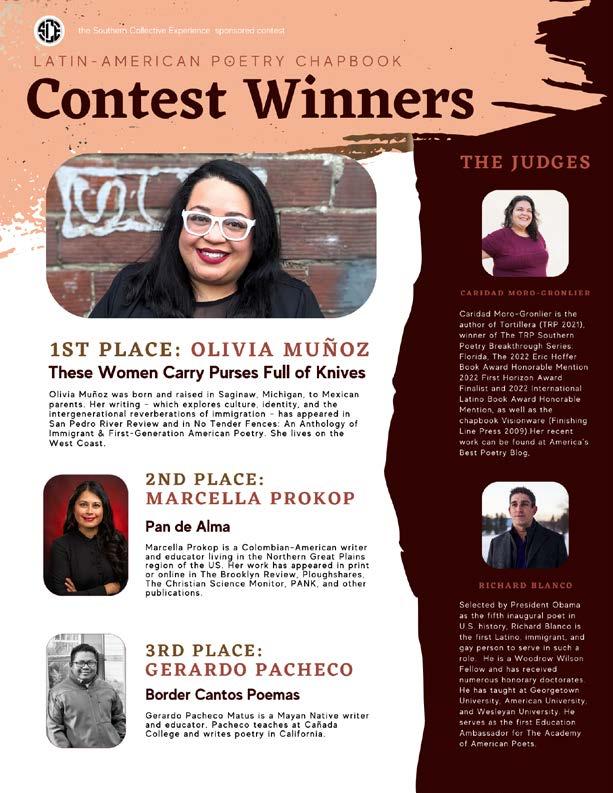
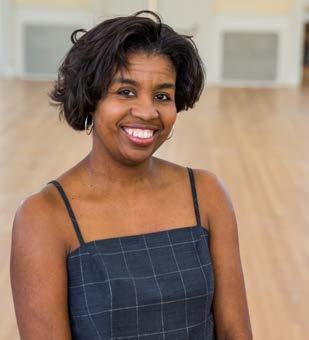
an interview with
JANUARY gill O’NEIL
bY CLIFFORD BROOKS
What makes January O’Neil happy?
My kids. My love. Heathy and happy friends and family. Work that sustains me. And poetry. Not sure if I believe in happiness as much as I believe in joy.
At my center is joy, and I can’t access it without acknowledging pain. I make a daily effort to stay open to possibility, looking at the world with fresh eyes. It’s not easy, given how divided we are as a country. More and more I look to nature to show me the way: a vast ocean; the new buds on my silver maple; a big, red cardinal under the bird feeder on a cold day. Poetry becomes my solace, my guiding light, offering comfort and perspective when life feels uncertain and overwhelming.
How does music play into your creative life?
We need poetry like we need air and water. I constantly remind myself of this. There are those moments when only poetry will suffice (maybe a good song comes close). I want to dive into language and sound and silence. And breath. What does poetry teach us about the ordinary, everyday moments? What can poetry teach me about me? That’s what poetry and music gives me: a chance to break through suffering and transform it into joy. Poetry gives us a way to get closer to who we are.
How does place and culture work into your writing?
In 2019, I was awarded a fellowship at the University of Mississippi, serving as the John and Renée Grisham Writer in Residence for an academic year. My teenagers and I moved to Oxford, Mississippi with a new puppy and no idea what we were getting into. During our time there, my daughter and I attended the re-dedication of the Emmett Till River Site Memorial Marker at Graball Landing. Standing by the murky waters of the Tallahatchie River, where Till’s bloated body
23
was found, sparked my deep dive into researching his story. I visited historic sites and engaged with individuals who possessed firsthand knowledge of the events of 1955.
To my surprise, amidst the red earth and the sprawling fields, I discovered a profound connection to my own identity—the trauma in the land and its history, symbolized by every untamed daffodil blooming, likely once tended by an enslaved person.
It took me months to write the poems that are the backbone of Glitter Road. I needed time to process, imagine, and ultimately share my experiences in my writing.
Tell us about your new book and why you love it.
Glitter Road is a poetry collection about self-discovery and transformation. This book intertwines my personal journey with the enduring legacy of Emmett Till against the backdrop of the Deep South. Against the weight of history, these poems are a celebration of wonder and joy woven throughout. My story is an American one that revels in the beauty and complexities of life. I invite everyone to join me on this journey that celebrates what connects us all. Glitter Road is my most personal, vulnerable work yet and I am over-themoon excited to share it with poetry-lovers everywhere.
How do you approach editing your work?
Revision is the flip side of writing. It’s a necessary evil. I don’t enjoy revision, but it is the place where I can go deeper into the work and make it sing. On a practical note, I approach all revision with gratitude as in, “Thank goodness I made it through this moment on the page. I’m ready to let it go and turn it into something more.” It’s a good reminder that I am working in service to the poem.
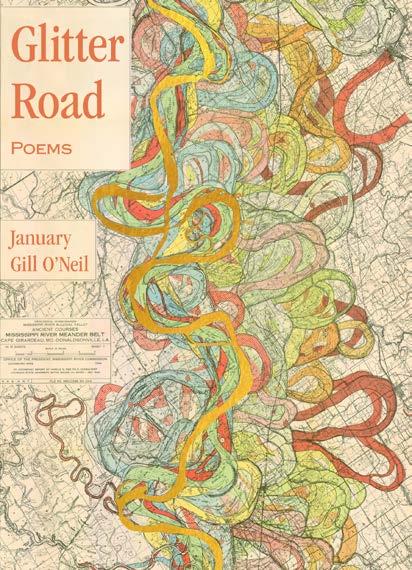
BLUE MOUNTAIN REVIEW APRIL 2024
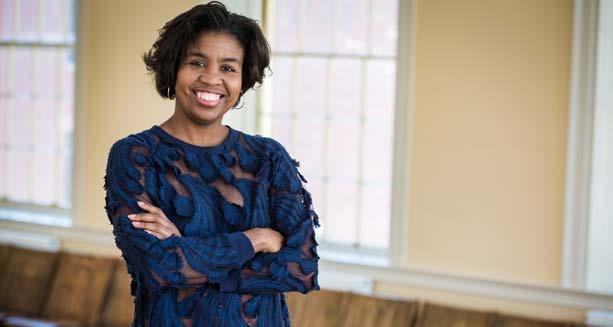
What is your definition of success?
My hope is that I’ll always be able to write poetry that resonates deeply with readers. I want to foster connection, community, and empathy. As an arts administrator, I want to make sure we make spaces for underrepresented groups to be active in the poetry community, not just page and stage, but behind the scenes. It’s not enough to write and perform, but we need the next generation of organizers, publishers, grant administrators, award panelists, and book critics to go beyond our current efforts and broaden the opportunities in the literary landscape. Because if we don’t tell our stories, no one else will. among others. Her poem, “At the Rededication of the Emmett Till Memorial,” was a co-winner of the 2022
ABOUT January:
January Gill O’Neil is an associate professor at Salem State University and the author of Glitter Road (February 2024), Rewilding (2018), Misery Islands (2014), and Underlife (2009), all published by CavanKerry Press. From 2012-2018, she served as the executive director of the Massachusetts Poetry Festival. Her poems and articles have appeared in The New York Times Magazine, the Academy of American Poets’ Poem-A-Day series, American Poetry Review, Poetry, and Sierra magazine, among others. Her poem, “At the Rededication of the Emmett Till Memorial,” was a cowinner of the 2022 Allen Ginsberg Poetry award from the Poetry Center at Passaic County Community College. The recipient of fellowships from the Massachusetts Cultural Council, Cave Canem, and the Barbara Deming Memorial Fund, O’Neil was the 2019-2020 John and Renée Grisham Writerin-Residence at the University of Mississippi, Oxford. She currently serves as the 2022-2024 board chair of the Association of Writers and Writing Programs (AWP).
25
GLITTER ROAD
BY JANUARY gill O’NEIL
I’ll take my miracles however they appear these days—a salamander poking its head above the bricks; the shocking blue overcoat of the season’s first bluebird; a spider web unbroken. At the corner of Molly Barr and McElroy I saw a thick trail of glitter in the curve of the right turn lane. Fuchsia. Heavy shimmer refracting the noonday sun
as if laying flat a rainbow’s extracted hue. Not paint, or blood, or a parade shedding its cheer. It’s the faded streak of eye shadow as it trails into flecks, then disappears.
I think of cars passing through this moment— their undercarriages aglow with possibility.
Hard not to feel good riding a glistening wave, my tires now bespeckled with a purple sheen that’s tough to rid or wash away, the road ahead made beautiful by this temporary shine.
26 BLUE MOUNTAIN REVIEW APRIL 2024
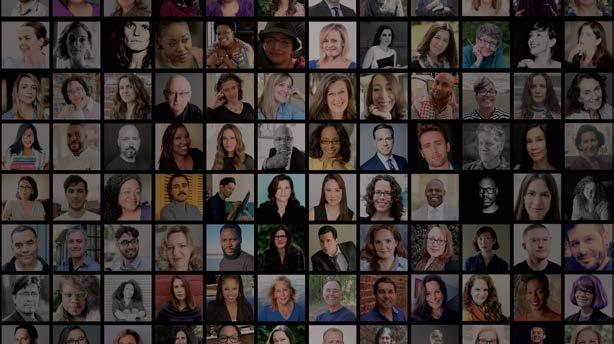
Storytellers Unite
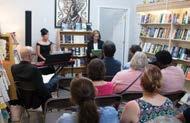
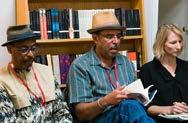





Join Our Creative Community
“ 1455 exists to connect communities, instigate discourse, and celebrate storytelling in its myriad forms. All our free programming is dedicated to this mission, and we remain proud that our work serves as a viable showcase for the type of talent and empathy on display throughout all our programs.”
Sean Murphy Executive Director, 1455

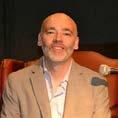
Storytelling
and literature. It holds events throughout the
27
1455 is a nonprofit organization seeking to advance the appreciation of
programs
expression, education,
to
ages
and passion for storytelling through
that support
and the sharing of writing
year dedicated
supporting writers of all
and skill levels. A Place for
@1455litarts 1455litarts.org Learn more at
Writers • Artists • Musicians • Performers 1455litarts.org

2024 Programming
Poetry Workshops
With Bob Bensen - 10 week session meets online
Seeing Things : Session 1: March 18 - May 20. Session 2: fall 10 weeks TBD
With Georgia Popov - 6 week session meets online
Session 1: The World Beyond Haiku - Examining Japanese Form June 17-July 22
Session 2: Is this a Poem? Prose poetry in All its Possibilities: July 29-Sept 9. No class on Labor Day
Children’s Workshops
with Bertha Rogers
Winter: February 19 - 23: Winter Birds & Mammals
Spring: April 1 - 5: Minks & Weasels & Fishers
Summer I: June 24 - 28: The Magic of Catskill Rocks & Mountains
Summer II: July 22 - 26: Octopuses & Squids & their Friends
Summer III: August 12 - 16: Stars and Clouds and Winds
Art Shows
May the 4th b/u May 4 - May 25
Stagecoach Run June 1 - July 7
Haiku Conversation August 17- September 14
Platters, plates, plants, prey, psychics, primitives September 21- October 19
Word Thursday
Poetry reading series
Every 2nd and 4th Thursday February thru November 7pm EST Facebook Live & in person https://www.facebook.com/brighthp/
Email: info@brighthillpress.org www.brighthillpress.org. 94 Church Street. Treadwell, NY 13846
28 BLUE MOUNTAIN REVIEW APRIL 2024
info@brighthillpress.com info@brighthillpress.com info@brighthillpress.com
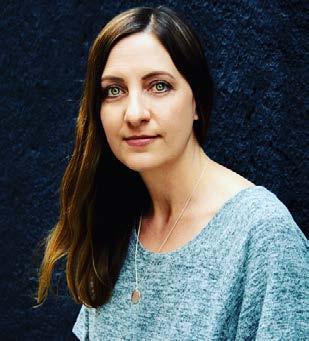
an interview with
LAURA MCHUGH
bY JENNIFER GRAVLEY
How do you feel about being labeled Rural Noir?
It does not bother me at all because that is what I’m writing--dark, rural stories--but I think sometimes people equate that with these really low-class people. To me it’s small-town people in these rural areas without a lot of opportunities, like the places I grew up. It doesn’t bother me for my books to be called that because I’m proud to be writing that kind of thing.
Your books exquisitely straddle the line between commercial thrillers and literary fiction. Do you find any value in differentiating “genre” fiction and “literary” fiction?
I feel like people do tend to think of something other than what I do when they say “literary fiction,” but if people read a crime novel and it’s really well written, they’ll be like, “Oh, it transcends the genre,” but really a lot of those books are really well written. They’re literary quality.
What about thrillers keeps you exploring and writing in that genre?
I’ve always been interested in crime, especially small-town crime, rural crime, crime where I live in the Midwest and the Ozarks. In real life we’re scared of the things that happen to us, especially women, possibly because we are the victims of so many crimes. We see all this crime around us, and it’s helpful in a way to think through. Why would someone do this, and how did they become this kind of person? It’s deeply psychological. You can get resolution, and I like that. My mom recently asked me if I knew that my great-grandma used to listen to these crime shows on the radio, so she’s like maybe that’s where you got it.
29
Your new novel, out this month, Safe and Sound, explores the agency of rural women in spite of the limitations imposed upon them. What message do you hope readers take away?
When I was writing this, I was thinking about how people complain about what’s going on in Missouri and ask, why don’t you just move? They just don’t get that a lot of people can’t do that if your family has lived in this small town for generations, and your roots are there, and you don’t know anyone anywhere else or how to get anywhere else. It takes a lot for a person to be break free, but I just wanted to create these characters showing that. Sometimes if you’re bright and doing well, people don’t want you to break out and succeed.
How does the structure of two timelines and narrators help you showcase the resilience and tenacity of these women?
With Grace, you really think, wow, she’s really going to get out. She’s going to be the first one to do it because she had that intelligence and that determination. But with the other girls, well, they’re not going college. They don’t know what they’re doing, and they just have their mom and their aunt, the strip club and the meat-packing plant, as examples, so it’s very hard for them to be able to imagine this future. But I wanted to have them seeing an example from their cousin, how she almost made it. It makes them want to make it, but they also don’t want to leave her behind. They want to find out what happened to her, that family bond.
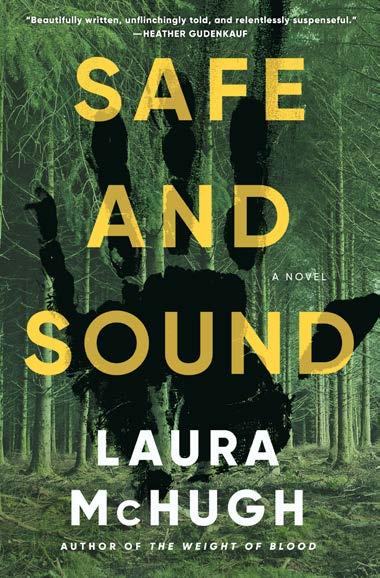
30 BLUE MOUNTAIN REVIEW APRIL 2024
Your writing explores what it means to be part of a family. How do your own experiences influence your inquiries into the stickiness of blood ties?
Because I was the youngest of eight kids, I find family dynamics fascinating, both mine and observing other people’s. I really like to explore that because sometimes it’s very complicated and you might love someone who’s terrible, does terrible things, and they might treat you terribly but they love you. Sometimes when it comes down to it, that love is there.
How do you balance having a full-time job, teenagers, and your writing?
Not well. [Laughs.] Since I started working full time, I’m trying to figure out what time of day I can fit the writing in, and I just have to do it. And I want to do it. I try mornings, I try lunchtime, I try after work, I try at night, whatever works. Any time I can fit it in, I’m fitting it in because with my kids, if they need help with homework, I’m going to do that. It’s a balancing act every single day. Because nobody cares if I get this book done, I have to care. I fail all the time, and I just keep trying.
ABOUT LAURA:
Laura McHugh is the award-winning, internationallybestselling author of novels The Weight of Blood, Arrowood, The Wolf Wants In, What’s Done in Darkness, and Safe and Sound The Weight of Blood won the International Thriller Writers Award and the Silver Falchion Award for Best First Novel and the Missouri Author Award for Fiction. Her most recent release, What’s Done in Darkness, won the Missouri Literary Award, was named a Best Book of the Year by the St. Louis Post-Dispatch and Self Magazine, and was Harlan Coben’s pick for best summer thriller on the Today Show. McHugh’s work has also been nominated for an Alex Award, a Barry Award, a GoodReads Choice Award, and a Pushcart Prize. McHugh lives in Columbia, Missouri with her daughters.
31

wildhoneytees.com
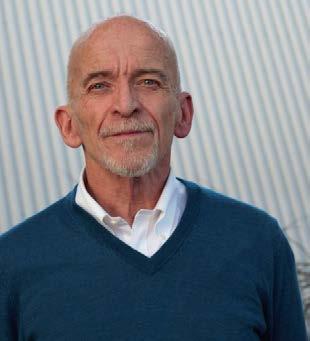
an interview with
MARK DOTY
bY LYNNE KEMEN
Mark, thanks for agreeing to talk with me. You and I had an earlier conversation about how location affects your writing. I know that you have recently moved. Can you describe your previous and new locations?
I’m glad to. I lived in a one-bedroom apartment in New York, on West Sixteenth Street for twenty-one years, the longest time in my life I’ve ever lived in one place, though for years I wasn’t in the city year-round. I taught at the University of Houston one semester a year for part of that time, and for some years, I spent springs and summers in Provincetown, then later in The Springs, out near the eastern tip of Long Island. From 2019 until 2023, I stayed in Manhattan year-round, and then I did a radical thing: I marshaled every resource I had and bought a farmhouse on 13 acres up in the Hudson River Valley, quite a ways up, right between the Hudson and the Berkshires.
What prompted you to make this change?
There are probably reasons I don’t understand yet. I can tell you the ones I’m conscious of. When I moved to New York City, I liked its energy, and enjoyed being lifted 0ut of myself into th0se teeming crowds. Whitman got it right; to be a part of the streaming life of humanity is to be a bit less bounded in your 0wn skin, not so firmly anchored, part of a continuity. But repeated experience of the crowd can become abrasive – noise, inconvenience, the sense of individual diminishment.
I lived in my apartment during the pandemic lockdown, taught my classes online, and when I walked my dog we’d 0ften pass a temporary morgue set up in a big truck just off Seventh Avenue. I used to feel that the city elevated and magnified the human. There’s an old poem in which I said “the principal beauty of New York is in human faces.” But I began to feel that the city increasingly devalued the human.
ABOUT mark
33
When did you start writing, and where were you at the time?
In high school in Tucson, Arizona. I was a bookish gay kid from an isolated and troubled family, and the dreamy interiority of the poets I loved felt like an untouchable refuge. I stumbled on Blake, Garcia Lorca, e.e. cummings, distillations of feeling that had so much life in them. I went to a big suburban high school, but if you found your way downstairs, there was a surprisingly good climate for poetry. Our brilliant drama teacher loved poetic language, and I played Estragon in Waiting for Godot. And we had a creative writing class – a serious rarity in public schools in the 60’s. We were an early beneficiary of the Poets in the Schools program, and both Ruth Stone and Charles Simic visited our class.
I’d read Simic’s early poems and loved them, so I was excited when my teacher asked me to read him one of my poems. I was 16; he was maybe 10 years older and looked directly at me through round wire-rim glasses. I read one of my little neo-Surrealist poems to him, and then he said, in his Slavic accent, the likes of which I’d never heard, “Read me another one.” Nothing could have been better than that! And one of my friends and classmates was Brenda Hillman, a remarkable poet even then. I can’t leave the subject of high school behind without adding that I was briefly suspended from school for distributing copies of Ho Chi Minh’s poems, an action I’m proud of to this day, though probably no one but me remembers it!
Mark, thank you for taking the time to speak with me today.
Thank you for getting me thinking about these questions, Lynne!
Mark Doty is the author of nine books of poetry, including Deep Lane (2015), Fire to Fire: New and Selected Poems, which won the 2008 National Book Award, and My Alexandra, winner of the LA Times Book Prize, the National Book Critics Circle Award, and the T.S. Eliot Prize in the UK. He is also the author of three memoirs including the New York Times bestselling book Dog Years, and a book about craft and criticism, The Art of Description: World into Word.
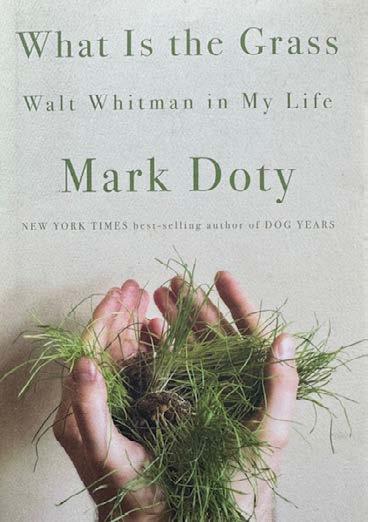
BLUE MOUNTAIN REVIEW APRIL 2024
about Mark:
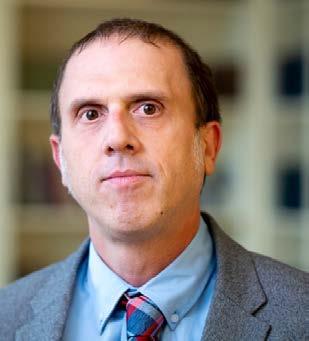
an interview with
Michael b. Tager
bY Nicole Tallman
What does your writing life look like? Do you have a particular schedule, habits, or process?
Currently my life is too busy with “life” for writing. Which is a bummer, yes, but it’s also the nature of living. My goal with writing was never to make a living, so while it’s way more than a hobby, the way my world is currently designed, I have to put writing on a shelf and come back to it later. Which I will, because I’ve done it before.
Right after I graduated college, I looked at the half dozen short stories in various stages of completion and hated them all. Not because they were especially bad, but because they were so boring. I realized I didn’t have anything to say because I hadn’t done anything interesting, and I didn’t have any mature, interesting opinions. I very consciously decided to not write for roughly a decade. I figured that those ten years would either build some material or determine if maybe I really wasn’t cut out to be a writer! And then, lo and behold, about ten years later I started writing again, with a ton of thoughts and points of view.
I’m pretty sure that when my life sorts out again, writing will be there waiting for me with a big hug. When that happens, I imagine I’ll slide right back into the schedule and habits from when I was actively writing. Which is to say, I believe in habits and perspiration, so I set aside a couple days a week and build a few hours into those particular days for writing and writing HAS to happen on those days.
At the same time, I always have a rule that when inspiration strikes, if it’s at all possible, I have to stop what I’m doing and write until enough of a draft is formed that it won’t disappear when I walk away, which happens with inspiration ignored. Then I can get back to it during my normally-scheduled perspiration. For me, it’s like a 70/30 split. Or maybe 30/70. It depends.
How do poems come to you? Do you have any specific muses?
Poems come to me like daydreams. When my mind is wandering and I’m thinking of other things or showering or when I’m in a meeting and some jabroni is jabbering on and on about God knows what. That’s when I’m like, “I wish Matsuno was still making video games” and waxing on and on about him. Then I’ll write a couple lines because I’m not going to write a story about him (though I have used video games or songs to spark fiction).
As a rule, my poetry is entirely from inspiration and muses. When I set out to write poetry, by and large it ain’t happening. I
35
tried to write the K-Pop poems for the better part of six months and failed miserably. It wasn’t until my kid got into the solar system and I thought about how pretty Europa was and sounded that the pieces clicked as it were.
The good news is that I have a million muses ‘cause I love books and movies and music and video games and there’s a lot of that out in the world.
Your debut full-length book, PopCulturePoetry:TheDefinitiveCollection, is out now.
Congratulations! Tell us what led you to choose pop culture as a title and topic for this book.
The title is because I’m not very clever and my poetry is not subtle so why bother trying for subtlety and cleverness when the form and function don’t meet in the middle? Call a spade a spade and call a book of pop culture poems, of which a few old chapbooks exist, what it is: which is the title.
Why I chose it as a topic is a different question with a better answer, I think! I am pretty good at communicating now, but I wasn’t always good at communicating and, like many dudes of a certain age, I didn’t know how to relate to people except through pop culture. I remember that I asked a lot of people “What concerts have you attended?” not because I cared, but because I hoped they had seen a band I had seen so I could have something in which I felt confident to discuss!
In other words, I’m versed (as we all are) in how we use pop culture to make relationships and how it forms part of our sense of self.
Saying “Oh, I’m a Carrie/Samantha/ whatever” became an entire shorthand for describing yourself and that’s just the Sex and the City version of that game. If we’re so versed in pop culture that we use it as shorthand to tell people about ourselves and use it as a guideline in friendmaking and romance, using it to tell emotional truths in poetry seems pretty linear. Not that I chose it consciously or even actively chose it at all. It was a linear progression. Though at one point my friend Amanda McCormick told me to stop taking the piss out of poet voice and to stop apologizing/explaining them when performing them. She told me to own it or not own it, and I chose the former. Thanks, Amanda!
Who is your favorite Golden Girl and why?
This is the most important question that has ever been asked of me and I am going to answer it way, way more deeply than I need to.
My favorite when I was a kid, and the show was airing, and my parents sometimes let me watch was Rose. She’s the one who appears sweetest on the surface, with the most obvious jokes. In other words, as an eight-year-old, I got her. When I was in college and watching, Sophia became my favorite. Her nihilism is her charm, and her charm is her nihilism. She’s still pound for pound the
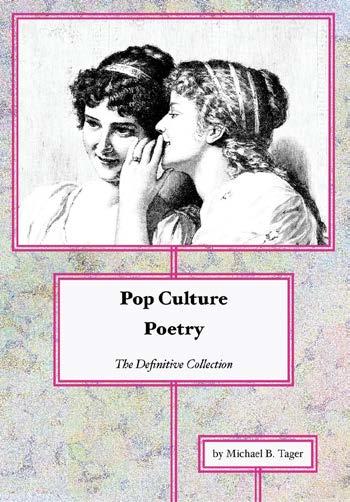
BLUE MOUNTAIN REVIEW APRIL 2024
funniest. At some point, I stanned Dorothy, ‘cause she’s the everywoman, but honestly, that didn’t last very long.
Now? It’s 100% Blanche, for any number of reasons. Partially the sex positivity, but mostly it’s because she’s the kindest of the girls. It’s her house, for one, and she has welcomed them inside! And whenever any of them has a problem, she’s the first to comfort them and ask what can be done. (Rachel is my favorite Friend, for very similar reasons). She’s the secret heart of the show and I love her forever.
What
role do humor and nostalgia play in your poetry?
As a writer, I try to avoid writing nostalgic because I hate nostalgia and try to avoid it at all costs. It’s what makes me most sad in the world. I know some people love it and maybe what nostalgia means to me isn’t what it means to most people, but I don’t enjoy the sad-happy feeling. I don’t feel the happy part of it, I just feel the sad.
When I’m writing poems, I don’t try to write—to the best of my knowledge—about past feelings or how I used to feel about a person or medium. Some of the pop within the book is dated because I’m dated. Patrick Swayze and Whoopi aren’t relevant anymore, but they’re still relevant to me. I love them even more than I used to, if anything!
As for humor, the short version is that the very first poem in the book, about Jan Brady, is being very honest. I’m never joking, even if I’m trying to be funny. For whatever reason, people have always interpreted my earnestness as joking. Maybe it’s because I’m blunt and will answer just about any question I’m asked, and honesty can be disarming? Whatever. I’ve leaned into that over the years because making people smile is pleasant. So, my whole “thing” is being kind of funny but deathly serious. Which is the book, also.
In addition to writing, you are also a freelance publicist and editor. Tell us more about the work you do in those capacities.
Over the pandemic, a couple people asked me to help them with their book tours because I used to be an events planner and I used to run a reading series. I did so and made some phone calls/emails, pretending to be my friends’ publicist. Each time it worked like a charm and after the fourth or fifth time I did it I was like, “well, maybe I can be a publicist?” so I made an announcement on Twitter—before I abandoned the site—and a week later I had three clients. Now my partner and I have eight active poets (and two prose writers) on our roster. We do a lot of tour planning, pitching to conferences and festivals, crafting mass emails, making publication plans and the like.
What are you reading right now, and what writers (living or dead) most inspire you?
I’m reading nothing! Like, literally nothing. I haven’t read a book that isn’t A) a children’s book or B) one I haven’t published, in two years. When my kids are a bit older, I imagine I’ll go back to it. I’d be shocked if I didn’t! That being said, my wife and I have the first book in the Witcher series to read as a mini book club. A friend also lent me a collection of Wonder Woman comics. I told him it might take me six months to give it back and I made no promises that I’d read it, only that I’d try.
As for inspiration, Roger Ebert is probably my favorite writer and the one to who I turn whenever I want to read something brilliant and insightful and think about art in a different way. Homeboy won a Pulitzer for a category that (checks notes) wasn’t and isn’t up for a Pulitzer.
A few others: Alison Bechdel, David Foster Wallace, Shirley Jackson, David Brin, Charlie Kaufman, Toni Morrison, Yasumi Matsuno, Oscar Wilde, Chris Claremont, Maya Angelou. Also, whoever writes the Old Spice commercials.
What are you working on next? Any preview you can give us regarding themes, form, or subject matter?
I’m working on nothing, and it is liberating! Again, my life is too full of other stuff to make writing a priority. I kind of have a movie script on the backburner with a friend. I wrote an outline and then she wrote a couple pages and then my life blew up and then her life blew up and it’s six months later. I think I’m going to get to it soon. Pretty sure.
37
What does a perfect day look and feel like to you?
Late October-early November. It’s not too cold nor too hot, but just perfect for a light jacket. The days are getting shorter which means there’s more nighttime, which means I get more done and feel better about myself. But there’s not so much night that everyone hibernates, because I hate being a bear, and so many people get sad during the winter that I get sad in solidarity. It’s the time of the year that feels like a prelude to a big nap and that’s the best time in the world, right before the nap.
How do we keep up with you online?
Website: www.Michaelbtager.com
Instagram/Twitter/Bluesky: @iamragesparkle
Tour dates: www.michaelbtager.com/2024-events/
Michael B. Tager is star dust, masquerading as the author of Pop Culture Poetry: The Definitive Collection. He is also the Managing Editor of Mason Jar Press. His favorite color is cheerful nihilism.
38 BLUE MOUNTAIN REVIEW APRIL 2024
ABOUT MICHAEL:
Requiem for the Only Idol I’ve Ever Truly, Deeply,
BY MICHAEL B. TAGER
Jan Brady gets me
She’s the OG Gen X (you want latchkeys? I got twenty)
Benign neglect is a helluva drug not even a sonar blip looked at, but never seen pleading for love without the vocabulary of vulnerability
Marcia
Marcia
Marcia
I always say I’m being funny but I’m never joking It’s how I disguise truth cause I don’t know how to lie Jan didn’t know either Jan only shot straight both barrels to the heart primetime soul-baring
Marcia
Marcia
Marcia
We’re not saying what you think we’re saying That word does not mean what you think
We’re all middle children
We don’t always have the language to expose our breastbones so
Here’s Jan’s Rosetta Stone
Please see me
Please hear me
Please love me
Marcia
Marcia
Marcia
Loved
39
[As published in Pop Culture Poetry: The Definitive Collection (akinoga press)].
“The poems in Disease of Kings are as sophisticated as they are innovative, the myriad voices and perspectives unsettling us with their hard-earned intimacy.”
—Adrian Matejka, author of Somebody Else Sold the World
“A harrowing dive into late-empire America”
—Patrick Phillips, author of Elegy for a Broken Machine
A vivid chronicle of friendship and loneliness amid the precarity of life in late capitalism, when every day is a fight for survival.
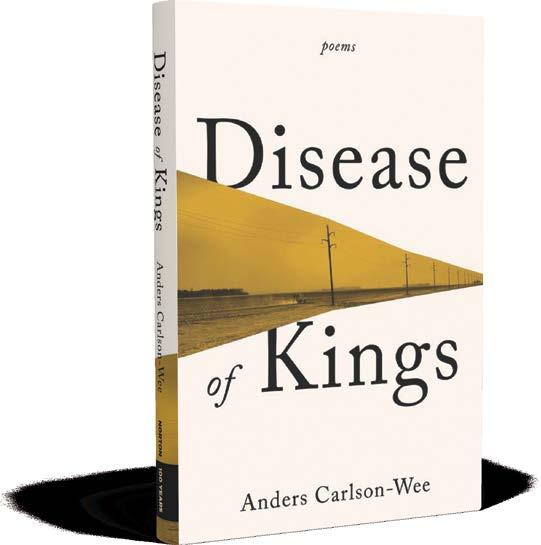
40 BLUE MOUNTAIN REVIEW APRIL 2024
AvA il A ble Now
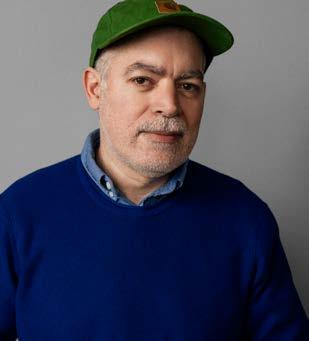
How did you begin writing poetry?
an interview with
NATHAN SPOON
bY CLIFFORD BROOKS
I began haphazardly at age seventeen after finding a blank notebook in the attic that belonged to my dad. I took it down to my room without asking and started writing in it. Because I had difficulty translating my thoughts into writing, I went loosely off the left margin in fragmented language that was ungrammatical and in handwriting difficult to read. After making a short entry of a few sentences on the first page, I thought it looked like a poem, so I turned the page and tried again.
What motivates you in your writing and when traveling to speak and give readings?
I’m motivated by the need to experience and express softness, kindness, generosity, tenderness, and joy, as well as curiosity and wonder.
I also look for ways to build community and to create opportunities and that support and nurture the creative expressiveness of other neurodivergent people. Encouragement is at the heart of this. Anybody who writes experiences rejection, but neurodivergent people experience exponentially more rejection. Most neurotypical people are unaware of the crushing scale of rejection those of us who are neurodivergent experience. Our poetry is not exponentially less valid than poetry by neurotypical people, only less familiar. It’s important to keep hope by recognizing that the real reasons for our exclusion are systemic and completely unrelated to the worth of ourselves and of our poems. It is possible for people within the systems excluding us to begin seeing our self-evident worth and to change those systems in ways that will better include us.
TEll us about your poetry collection due out in September?
The collection is called The Importance of Being Feeble-Minded and will be published by Nine Mile Books in the Propel Disability Poetry Series. It contains one hundred (mostly sonnet-length) poems. I’m ADHD, autistic, dyslexic, and have written expression disorder—so the poems are implicitly expressive of these—while explicitly the poems explore nature and human nature. Protecting and uplifting the heart in a world that can be deeply and systemically cynical is central to my poems and I think has been from the beginning. Systems are necessary, but they also take on lives of their own that
41
inform our decisions and that, as the philosopher Jürgen Habermas observes, colonize lifeworld. Poetry is one of many things that allows us to reclaim our connection to lifeworld—to the universe of what is self-evident to us. We are alive, inhabiting a shared world. It seems to me to be the strangest kind of miracle. We have endless potential for kindness, generosity, tenderness, and love.
Who are some of your favorite poets?
I adore Eugenio Montale. His poems can at first seem incomprehensible (if mystifying) until you realize he is talking around his meaning. While I can only read his poems in translation, they are still stunning. I also love the poetry of Naomi Shihab Nye, Carl Phillips, and Sandeep Parmar. All for different reasons—although they are each working to strengthen interiority, to celebrate and restore connection.
What is the most unusual thing you have done as a poet?
I once spent an entire year writing only haiku. People in the U.S. mostly understand a haiku to be a very short, very random, very silly poem, when in fact this form of poetry is a spiritual path and way of life. While haiku are very short, they are not random or silly. A haiku is a season poem written in seventeen syllables and balanced on a pause, with the pause typically occurring after the first five syllables. This last aspect I think is what elicits the most misunderstanding. Around the pause are two tiny bits of language that Clark Strand has described as being like two stones. For example, if I say “wrapped around my toe / like the skin of an onion—” it’s incomplete. And if I say “a wet autumn leaf” it’s incomplete. But if I put these together, that is a haiku. I learned a lot about connecting bits of language as a way of making poems that is still integral to my writing even though I rarely write haiku these days.
Do you have any advice for other neurodivergent poets?
Keeping in mind how difficult things can be while living in a world not built for us, try to believe in your poetry. Look for other neurodivergent poets you like and for ways you can connect and work with them. If possible, try to also create opportunities for other

BLUE MOUNTAIN REVIEW APRIL 2024
neurodivergent poets. Although you will likely face wildly disproportionate rejection and exclusion, please know this is not a reflection of your writing so much as it is a result of lack of understanding from within the profession of poetry.
What
has helped you the most as poet who learned independently and without peers or mentors?
In the early nineties, I called the operator to get through to poets I admired. Nobody was able to talk with me, with one exception: Naomi Shihab Nye. As we exchanged letters, postcards and handmade gifts by mail, Naomi told me about poets she thought I might like, such as Hayden Carruth and W.S. Merwin. At one point I wrote Carruth and heard back, although he was too old for continued correspondence. Having one person out there who cared about what I was doing and who believed in my poems was enough to keep me going.
With a new book on the way, what are you working on now?
I’m currently moving poems in and out of a collection tentatively called The Civilized World. Thinking about a new collection simultaneous to finalizing the current book has me going in so many new directions. I think poetry is like gardening. When something runs its course, you pull up the dying remnants and begin planting a new thing. For me this means countless hours reading, doing what looks like nothing, and walking at the park. I spend nearly all my writing time not writing.
Nathan Spoon is an autistic poet with learning disabilities. The author of The Importance of Being Feeble-Minded (forthcoming from Nine Mile Books), his poems and essays have appeared in the Academy of American Poets’ Poem-aDay, American Poetry Review, Bennington Review, Gulf Coast, Poetry, The Southern Review, and swamp pink, as well as the anthologies The American Sonnet: An Anthology of Poems and Essays, How to Love the World: Poems of Gratitude and Hope, Mid/South Sonnets: A Belle Point Press Anthology, and The Wonder of Small Things: Poems of Peace and Renewal. He is editor of Queerly. about nathan:
43
The Redheaded Stepchild only accepts poems that have been rejected by other magazines. We publish biannually, and we accept submissions in the months of August and February only. We do not accept previously published work. We are open to a wide variety of poetry and hold no allegiance to any particular style or school.
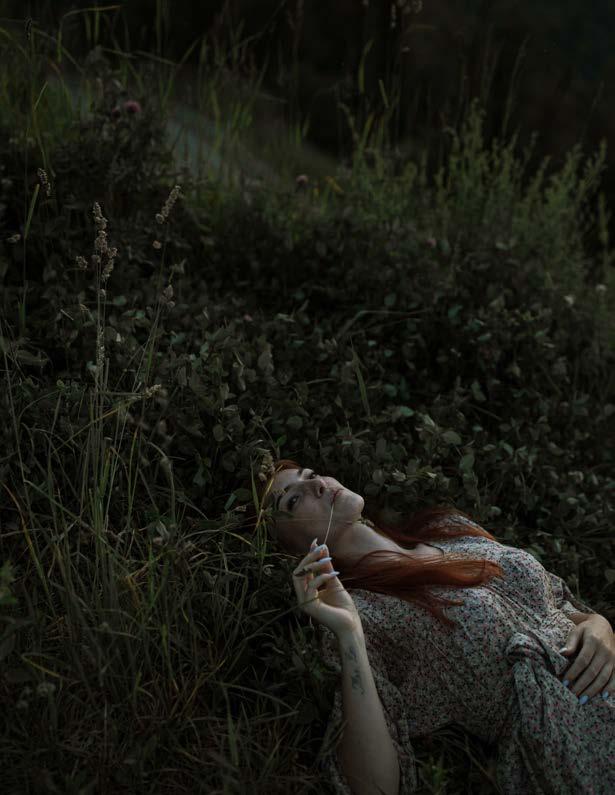
visit www.redheadedmag.com for more information & submissions
redheaded
a home for rejected poems
the
stepchild
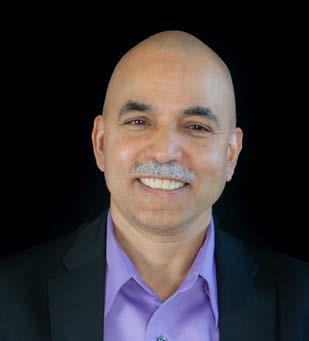
an interview with
Reverend Seifu Anil Singh-Molares
bY Carmen ACEVEDO BUTCHER
How do your own spiritual practices and experiences influence your leadership at Spiritual Directors International (SDI)?
About a decade ago, I decided to no longer take on jobs, duties, or responsibilities that were not fully consonant with my vows as a Zen Buddhist priest to benefit all sentient beings to the best of my ability. My daily meditation practice has sustained me for over four decades. This practice, a lifetime of immersion with spiritual exploration, and my wonderfully enriching, invigorating practice as a spiritual companion allow me to align (and as is often needed, realign) with the Universe, facilitating my flow, and my ability to process challenges of all kinds, and to help others process theirs. Hopefully, all of this allows me to speak from a place of balance, equanimity, and serenity as I companion the SDI community.
My spiritual companion practice is really where the rubber meets the road for me. It allows me to practice my calling, something that brings me more joy and satisfaction than just about anything else. I have a multi-spiritual background. I was raised Catholic, to a Hindu father, but with Buddhism as my central grounding. That said, none of that is really central to my role as a spiritual companion. What is most important in that context is the orientation of the people I companion, and what their particular, very broadly ranging needs are.
What role does spirituality play in a world where most established religions have dwindling numbers due to numerous scandals and corruption, and where the fastest growing demographic is one of spiritual independents who don’t identify with any particular religious tradition at all? Given these new dynamics, what is the role of spiritual companions?
Spirituality has never been more relevant and important, regardless of how you name it. A strong mystical undercurrent pervades all major religions and what I call “spiritual orientations,” and that unites us all at our roots. The need for ultimate meaning is even more necessary when times are difficult, as now. We all want, and long, to understand our
45
deepest purpose, and to figure out responses to the age-old metaphysical questions: “Why am I here?” “Where did I come from?” “Where am I going?” “How can I lead a good life?” “How can I heal myself of fear and trauma?” and so on. While every being has unique answers to these, we all share certain things, including a Unity beyond each of us as individuals. Healthy spirituality ultimately grounds us in powerful experiences, rather than concepts, and these experiences give us meaning far beyond what we call our “selves.”
The role of spiritual companions is to create a supportive, non-judgmental environment where the people we accompany can overcome obstacles and reach for true freedom of spirit, for liberation. To do that, we companions need to be fluent in multiple modalities, good translators and interpreters, deep listeners, responsive when we are asked to be, fluid, nurturing and accessible, among other attributes. There is great joy and Love with a capital “L” in all of this, including a deep mutuality between us all, where we are able to find the heart in all things.
As SDI promotes the modality of spiritual companionship—deep listening, contemplative immersion, spiritual exploration, and growing discernment— these help us honestly lean into and process the impediments to our spiritual growth, engaging with considerable trauma of all kinds, rather than turning away. All of us seek ultimate meaning and purpose, beyond the roles we play in our daily lives, and especially so when we are confronted by so many markers of loss, impermanence, and injustice. Spiritual companionship brings us close to the heart of the Great Matter of ultimate meaning.
Do you have advice for readers on how to navigate these times of world-wide suffering and climate crisis?
If at all possible, don’t react without digging deeper. We may be missing background and context, and we should avoid reacting. That doesn’t mean we shouldn’t act, just that we need to give ourselves the time and the opportunity
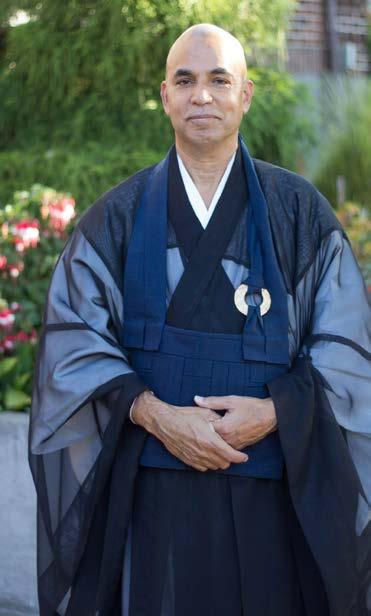
BLUE MOUNTAIN REVIEW APRIL 2024
to process and truly understand. Contemplative practices of all kinds allow for pulling back, avoiding reactivity, and truly pondering. Equally important, they facilitate spiritual discernment: “How does this challenge align with my spiritual values? What is mine to do? And what isn’t?” They spark those sorts of questions. Spiritual companion relationships are vital in this context. In fact, if we look at the history of religions, we find spiritual leaders who were almost constantly accompanied by others. There are very good reasons for that.
About climate crisis, I’m always pointing out that what we call “climate crisis” is really our crisis! The climate itself will adjust, realign, and move forward, but quite possibly without us. We created the conditions, and we’ll suffer the consequences of our own actions, and inactions. It’s a distinction worth remembering.
What are you working on now that you would like to share with us, what events does SDI have coming up, and how do we keep up with you and SDI online?
At SDI, we are constantly expanding and refining our offerings on spiritual direction and companionship and responding to the needs of our increasingly diverse community. We offer many different types of webinars and courses, and have four publications, ranging from Listen to Presence, our peer-reviewed academic journal. We also have our own publishing wing, SDI Press. Additionally, we offer journeys and pilgrimages. Our next yearly conference is online in May 2024, and then a hybrid one in Niagara Falls in May 2025. We provide a directory of spiritual companions that helps anyone looking for spiritual assistance to find the right individual to accompany them. More info about these and other offerings are found on our website, www.sdicompanions.org and on our YouTube Channel, www.youtube.com/@sdiworld.
I’m also completing my first book, a recounting of spiritual explorations and the role of spiritual companionship, which will come out soon. You can find out more about me at www.anilsm.org, or check out my LinkedIn profile at https://www. linkedin.com/in/rev-seifu-anil-singh-molares-7a06b5/.
about Rev. SeiFu:
Rev. SeiFu Anil Singh-Molares is the Executive Director of Spiritual Directors International (SDI), a motivational speaker, a Zen priest and spiritual companion/guide/director, and a global executive manager. Whether leading Microsoft’s International Strategic Partner Program as Sr Director for twelve years, starting and/or running three non-profits— the Preeclampsia Foundation, the Compassionate Action Network and the SDI, organizing major international conferences, helping promising inventors value and sell their patents, co-founding a management consulting and international services firm, or advising individuals and groups how to implement meaningful and lasting spiritual changes, Rev. SeiFu knows how to transform big ideas into practical realities.
47



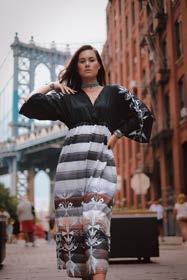

48 “My work is about bringing to light the women ancestors whose strength flows through us all” klookinghorse.com info@brighthillpress.com
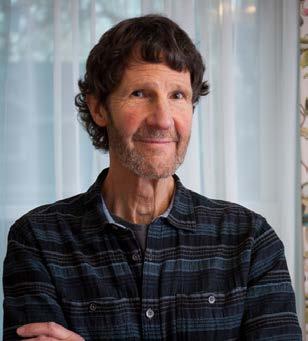
How
do you write? Do you have a process or routine
an interview with
ROBERT PETRILLO
bY clifford brooks
that
you follow?
The short answer is no. Which is not to say I haven’t tried different approaches to firing up the creative neurons. For me, particular techniques and schedules seem forced and arbitrary. I know various methods work for different folks; everybody’s mojo runs on a unique blend of fuel.
What seems to be effective for me is just keeping alert. Allowing impressions to enter my consciousness, mentally footnoting them, and letting them roam about untethered to other thoughts. Usually if something leaves a strong enough impression, it will show up again in conjunction with some other idea or feeling, either during a conversation, or in some random inner dialogue I tend to have a lot of, or – when I’m fortunate to remember them – in my dreams.
What about writing in forms, like a sonnet or pantoum, for instance? Is that creative process any different from composing in free verse?
The initial part of the writing process is pretty much the same for me, no matter the form the final product takes. It’s like I said above – an insight or powerful impression followed by a period of gestation that eventually (hopefully) manifests in an almost physical need to express the feeling/idea in writing.
When I do sit down to write, the first line is usually already there. And often I’ve already decided if it’ll be in form or free. So much depends upon the flow of words. (Iambic pentameter there, and if I like it, can feel it, I’ll just let the flow keep going; that will determine the form. In this case, likely either blank verse or a sonnet.)
If I go with a sonnet, for instance, I will need to consider consciously shaping the line for meter and for the eventual end rhyme (unless I want a more unrestrained “contemporary” sonnet). As one might assume, it takes a bit more work to recreate in structured lines the idea that’s floating cloudlike up there in your head (or heart?). But as the esteemed psychiatrist and author Iain McGilchrist so astutely points out, the very constraints of form paradoxically allow some writers to relax and thereby find “the best words in the best order,” as Coleridge said. How exactly that works is beyond my pay grade to explain, but I’m glad to cash the check.
I will say, however, that when I decide on a sonnet, my main concern is the sense of the lines, saying what I want a
49
reader to comprehend in plain English. The meter is often unconscious and simply flows, as do sounds like assonance, consonance, and such. I try not to think consciously about those elements at all; when the flow is moving, I ride it. Athletes call it the zone, the unconsciously easy state of just letting things happen. Of course, one does need to reexamine these things in the revision process.
A lot of your poems have musical themes or motifs. How important is music in your work?
Yeah, music has been a force in stirring my emotions for as far back as I recall. I remember being in sixth grade and getting my first 45 rpm record at the local Woolworth’s Five and Dime store. It was The Tokens’ The Lion Sleeps Tonight. And I can only attempt to impart the flavors of all that musical inspiration. I’m not sure if I succeed, but I can listen to an artist or a particular song and get all jazzed up and want to write something that captures that vibe. If I could write one poem that was as good as a Leonard Cohen song, I’d be content.
Do you have any particular influences on your writing, other than music, that stand out?
Yes, I’d have to say that having been an English major and then a teacher and spending a lot of time with classic poetry (and prose) has whetted my mind to think in certain ways. One can’t spend a lot of time reading Shakespeare or Milton or Robert Frost and not come away with an internalized metronome that beats out iambic pentameter like breathing.
I early discovered the joys of Edna Millay and her deliciously wicked sensibility. She took the sonnet form and made it modern to my way of thinking, full of desire and frank carnality, teasing and baiting and recriminating at times, like a contemporary Taylor Swift.
Among today’s voices, I particularly like Kim Addonizio, Ellen Bass, George Bilgere, and of course Billy Collins. Mostly I read what comes my way, poets in my daily inbox, friends’ recommendations, writers suggested for classes or workshops, random magazine/journal offerings.
What’s been the hardest part of the process of getting your first book of poems together?
So far, the difficulties have been deciding on a sequence. I have an arc in mind, so in a way that part is easy, but there’s the issue of pacing, the mix of long narratives and shorter lyrical pieces. I worry there might seem to be a redundancy in some areas. Also, I’m not gonna equivocate, I get nervous thinking about whether some of my stuff is as good as it should be. Or maybe you’ve got that one in there you really like but that’s a bit snarky. Both my parents are long gone, so I don’t have to worry about upsetting them, at least.
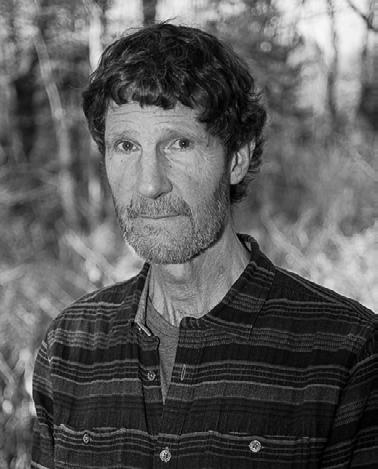
BLUE MOUNTAIN REVIEW APRIL 2024
Fortunately, I’ve had the good fortune of working with a brilliant editor/mentor who trusts my instincts but who knows when to suggest a variation.
How do you tackle poems about painful topics?
Head on. I rarely know where I’ll end up when I start, but I almost always know where I wanna go. So I start with that in mind and let the route choose itself. I can usually tell a dead end or a wrong turn, so I’ll just back out and try another way. But always the heart of the thing, the emotional vibe, is there to begin with, whether it’s a friend’s death or the end of a relationship, or surviving cancer.
Has writing this book changed the way you see yourself?
In essence, no. I still feel the same way as I can recall in all the stages of my life. Each day I simply become more of who I always have been. That said, these past ten years have been a very conscious endeavor to create a more lasting body of work to summarize some of my experiences and thoughts along the way, a kind of project, if you will. So that feels good.
How does exercise factor into your creative process?
That’s always a good thing, whether I create something or not. But I can’t honestly say I’ve noticed a correlation, one way or another.
about Robert:
Robert Petrillo is a retired English teacher who’s on the editing team for the OLLI arts and literature journal at the University of Southern Maine, where he also facilitates a poetry workshop. He’s been published in several literary journals, as well as in the anthology A Dangerous New World: Maine Voices on the Climate Crisis. His first book, What Passes For a Life, is forthcoming from SCE Press. He lives in Westbrook, Maine.
51





FARM-TO-TABLE Elevated Dining Y o u r G l u t e n - F r e e D e s t i n a t i o n R e s t a u r a n t 1 3 5 E m i l y L a n e B r a s s t o w n , N C 2 8 9 0 2 828.516.1672 thecrownbrasstown.com

T h e U n i v e r s i t y o f G e o r g i a ’ s l o w - r e s i d e n c y M a s t e r o f F i n e
A r t s i n N a r r a t i v e M e d i a c a n h e l p f u l f i l l y o u r d r e a m s . B a s e d
i n t h e G r a d y C o l l e g e o f J o u r n a l i s m a n d M a s s
C o m m u n i c a t i o n , t h e t w o - y e a r p r o g r a m o f f e r s a t e r m i n a l
d e g r e e .
S t u d e n t s s p e n d a w e e k i n A t h e n s f o r a s e r i e s o f i n t e n s i v e
w r i t i n g w o r k s h o p s f o l l o w e d b y o n e - o n - o n e i n s t r u c t i o n t h e
r e s t o f t h e s e m e s t e r . T h e m e n t o r s a r e a c c l a i m e d a u t h o r s
a n d e d i t o r s w h o r e p r e s e n t d i v e r s e e x p e r i e n c e s a n d
b a c k g r o u n d s . M a n y o f o u r g r a d u a t e s h a v e

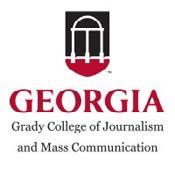
p u b l i s h e d
u c c e s s f u l b o o k s a n d n a t i o n a l m a g a z i n e s t o r i e s . T h e l o w - r e s i d e n c y M F A p r o g r a m w a s l o v i n g l y l a u n c h e d b y
h e l a t e V a l e r i e B o y d a n d p r o v i d e s s t u d e n t s w i t h t h e n u r t u r i n g c o m m u n i t y t h a t e v e r y w r i t e r c r a v e s . JOIN THE PROGRAM 120 HOOPER STREET ATHENS, GA 30602 7 0 6 - 5 4 2 - 1 7 0 4 C L I C K H E R E T O L E A R N M O R E https://grady.uga.edu/academics/low-residency-master-of-fine-arts-in-narrative-media-writing/
s
t
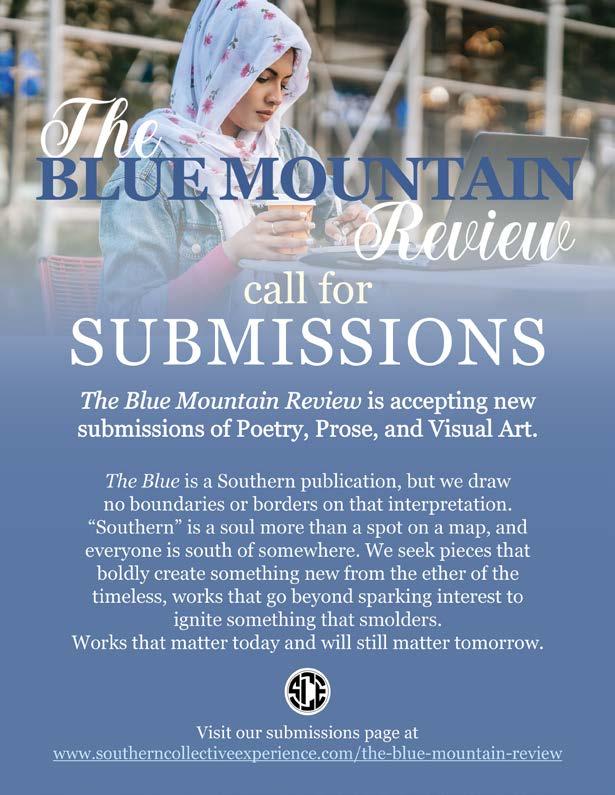
https://www.southerncollectiveexperience.com/the-blue-mountain-review/
MUSIC INTERVIEWS

MUSIC INTERVIEWS

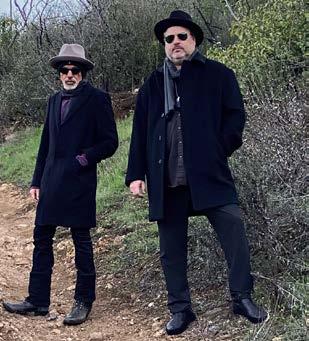
How did you get started as a band?
an interview with
BILLY BOB “BUD” THORNTON & J.D. ANDREW OF THE BOXMASTERS
bY CLAYTON JONES
Well, let’s see here. I was working on my fourth solo album and we’d already recorded the whole thing, but I had some overdubs to do and my engineer got a wonderful job working for a sports network where he was going to get all kinds of benefits and things. And I asked a friend of mine if she knew anybody that had an engineering degree so she suggested JD and he came over and we worked together on this solo record, which was called A Beautiful Door
During the process we started kind of goofing around together on some things—started talking about the British invasion and hillbilly music and all kinds of stuff. And as it turns out, one night I said to JD, “Hey, won’t you play guitar and we’ll start working on some something.” We did originally a song for a TV show, a Hank Williams song, but we thought it had kind of a thing to it. So after that we got into this British invasion discussion and we ended up recording a kind of weird hillbilly version of “Yesterday’s Gone” by Chad and Jeremy. So that was really the first kind of official Boxmasters’ song. And then we did two records with Mike Butler, who was a guitar player. Three, if you count the Christmas record.
What’s in a name? Why the Boxmasters?
Well, the Boxmasters, since we’re influenced so much by the 60s, wanted the 60s sounding name. And you had The Box Tops, The McCoys, The Kinks, the this and that. And so if you take “box” from The Box Tops and you take “master” from RCA Victor Records, which you know his master’s voice, you got Boxmasters. But there’s also another story, which is in the South, when I was growing up a boxmaster is what you called a playboy, so you can pick the one that you think is the real answer, to tell the truth on TV show.
What about individually? Did you come from a musical family?
JD: I’d say, yes: I came from a musical family. My family was always singing. My dad was learning guitar. My mom played piano. I went to a school that was extremely music oriented. Almost two-thirds of the school was in the choir and so it was a big deal. My music teacher was also the head of the local state stage hands union, and so he would pull us in to help unloading trucks at concerts at the local arena. And I loved all that. I loved just setting up a sound system for the junior high dances and that’s kind of how I got the bug of wanting to do stuff in the studio—once I figured out what a studio was.
57

Yeah, I mean everything was music from the time as far back as I can remember; that and baseball. Shoot. I can’t even think of anything else that was important. Music and baseball. And I think yours isn’t too far different there, Bud.
Bud: Yeah, mine is music and baseball. My mom listened to records all the time when I was a kid once we got a record player. Before that, it was an old radio, and so I listened to a lot of what my mom listened to. My uncle, her brother, was a country guitar player who played a Telecaster upside down left-handed. You know, like you’re Jimi Hendrix, and I ended up eventually when I was a teenager playing drums on weekends at VFW clubs with his band.
You know, they played a lot of like Hank Williams and Jim Reeves and things like Webb Pierce. I saw the Ed Sullivan show and saw The Beatles and that was it. I grew up in a band since I was nine or ten.You know, little kid bands and then grown up bands as a teenager and opened for a lot of people at festivals and concerts. From the time I wassixteen I ended up being a roadie for about three years and came to California to play music. Then I started doing somedemos in Nashville in the 90s and ended up getting a record deal in ‘99 or 2000. I made four solo records and then after that it was all The Boxmasters starting in 2007.
Which of your songs defines your style and why?
One of the things about our style is that it’s constantly evolving. So there was the early stuff that was the combination of British invasion, hillbilly psycho, concept stuff, you know? Very thought out and stylized. Then we had our Americana period kind of in the early 10s to the 20s—the second-half of the 2000s. So anyway, like 2015, you know when we had some stuff in that era like Providence. Those were a little bit more Americana, a little more rootsy. Then as we kept going, things got more 60s influenced or sounding. You know, we’re really trying to sound like a band that was recording records in the 60s. And then as we went we recorded a record with Geoff Emerick, which had its own sound. And then it’s kind of like we always sound like this record. What’s the defining quality of this record that we’re working on? You can kind of pick out different songs from different eras that are definitive for that sound, but I can’t nail down exactly what this song encapsulates in everything we’ve done in seventeen years.
58

Do you feel like you’re an inspirational kind of writer? Or is it more of a discipline?
Way more inspirational. We generally don’t just sit down together and say, “Hey, let’s write a song.” I mean, that’s happened a few times over the years, but we’ve been writing songs together for eighteen years and they’ve almost always been from some kind of inspiration. The disciplined part of it comes when you have an idea. You’re watching Perry Mason, and you really don’t want to sit down and do it at that moment, but once we get started, we go very quickly. Most of the songs, which I think a lot of people say this, that come out the quickest are usually the best ones. Yeah, you know, I mean, once you start constructing them. We wouldn’t make it in Nashville. We can’t. We’re not good with writing appointments. We’re not good with any kind of appointments.
What
floats your boat, man? What makes a good story? What is it that strikes you? Can you pinpoint what inspires?
Well, I mean, we’re so influenced by the people we loved growing up; your inspirations sneak into your music all the time. I mean, it just happens. So you know we’re influenced by The Beatles and The Birds and The Kinks and Big Star and The Beach Boys, all these kind of people; the later 60s and early 70s like Cream and Traffic and Deep Purple and people like that. So we’ll throw a heavy guitar or two in there every now and then. But you know, really one of our things is lyrically our songs are usually pretty heavy, or at least they’re kind of (I mean, not blowing our horn, but I mean) they’re there. They’re usually not just “Baby, take me to the malt shop,” and that kind of thing. But our music is usually pretty rockpoppy. You know what I mean? So you may hear a song and if you don’t listen to the lyrics you might think it’s just about sunshine and lollipops.
But then if you ever read the lyrics, it’s usually not. So we like that idea of the juxtaposition of heavier, more meaningful lyrics with a song that sounds like a pop song, you know? That’s what we just kind of do naturally. It’s not by design necessarily and it’s not that we haven’t written a few songs that were, “Hey, baby, let’s go to the malt shop and I’ll buy you some sunshine and lollipops.” I mean, we’ve done a few of those, but not as a rule. So we’re just guys who grew up loving The Beatles. And you know we kind of play that way and sing that way to the best of our ability. Songwriting actually has come fairly naturally for us because we’d both been doing it way before this band. We hit a streak where we’ll write a dozen songs in a couple of weeks and then we’ll hit a streak where we don’t do anything for two or three months.
59
JD: That’s not normal. I mean, as long as if Billy’s sitting in one spot for more than thirty seconds, he’ll have a song at least started. I just came up with the term today. It’s called OCD. Obsessive Creative Disorder. So that’s kind of how I’m going to describe Billy from now on.
Bud, I remember something that I was talking to somebody about the other day. You had some connections in Georgia, didn’t you? with the Athens dudes from the 90s?
Oh, yeah. Yeah, back in the 80s, my manager was Phil Walden, who was the head of Capricorn Records and all that. So he was my manager and through him I met Colonel Bruce Hampton and Vic Chestnut and the guys in Widespread Panic. The first thing I ever directed was a documentary, Live at the Georgia Theater, there in Athens on Widespread Panic. Bruce was in it too, actually.
Did Colonel Bruce ever guess your birthday?
Right off the bat. Immediately in Athens, on the street, we’re going into a restaurant and he told me I was a Leo before we even got off the sidewalk. He was something else. I don’t think I ever saw him get too far off of somebody’s astrological sign.
I wondered how that Georgia connection came through. And you know, man, obviously I knew about you first through the movies, but it’s clear to me now where your heart is and always has been. You’re a musician. I mean, first and foremost, it seems to me that the other stuff just kind of happened.
Yeah, you know, it did just kind of happen. I mean, I grew up in bands. That’s all I’ve ever did and. I did that and played baseball. That’s about it, and I came out [to L.A.] just to play music and then some guy said, “Hey, why don’t you go over
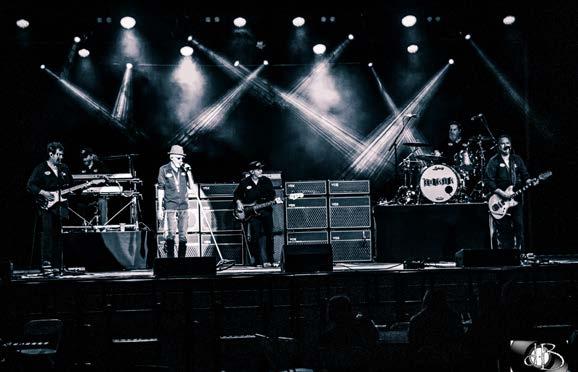
BLUE MOUNTAIN REVIEW APRIL 2024
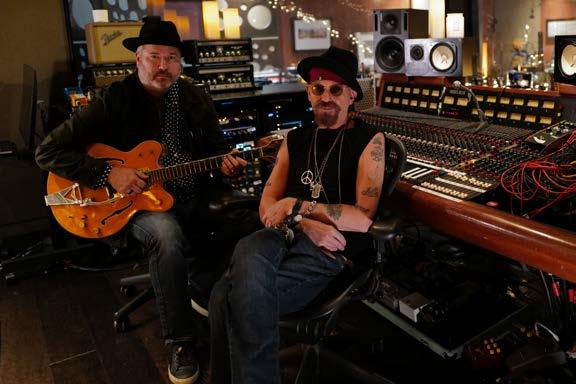
to this class?” And I went over there. The next thing you know, you’re playing a pawn shop owner on Matlock and it’s like, “Well, yeah, I’m making more money at that than I am in music, so . . .”
When I was living in Nashville, I found myself working in in film just because I could make some money, you know?
Oh, absolutely. I mean I first went to Nashville to be a songwriter in ‘77. And got my ass kicked, and you know, went home and licked my wounds and went and got in a band in Mexico.
What
kind of music were you playing in Mexico?
Well, it was a band there actually out of Lemon Grove, CA, but we played in Mexico mostly and around San Diego, but it was a cover band mostly. You know, we had three or four original songs, I think, but this was at the time when Foreigner and Steve Miller and people like that were popular, you know? So we mostly played stuff like that.
Are you a spiritual guy? What do you think the connection between God and music is?
I kind of look at everything as all balled up into one thing. You know, I think the universe is kind of all in sync. I think music or painting or anything else is all just kind of tied up into it. I’ll put it this way. I mean, if you take any anybody who ever did things that affected people and people with a different kind of mind—let’s say anywhere from Benjamin Franklin to Captain Beefheart to Van Gogh—I’m not sure how that dies. You know, when people tell me that they their church is the only thing there is, and if you don’t belong to the whatever church it is, and you’re going to hell or whatever, right? I don’t believe that. I don’t believe that. I also don’t believe people who say they know for a fact there’s nothing.
I think they’re equal in their ignorance.
61
So what I believe spiritually is that they’ve already proven that energy doesn’t die. Well, I also think that if you take certain people and their thoughts, their thought process, and just who they are as a being, it’s not just a machine. I’m not sure how those thoughts die either. And so that’s where I stand spiritually and I believe that. You know, there are good and bad people. There are people in somewhere in the middle. And I think they’re all just an extension of one thing, you know?
Let’s say you met an extraterrestrial that had never heard music. If you had to describe to this extraterrestrial why music is so important, what would you say?
Well, I would explain it to him this way: I would say music is the sound of your soul. You know? It’s like that. First of all, now if these aliens looked like gigantic, you know, praying mantises or something like that, then it might be a little harder to talk to them. But if they were just like those little green guys with the big eyes like you find in Roswell . . .
Like the ones they had in Mexico the other day?
Yeah, that kind of thing. Then I think you could just say you know how you guys don’t have to necessarily talk to get a point across because you’d have that telepathy and all that kind of thing. Well, that’s kind of music as a language for us that makes us feel things and we all feel it. We don’t have to speak the same verbal language to understand it and feel it. I think they’d probably buy that. If they were the Praying Mantis Gods, I’d shake them down for weapons first.
What about your responsibilities as an artist? Do you have responsibilities as an artist?
Yeah, I think so. I think art by nature is supposed to be a singular vision and I think you should be able to express yourself however you want to express yourself. But that being said, I also don’t think you should be singing songs about how wonderful dope is to a sixth grade class. You know what I mean? It’s like I think the things that you say, or are trying to say, I think you have to give those things to an audience that’s ready for it. You know, I don’t think you can just go willynilly out there and just do whatever you want to.

BLUE MOUNTAIN REVIEW APRIL 2024
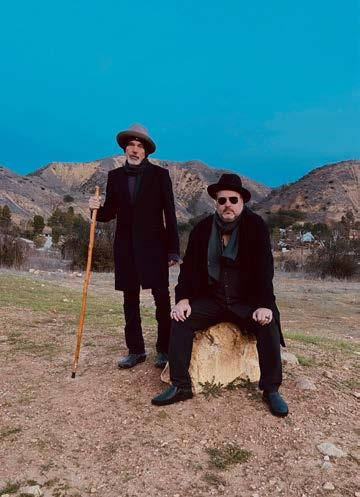
And I also think we’re really good with our audience because not only are we interactive with them on stage, but we also stand there in the rain and sign stuff for them and all this kind of thing and talk to people because those are the people that put your kids through school. And I think you owe them that. So I’m not real big on artists who are—I mean, I’m kind of a hermit—but then when I am out there I’m going to be friendly to people. Unless they’re not friendly and then there is a side of one hundred fifty pounds that’s pretty mean. I just think you know when people appreciate you. You should appreciate them back. I’m not big on not showing up or not signing their stuff.
You kind of touched on it already: you got your sunshine sunny day lyrics, then you have the darkness. It seems lot of your lyrics are coming from a darker place. But where do you draw the line between the darkness and the humor?
That’s just kind of the way we think. You know, I mean it’s not really like I said—none of that stuff’s by design. It’s just that humor and horror and happiness and all these things—they are, well, I mean, I grew up in the South and JD grew up in Kansas. Back there after funerals, which are pretty intense in the South, after that you go back to whoever is the matriarch at that point to their place, and there’s a potluck. And people are like sometimes drinking beer and whatever. And you’ll find something funny and some weird thing you know? Like somebody scratched the coffin with their new watch or something, and then all of a sudden everybody’s laughing about it at the spotlight.
I mean, there’s dark humor, and then there’s regular old humor. Ours is mainly dark, but you could also just call it life, you know, because life is just a mixture of all of them. It’s just like these days with movies. Dramas are over-earnest with no humor. And comedies are just a bunch of wacky stuff with no heart. And the fact of the matter is, both things happen every day. Together, you know. And usually it’s just the mood you’re in. And when you write a song, I mean, if I’m in a bad mood, or if I’ve been hurt pretty bad, that’s a really good time for me to write a song or listen to music. It’s a good time to listen to music, but I like to listen to music that is also sad or dark. I don’t get happy by listening to happy songs.
I get happy by listening to darker songs and as a matter of fact, there’s a song we just finished for this new record we’re working on. It’s called, “I Need the Rain.” In that we talk about it. It’s about a bad breakup and a loss of some kind and in that process you see everybody on the street being happy. And that’s not making you any happier. It’s like you need a little rain. You know you need to feel something as deep as you can feel it in order to get rid of it. I guess that’s the best way to describe it.
What advice do you have for young artists seeking to make it in the entertainment industry?
My advice is to first of all, don’t look at it as making it. If you’re in it to make it, you’re in it for the wrong reason. So my
63
advice would be do what you feel in your heart. Start there and see if you catch on with people because there are people out there that want to hear it. I mean, there are a lot of people over the years when I would speak to a group of young artists or something and they always say, “So, how did you make it?” I said, that’s a long story and I couldn’t tell you what the answer is. I don’t know how that happened. There’s not some magical formula to help you make it and if you’re in it just to be rich and famous, there are ways to do that. My mouth’s not wide enough.
I’ve got a song about a one-legged woman.
I’d love to hear that song and it makes me think about the only time this ever happened to me. I was with Tim McGraw. We were somewhere in Texas. Tim and I were up somewhere and this girl came up with a big plastic garbage bag. You know, those heavy duty garbage bags? And she said “My Dad is such a fan of both of you guys. And I really would love it if you had autographed this for him.” And she said there’s all kinds of people that he’s got autographs from. He’s got them from Waylon Jennings and whoever else it was—Chuck Berry and Jerry Lee Lewis—and you know everybody. She said, “If you guys wouldn’t mind, I’ve got a marker and everything.”
So, you know we said, “Yeah, sure, we’ll sign it.” So she hauls out his artificial leg from this garbage bag. And I have to say that was the first for either one of us—that we’d never signed an artificial leg. And sure enough, when she pulled it out, there were signatures all over that thing. Merle Haggard, Waylon, and I think Jerry Lee was on there. You know, Cash. Everybody signed it.
What can people expect from The Boxmasters in 2024?
Well, we’re doing a Pacific Northwest tour up into Canada and all the way across Canada and back down into the northeast with a few shows sprinkled in. And the Midwest and the South. That tour is going to probably start around late August and go through October. We have this record we’re working on right now that hopefully will be done. We have this just one we’re working on now with Raymond and Kirk that will come out at some point. So we may have a couple of records out next year. And if we can figure out a way to get it out there, we just finished this concept record that we love very much called Stranded in a Stain: Volumes One and Two. We stay busy in the studio all the time because we can’t stop. That’s when we get a record or two ahead all the time.
Stranded in a Stain is available at www.theboxmasters.com (as well as everything else!). The new album, Love & Hate in Desperate Places, will be released August 30, 2024
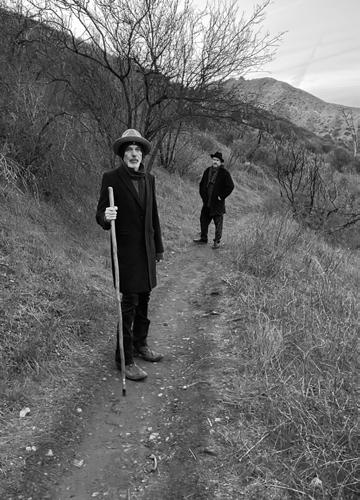
BLUE MOUNTAIN REVIEW APRIL 2024
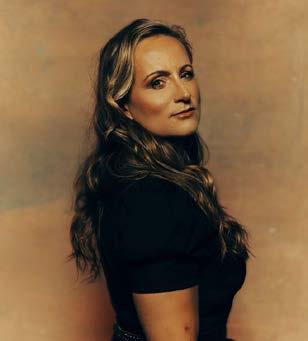
an interview with
NICOLE WITT
bY CLIFFORD BROOKS
Tell me about your new projects as a songwriter and your new solo releases that are coming in 2024?
This year is shaping up to be a great year! I have 3 songs that I co wrote that I’ll be releasing as singles. If It Ain’t With You is already out, into the world. I have 6 or 7 solo tour dates on the books this year as well. In June I’ll be on the Hometown and Around tour through Missouri. I am looking forward to going back to my hometown for the second year in a row.
I am doing a lot of Artist Development this year through Artist And ( a creative mentoring community) which is a new thing for me. I am having a blast developing 5 new artists. I will definitely end up down the road moving into management. I love music and love helping artists find their songs, their brand and their artistic identity. I have a few songs coming out this year on brand new artists and I am so pumped to see how all of this unfolds!
Tell me about the Six One Five Collective? Where did you get the name? What is coming for the group in 2024?
Oh man, the Six One Five Collective is an amazing thing. We’ve all been friends and collaborators for a long time. We came together in the fall of 2021 and played our first show in Nashville at the Cannery Ballroom. We’re all songwriters so it’s been easy and very fluid to find songs that fit our brand and band. It’s a high energy stage show ala Fleetwood Mac or Little Big Town.
Honestly these guys are some of the best musicians and songwriters we have in Nashville, most importantly though they are all amazing humans. That last piece can’t be overlooked and I believe loving on audiences all over the country is the CORE of it. We are there for a party but we are also there to spread some joy and love that will hopefully take people back into their work week with a little bit of light.
The name came from the area code of Nashville. We were all raised in different areas of the country but we’ve all become Nashville lifers. The Six One Five Collective is a group of Nashville Ambassadors.
We recorded a new album called, very appropriately, Music City. It’s a 6 song collection that shows not only the vastness of this group but also the vastness of Nashville’s music scene. The very first single is a song that I co wrote called
65
Brothers of the Highway.
George Strait was the first one to cut the song but it’s been recorded by Dailey & Vincent, Tony Justice and several other artists. My dad worked for Roadway Express for 32 years.
Michael Logen’s dad worked for Gotwals Trucking for 15 years. It just sort of became an anthem for us on stage. It’s about the freedom of the open road. That’s what we also experience as touring musicians I guess. That song went to secondary country radio March 18th as an introduction to our band. We’ll be hitting the road a bunch this year. We have 16 shows all over the country with about 15 more coming so it’s gonna be an amazing year for sure!
What is your favorite way to spend time when you’re not working on new music?
I’m a bit of a nerd. I love to travel and study the history and culture of different cities and countries. I am also a foodie and a drinkie so that works well with the gypsy wanderlust thing . I’ve never met a small town, community, city, town, country I didn’t like.
Why is exercise/wellbeing such an important piece to your creativity and process?

I love taking care of my mind, body and soul. I love to work out, not because I love to work out, but because it makes me strong and mentally focused. I just came off of a 36-hour fast this morning, which I do about once a week. I started fasting about 5 years ago because we were challenged at church to a 24-hour prayer fast. I really didn’t know if I could do it. Five years later this has become a very natural process, a quieting of my body, mind and soul which is welcome by a person who can’t sit down or relax EVER. Eating well, exercise and fasting helps me creatively focus. I’m not sure I’d be able to continue at this pace without wellness.
How do you stay sane and centered in the music business today?
I only have one word. Jesus. He’s gotten me through anxiety and the darkness that surrounds the business. I think the constant flow of NO’s that we all receive being a creative wears on us over time. My faith has been the constant.
I also love people, I love to have a lot of fun, I love working hard, I love helping people AND music is like a limb of my
66
body and the air I’m breathing. I can’t not do it. I’m gonna be the weird 80-year old hippie lady that is still playing at the local community center. Ha. Every single day is an adventure. I don’t want to miss anything.
What’s one of the biggest mistakes your artists make and how do they avoid it?
That’s a hard question to answer cause I think it’s different for everyone, but for me, it was not trusting in my own musicianship and leaning into that more in the beginning. I didn’t have the confidence to be totally me. I think for some it’s having enormous amounts of talent and maybe even getting huge shots and then not taking the trophy out of fear or laziness. To be successful in this career you have to be a hustler.
ABOUT NICOLE:
Nicole Witt is a nationally-touring, award-winning songwriter and multi-instrumentalist known for her soaring melodies and clever turns of phrase. She just released her first EP “Clear” and celebrated with a sold out release show in Nashville. Her third single Bourbon, and the official video, was featured on the Country Network and CMT, reaching the #3 spot on CMT’s 12 Pack Countdown. The fifth single Kiss (ft. John Paul White) also reached the #3 on CMT’s 12 Pack Countdown. Witt just released her latest single If It Ain’t With You with a world debut of her official video live on CMT.com.
She has written songs for artists such as George Strait, Lee Brice, Rodney Atkins, Aaron Goodvin, Meghan Patrick,Terri Clark, Lauren Alaina, Balsam Range, Mandisa, Ellie Holcomb and many more. In 2011, Witt received the international Bluegrass Song of the Year Award for Balsam Range’s “Trains I Missed.” In 2014, she was nominated for a Dove/GMA award for Country Song of the Year. Her song Brothers of the Highway, cut by George Strait was on his CMA & Grammy winning Album of the Year, Troubadour. She has moved into TV and film writing with song credits on shows like “Reign”, “American Idol” and the short film score called Black Mountain. Witt is a cowriter on “You Ain’t” by Canadian Country stars Aaron Goodvin ft. (Meghan Patrick) which reached #18 on the Canadian Country charts.
Witt has spent the last 10 years writing and touring while building a grassroots small business as an artist, songwriter & mentor. She is the founding member of the super star act Six One Five Collective. Their song “Kindness” was featured on American Idol 3/19/23. They just released their first single of the year Brothers of the Highway which is building steam on country radio. The official video just debuted on CMT.com. In the past 3 years she has played over 200 dates performing all over the country and world opening for Kenny Chesney, Old Dominion, Trace Adkins, Billy Currington, Bacon Bros & many more.


67


PLEASANT HILLS MONTESSORI
PHMS offers a warm, supportive academic atmosphere, and sets a high level of expectation for the quality of thought, work, and mastery of content and skills.
Using an integrated thematic approach that ties the separate disciplines of the curriculum together into studies of the physical universe, the world of nature, and the human experience, PHMS consciously teaches students how to develop effective work habits and test-taking strategies.

68
OFFERING A ONE-OF-A-KIND, PERSONALIZED EDUCATION FOR LEARNERS 3-12 YEARS OLD LEARN MORE & DONATE Reading & Language · Mathematics · Geography · Science · Arts · Practical Life Skills Want to help fund a student’s top-notch education? Did you know that the state of Georgia will give taxpayers a dollar-for-dollar tax credit when donating to Pay it Forward Scholarships and providing scholarship funds for schools like PHMS. Click the link below for more information and to request your Georgia tax credit today. http://www.payitforwardscholarships.com/phms https://www.ellijaymontessori.com
VISUAL ART
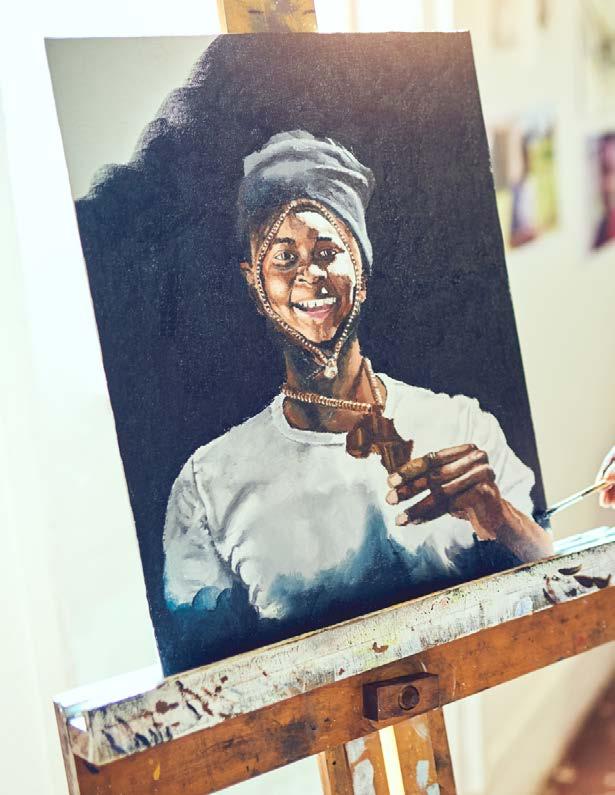
VISUAL


an interview with
SHALLON FADLIEN
bY LYNNE KEMEN
Welcome, and thanks for agreeing to talk with us today. You were born in Saint Lucia, and your art looks very Caribbean in terms of colors. Yet you received your degree from a college in Canada and live there now. Can you describe how locale affects your art?
Thank you for having me. I appreciate the opportunity to talk about my art.
To answer your question, not only was I born in Saint Lucia, but I was raised there and left only as an adult. My spirit has been nurtured by some of the more vibrant aspects of Saint Lucian culture like our carnival, flower festivals La Rose, La Maguerite and other creole heritage activities. Even our national wear is produced from brightly coloured Indian madras fabric for reasons related to our colonial history and so colour has traditionally been a dominant part of our lives. Additionally, as the island is located so close to the equator, the sun’s luminosity makes these colours pop and vibrate. All of this nostalgia influences how I perceive colour and my choice of colour palette in my work. For opposite geographical reasons, being further from the equator, colours tend to be more muted in Canada especially in the autumn and winter months. So while Canada is where I live now, my primary experiences with colour are still intrinsically woven into me and this is what you observe as Caribbean in my art.
How would you describe your art to someone who hasn’t seen it?
My art tends to lean towards Surrealism because generally I allow my subconscious to direct my drawings. Representational forms of women and other subjects are characterized by minimal, stylized, organic lines. Continuous flowing lines have always been an attraction for me and outlines and clean edges can be highly visible in my work. The lines and edges can give a very graphic feel to my work sometimes. I am also drawn to pattern and the treatment of my subjects can vary from realism to pattern and symbolism.
71
Many of the subjects are women. How would you say you portray women?
The women I paint are always portrayed not just for their physical beauty but to emphasize their complexities, challenges, strengths and vulnerabilities. My subjects vary in age and physical stature, addressing some of the challenges that come with aging both mental and physical. Some other themes around the subject of women that may arise in my work are androgyny, isolation, motherhood and freedom.
Since 2000, you have been collaborating with poet John Robert Lee. I interviewed him for The Blue Mountain Review in September 2022. Who decides what you will work on? Is it the artist or the writer? Or does it switch? Can you describe the collaboration?
Robert first reached out to me to provide artwork for a book he was curating with fellow poets Kendel Hippolyte, Jane King and Vladimir Lucien. The book is called Sent Lisi: Poems and Art of Saint Lucia.
Our very first ekphrastic collaboration happened after I sent my Symphony series to Robert asking him to respond in poetry to the fifteen paintings. At first, it seemed doubtful whether he would agree to writing accompanying poems but, after about two weeks, he had started to warm up to the idea and Song and Symphony was born. During this collaboration it was important to Robert to get a feel for what I was really attempting to convey. It was clear from discussion that he instinctively understood what the work meant to me and even made a suggestion that I swap the order of the last two pieces for greater effect. After this, we developed a mutual respect and started to share our work more often.
Since we often share reading material and art that interests us, collaborations can occur in a few ways. First, I may share an image of mine with Robert which resonates with him, and he is inspired to write. Second, sometimes we are

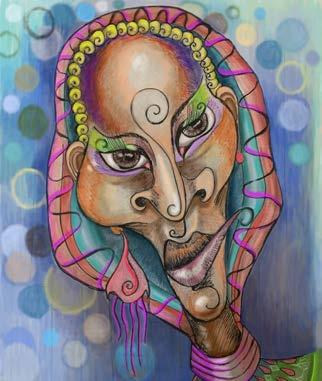
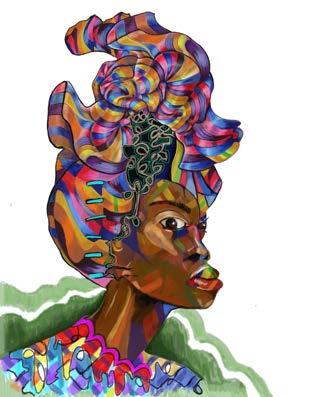

considering similar themes simultaneously and so image and poem feed off each other. One of my paintings may bring a completed vision of an idea he is in the process of developing and contribute to his writing or certain phrases from his poetry that have really stuck with me and may come to mind when I am creating. Third, occasionally, Robert may also ask me to find artwork that fits with something he has already written.
How can we find you on social media?
I can be found on Facebook and Instagram.
about SHALLON:
Shallon Fadlien is a visual artist working primarily with acrylics, digital and mixed media. She earned a Bachelor of Fine Arts from OCADU, Canada. Bold colours and simplistic lines are integral to her compositions as she explores themes of women, love, life and fantasy while blurring the boundaries of realism. Shallon has engaged in several collaborations with Ekphrastic poet John Robert Lee. These include Song and Symphony, The Blue Mountain Reivew and John Robert Lee’s Pierrot book cover, Peepal Tree Press 2020. Her work has been displayed at www.galleryring.com, www.hmvcgallery.com, and the HMVC Colour 2023 exhibition on the Jumbotron in Times Square.
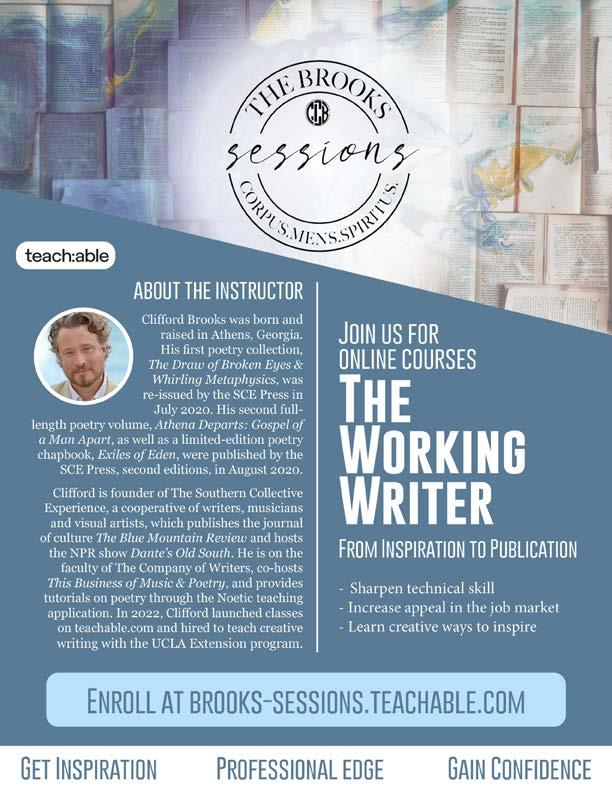
https://brooks-sessions.teachable.com/p/the-working-writer
SPECIAL FEATURES
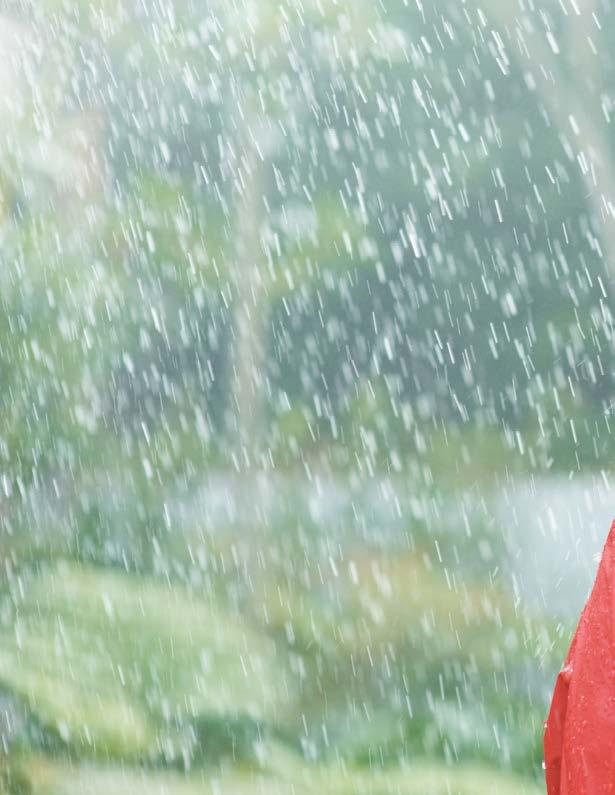
SPECIAL FEATURES

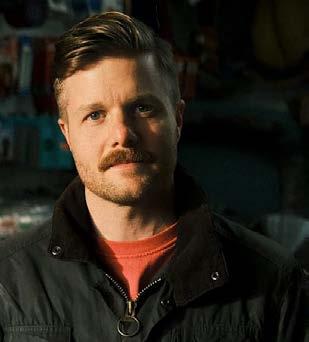
an interview with
GRAHAM PRITZ-BENNETT
bY AHNA PHILLIPS
How did a guy from North Carolina end up writing and directing TV, films, and commercials in Scotland?
My path has been pretty windy. Born and raised in North Carolina, I began undergrad at NC State in engineering only to finish with economics. Obviously, the next logical step was to move to Vancouver, Canada, to complete a Masters in Theology and the Arts. During that time I finally discovered my real passion after apprenticing under the film director, Byron Lamarque. (Byron ended up directing my first feature film, The Desiring.) I eventually picked up enough skills to become an independent filmmaker myself.
My wife and I moved to Scotland so she could earn a PhD from the University of Edinburgh (and so that our daughters could acquire Scottish accents). In Edinburgh, I’ve worked as a director and cinematographer for a local production company, making commercials, documentaries, and feature films. About a year ago I left so that I could freelance and develop my own projects.
Your background includes experience in areas that wouldn’t seem directly related to film, such as theology and mental health work. Why the shift to work behind the camera?
My interests are all over the place, which is probably why my career in TV/film is perfect. I can explore different themes and stories in a range of genres. Theology and philosophy have always interested me because through them I’ve been able to wrestle with existential questions, and actually I do the same through film. Whether I’m working on a dark drama or absurd comedy, I’m always digging for a deeper “why.”
Upon completing my MA, after our first daughter was born, I worked the night shift as a mental health worker in a social housing project for active drug users in downtown Vancouver. It was a grueling schedule, and sometimes the nights were downright tragic. But boy did we also laugh a lot, and those nights impressed upon me our common humanity. Every single story there seemed worth telling.
I think I’ve always lived as if I am observing myself and others in a narrative. Everyone is a character, and something scary or embarrassing today is going to make for a good story tomorrow. I may have gotten into filmmaking through writing,
77
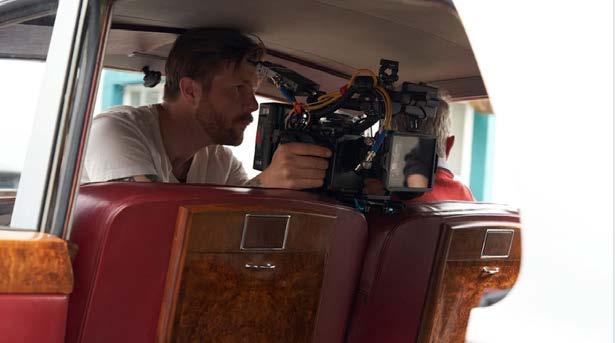
but pretty quickly I realized that I see the world in pictures and moods, and that I wanted not only to write stories, but creatively frame and direct them.
Congratulations on the awards that your first feature length film as writer and cinematographer, The Desiring, have earned at film festivals from Prague to Seattle! You call this a Southern Gothic feature film. What do you think gives it this distinction?
Thank you! We made the film on a shoestring budget, with a dedicated, but small, crew. Once it hit the festival circuit it was either rejected (and good grief, it was rejected a lot) or it won awards. That validated for me that we had made something special, but risky. And I attribute the whiplash response to the film’s Southern Gothic characteristics. I didn’t want to just recreate a Flannery O’Connor or William Faulkner story; I wanted to present southern gothic qualities in a subtle way – taking the seeds of the grotesque, the ironic, the supernatural, and letting them grow in a present day story in the South I grew up in, the South that I know.
So how do I see The Desiring fitting into the Southern Gothic tradition? Well, the tradition has often used grotesque elements to force its characters (and therefore the audience) into introspection. Richard, our protagonist, is blissfully unaware of how deeply his past has affected his inability to love his wife. Richard may not be physically grotesque like Frankenstein’s monster; like a good southern boy, he knows exactly how to appear good in good society. And yet he is like a gothic monster nonetheless: His disfigurement is revealed to the audience in his voyeuristic response to his wife’s affair. But the grotesqueness of his response evokes both disgust and empathy. Here is a guy so unable to love he objectifies his wife’s affair. But maybe he is to be pitied for all that? How do I know whether my love is any less disfigured and selfserving?
I’ve always loved the way Flannery O’Connor’s characters, no matter how grotesque, are never barred from the possibility of redemption. And what’s more, redemption comes in bizarre and ironic ways. O’Connor has a way of exposing the status quo precisely by dismantling it, by shattering its illusions in sometimes shocking ways. This theme infiltrated my writing too, and I don’t think Richard could be a redeemable character but for his, ironically, turn to callous perversity.
Finally, a Southern Gothic film wouldn’t be complete without some supernatural haunting. The Desiring makes the supernatural both an explicit and implicit element in its world. Explicitly, we encounter the spiritually eccentric character of Richard’s father, a man who provides a “ghost-like” presence in Richard’s life. Implicitly, this haunting is also how we
78
learn of Richard’s relationship to desire. I am fascinated by desire, and why human beings are creatures of desire. We don’t just want what we need to survive - we want incessantly, voraciously, and sometimes to our ruin. Many religious traditions have pointed out the inverse relationship between desire and satisfaction.
And yet, without the desire to go beyond, could we be creatures that love, that make art, that push for new realities every day? Richard wrestles with the “ghost” of the double-edged sword of his own desire, that human characteristic that I think defies easy naturalistic explanations. Desire gets him into trouble; desire is his only hope.
Graham Pritz-Bennett’s film, The Desiring, is available to stream on all major platforms.

about Graham:
Graham Pritz-Bennett is a North Carolina-born, Scotland-based filmmaker, who has served as cinematographer, director, writer, and editor on short-form digital content, TV commercials, documentaries, TV pilots, and feature films. His first feature film, The Desiring, has won awards including Best First-Time Screenwriter, Best Director, Best Supporting Actor, and Best Cinematography.
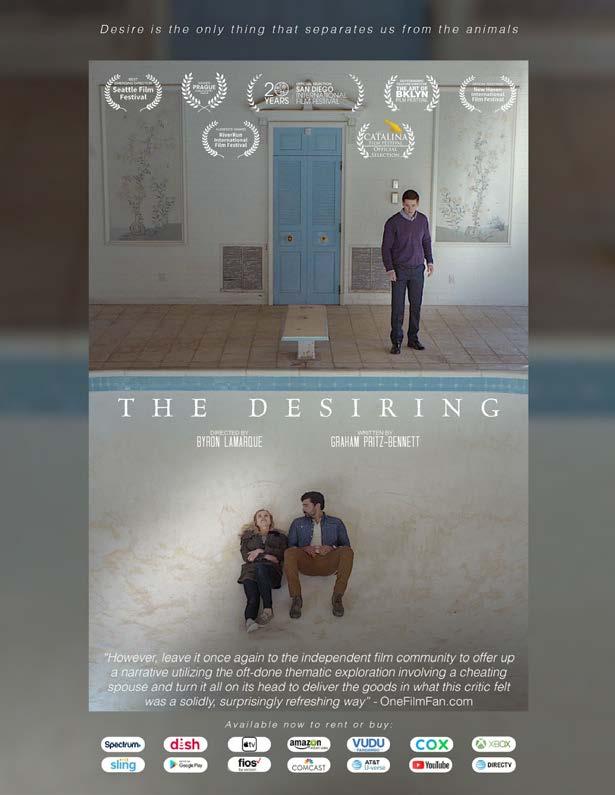
southernreviewofbooks.com
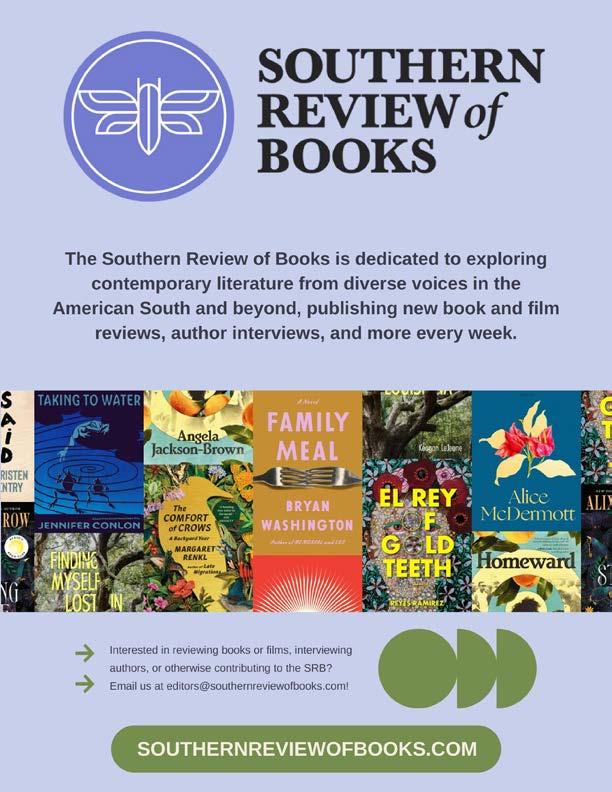
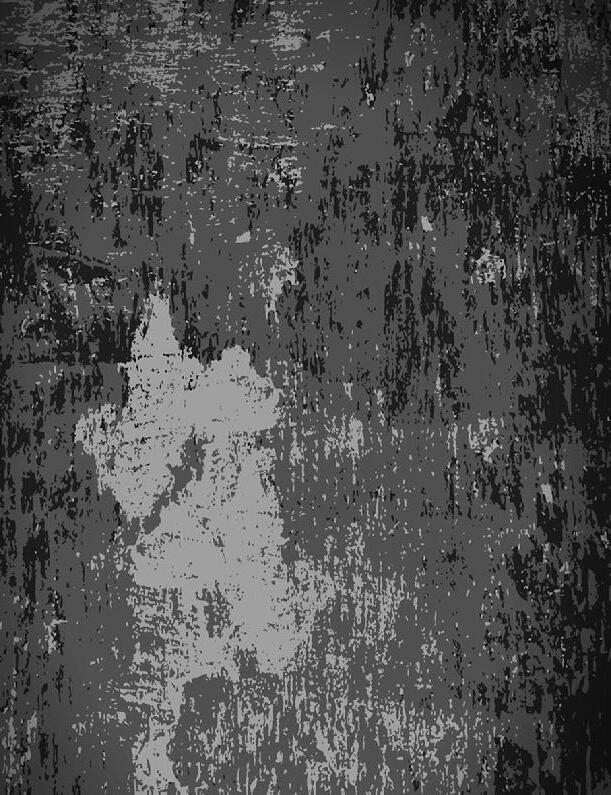
A COLLECTION OF POETRY
Things I Wish I Could Tell You by Casanova Green

ThingsIWishICouldTellYou, heavy as the weight of everyday questions asked. Casanova Green, with keen eye and clear vision, pushes us beyond the surface dimensions of easy, everyday answers. Electric in places, subtle in its power in other places, always elegiac, these poems persistently remind us of that which reminds itself of each of us. Rendered in rhythm, this collection emotionally examines and attempts to explain the range: Home to work, home to school, home to church and back home again.
Earl S. Braggs, author
of Negro
Side of the Moon
Things I Wish I Could Tell You is a heartfelt and heartwarming book in which Casanova Green uses everything he knows of American vernacular and black storytelling. These poems tell like secrets. This is a book interested in forgiveness and salvation.

Jericho Brown, author of The Tradition 2020 Pulitzer Prize Winner, Poetry
Yes, you should read this book. But don’t just read this book—speak it out loud, put it in your mouth, sing it if you have to, “beat a blessing / into a Jesus praying hands tambourine / as the choir squalls and barks these lines.” In faith and in doubt, in harrow and in hallelujah, these poems come from a speaker who says things through his soul, who shakes his sentences till the verbs become hinges that make their own doors. Go through them!
Kathryn Cowles, author of Maps and Transcripts of the Ordinary World


Published by Southern Collective Experience
things
i could tell you
Praised by Pulitzer Prize Winner Jericho Brown PURCHASE AT SOUTHERNCOLLECTIVEEXPERIENCE.COM southerncollectiveexperience.com
i wish
poetry by casanova green
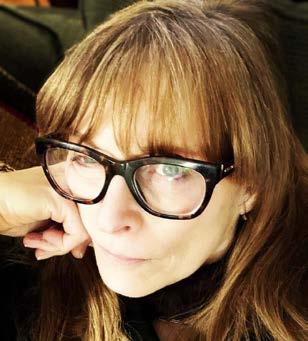
an interview with
LAUREN ALWAN
bY LYNNE KEMEN
Let’s start at the beginning– tell me about the museum of americana: a literary review. It’s not really a museum, though, right?
Well, it’s not a literal museum where you stroll the galleries and look at objects. Although, from the beginning, the word museum was important. Justin Hamm, our founding editor, conceived of the project as a figurative space for the curation of cultural artifacts, for framing life and experience in a new way. From the start, Justin’s interest has gone beyond enshrining objects and ideas to that of re-envisioning the notion of Americana, so the journal, much like a contemporary museum, presents our readership with ideas that reframe cultural experience from positions outside the traditional space of Americana.
We’re an online journal publishing three issues annually along with Americana Stories, a weekly feature of poetry and prose. Because we feature reimagined Americana, we’re not as interested in straight nostalgia but in seeing American culture from a new way—from the margins, for example, or from an unexpected perspective through juxtaposition, voice, or point of view. It’s all about casting light on the unexpected that exists in the everyday. As Justin says, the museum of americana examines the huge tub of spare parts that make up the contemporary experience of living in the United States.
Tell us about your role at the museum.
I’ve been with the museum since its founding in 2012, as a co-editor in the prose department, and in April, my role transitioned to a contributing editor. We’ve recently brought on a new prose co-editor, Andy Harper, and we’re elevating our prose assistant, Montéz Jennings, to co-editor. Both are talented writers, and scholars of literature, and they’ll be great!
One of the questions that I was going to ask you is, as a prose editor at your publication, what are you looking for? But that’s going to be changing somewhat, I assume, with the new people.
There will naturally be some changes, though the co-editors will continue to seek repurposed Americana in fiction, flash fiction, memoir, and essays. Their esthetic will of course determine what they accept, and that will be a fresh and exciting development for the magazine.
83
In the Prose Department, how many submissions do you accept?
The issues have always had limited space, but now, with Americana Stories, we can offer more opportunities for writers. During each submission period (our next one is August 1-31), we select up to six works for the issue. Those might be longer pieces (our word limit is strictly 3000), or work that is narratively more complex. Occasionally we put out calls for themed issues, but whether an issue is themed or general, we tend to select works that gravitate together. For Americana Stories, we select around eight pieces for each series. The work tends to be shorter, perhaps lighter in tone—perfect for reading on your phone during a commute or break. If you subscribe, we can send them to you directly!
We seek prose that is well-structured, with a solid premise and well-crafted sentences. Stylistically the museum is eclectic. In fiction, we’re interested in seeing a change by the end of the piece. In nonfiction, we like to see the speaker as part of the narrative, and how the writer and the material connect.
Do you only accept things as they are? What if someone submits something and it’s close, but it needs a little tweaking?
From the museum’s beginning, the prose department has worked with contributors to polish, and in some cases, develop work. We also line edit for clarity, usage, and house style.

What is your background?
I have a BFA in painting from the San
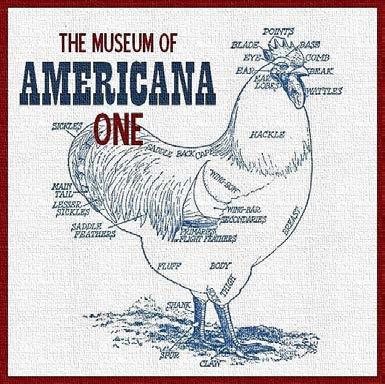
Francisco Art Institute and an MFA in painting from San Francisco State. I exhibited work and received a public mural commission from the University of California, but over time I became dissatisfied with a strictly visual vocabulary and began to experiment with text and image. Eventually, I started writing, and attended writing conferences, working with writers who encouraged me, and eventually, I began to publish. Later, I got my MFA in fiction at Warren Wilson College. I haven’t painted for some time now, but I love writing about art and see myself as a visual thinker.
What are you working on?
A manuscript I’ve been working on since graduate school. It began as a story collection, then a linked collection, and ended up as a novel. It’s about mothers and daughters, lineage and place. I hope to send it into the world soon.
Do you have the next book in mind?
I would love to write a book of nonfiction—personal essays on California, belonging, and hybrid identity.
Thank you. How can we reach you on social media?
Twitter/X: @museumofamerica
Instagram: @themuseumofamericana
Facebook: @TheMuseumOfAmericana
Lauren Alwan’s website is https://www.laurenalwan.com/
about LAUREN:
Lauren Alwan’s fiction and essays have appeared in The O. Henry Prize Stories, The Southern Review, ZYZZYVA, StoryQuarterly, Alaska Quarterly Review, Catapult, The Millions, World Literature Today, Alta Journal, and others, including the anthology A Map Is Only One Story: Twenty Writers on Immigration, Family, and the Meaning of Home (Catapult 2020). She is the recipient of a First Pages Prize from the de Groot Foundation, the Bellevue Literary Review’s Goldenberg Prize for Fiction, and a citation of Notable in Best American Essays. Learn more at www.laurenalwan.com.
85
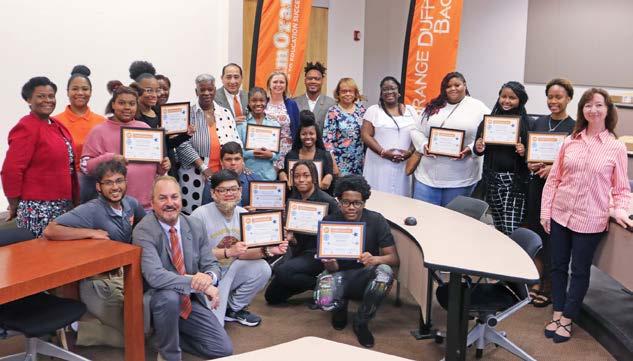
Since 2010, 1700+ high school and college students, experiencing foster care or homelessness, have graduated

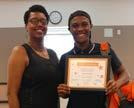
Program participants define and create a comprehensive plan for their education and life success. Program graduates earn a fully loaded laptop, certificate, and orange duffel bag...becoming lifelong members of Team Orange.

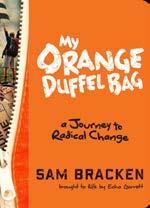
MY ORANGE DUFFEL BAG: A JOURNEY TO RADICAL CHANGE
By Sam Bracken and Echo Garrett
Abandoned at age 15, Sam Bracken battled homelessness, poverty, and abuse to successfully earn a full-ride football scholarship to the Georgia Institute of Technology. When he left for college, everything he owned fit in an orange duffel bag. This award-winning illustrated memoir is a road map to personal transformation.
My Orange Duffel Bag Award Highlights: 2011 Outstanding Book of the Year in Young Adult/Children’s from the American Society of Journalists and Authors, the first self-published book in the organization’s 60-year history to win an award.
www.theobi.org
86
ODBI 501c3 EIN 27-1845671 www.theODBI.org
ODBI‘s proven coaching model and curriculum!

an interview with
NOTRE DAME MFA ALUM PAUL CUNNINHAM
bY CLIFFORD BROOKS
You’re an alum of the University of Notre Dame’s MFA in Creative Writing program, but you’ve also since returned to now manage the program. What excites you about Creative Writing at Notre Dame?
Seeing how much our MFA students grow professionally during their brief time here is very exciting for me. Through various service fellowships, students can work as assistant editors for Action Books and Notre Dame Review; manage the undergraduate literary journal Re:Visions; and organize community outreach programming in the city of South Bend. In the summer, students receive opportunities to intern with Park & Fine Literary Agency, Ballantine Books, and University of Notre Dame Press. All of our students also get to teach their own Creative Writing classes during their second year. Though, perhaps what excites me the most is seeing what our students do after their time here. Two of our 2023 graduates have already been in touch with me recently to share news of their debut book contracts.
Has your editorial role at Action Books had any effects on your own writing?
Yes. I was already reading and being shaped by Action Books authors long before I took on my role as their co-managing editor. Aase Berg’s Remainland, Hiromi Itō’s Killing Kanoko, and Raúl Zurita’s Song for His Disappeared Love were three of the first Action Books titles I’d ever read. Gothic, surreal, queer, abject, transgressive, and incantatory. Those early Action Books titles possessed a sonic intensity that opened my eyes to new possibilities for sound and language. I suddenly found myself breaking away from learned forms and experimenting more with repetition and neologisms. Johannes Göransson’s translation of Aase Berg’s With Deer is what led me to Action Books. Göransson’s translations of Berg’s poetry, especially, had a major influence on my own writing. Each new season of titles we put out continues to fuel me.
James Pate has described your writing as “Pop Gothicism” and Christopher Higgs has called you a “punk poet.” Has punk/Goth/New Wave music had a direct influence on your poetics?
“Pop Gothicism” feels accurate. I see those three genres as interconnected. Punk ideology definitely steers my first book, The House of the Tree of Sores. The lyrics of Gang of Four’s “At Home He’s a Tourist” was early inspiration. In Goth: A History, I like how Lol Tolhurst cites Baudelaire’s “Au Lecteur” in Fleurs du mal in order to approach Goth as what he
87
calls a “shadow genre.” In other words, a genre of doubles, fakery, uncanniness. I prefer when “semblable,” in the last line (“— Hypocrite lecteur, — mon semblable, — mon frère!”), is translated as “twin” (Wallace Fowlie) or “double” (Robert Lowell). Authenticity is a subject that’s always fascinated me. Pop has always complicated authenticity—especially today (i.e. Instagram and taking a LinkedIn approach to selfhood). Authenticity and uncanny realms are also something explored by the writers I translate. For example, Sara Tuss Efrik’s Automanias features Twin Sisters, transforming bodies, and a rabbit that lurks in the chest-hole (or “peep-hole”) of a conjoined “Girl-Body.” Abandoned malls frequently appear in my writing, too. You could say they’re my version of Gothic castles.
The language of fashion frequently appears in your writing. Especially in FallGarment. Do you view fashion as an art form?
Absolutely. For me, there’s no difference between haute couture and a painting hanging in a museum. I have found 20-minute Thom Browne runway shows to be more exhilarating (and meaningful) than two-hour feature films I’ve seen. Thom Browne, Alexander McQueen, Sarah Burton, Charles de Vilmorin, Robert Wun, Rick Owens — I see all of these ‘designers’ as artists first. Storytellers, too. I hear people say things about fashion like It’s vapid, classist, elitist, wasteful, meaningless. And I just think to myself, But have you ever followed poets on twitter? When it comes to surfaces, twitter is pooling with narcissists. In summary, my interest in fashion has had a profound effect on my poetry. And conceptions of identity. Machine Dazzle has written on style as a form of Queer Maximalism, calling it “a creative method of resisting a flattened human experience driven by tradition, conservatism, and monotony in favor of an experience that is much more colorful, fun, and, indeed, dazzling.” There’s also an increasing number of very compelling books out there that theorize fashion: Staging Fashion; Critical Fashion Practice; Accessorizing the Body; Window Shopping: Cinema and the Postmodern; Fashioned from Nature; and many others.
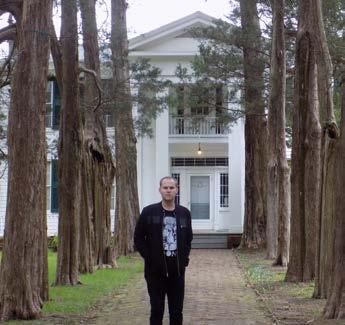

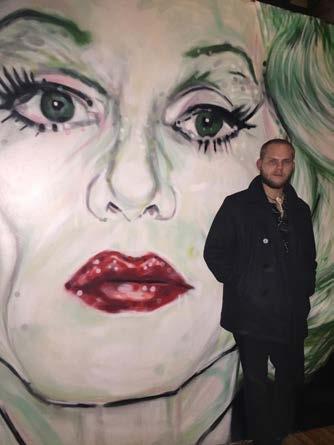
Can you talk about any new projects in the works?
I’ve recently finished two new projects. The first is an ekphrastic book-length poem called Brillo. It’s a response to Paul Thek’s “Meat Piece with Warhol Brillo Box.” The poems are also written in reds and blues that mimic the original Brillo design. The second project is a poetry collection called The Book of Knots. It’s about a vessel. The vessel may be a human body. It may be a whale. It may be a train passing through the night. The Book of Knots was inspired by Kawalerowicz’s Night Train and Antonioni’s The Passenger. Melville is knotted up in there, too. I’m also continuing to very slowly translate Helena Österlund’s Kari 1983.
What
are you reading right now?
Molly by Blake Butler; Death Styles by Joyelle McSweeney; Lonespeech by Ann Jäderlund; Mirror Nation by Don Mee Choi; Slaughterhouse for Old Wives’ Tales by Hannah V Warren; Tannery Bay by Katie Jean Shinkle and Steven Dunn; Trace by Brenda Cárdenas; Tone by Sofia Samatar and Kate Zambreno; Over Sight by Inna Krasnoper; To Hell With Good Intentions by Michael Martin Shea; and It’s Not Over Once You Figure It Out by Isaac Pickell.



BookClubPick
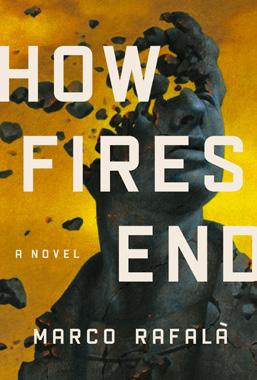
Marco Rafalà
“How Fires End is a raised fist of a novel, one filled with men’s brutal tenderness and tender brutality. It is both a subtle and powerful indictment of the silences between generations and a poignant testament to the bond between sons and fathers of all kinds. A blazing debut by an important new Italian-American voice.
“Christopher Castellani, author of
Leading Men
“
Beautiful, mesmerizing, consoling, and under immaculate control, Marco Rafalà's How Fires End is a powerful novel about the religion we create for ourselves as we face that which perhaps even God has not imagined for humanity.
“—Alexander Chee, author of Edinburgh, The Queen of the Night, and How to Write an Autobiographical Novel
“
Marco Rafalà’s debut novel, How Fires End, avoids Mafia tropes for a moving depiction of multi-generational loss and love, grief and gratitude, heartbreak and hope.
-Kirkus Reviews
“purchase your copy here purchase your copy on Amazon

90 BLUE MOUNTAIN REVIEW APRIL 2024
introducing
First
SCE
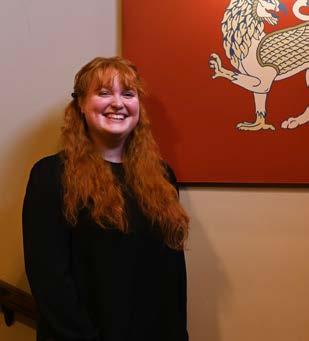
an interview with
THE CROWN BRASSTOWN’S ROSE WISLAR
bY CLIFFORD BROOKS
Who are you and what makes you happy?
I am a daughter, sister, friend, confidant, and protege. I am lucky to have so many incredibly important rolls, including taking care of and managing a place as beautiful as The Crown. This is my first job that renders me content and I have found joy in that. Much of my happiness currently comes from self discovery, growing into my own and learning more about who I am.
How do you stay calm and bright with the general public?
Making someone smile brightens my day so much, ultimately if I can be a little light in anyone’s daily journey I feel like I have done my job right. Treat others as you wish to be treated, I don’t think there is any other way to be.
What hobbies do you have that maintain a balance with your work life?
A lot of my hobbies involve being apart of such a large loving community that spends lots of time together through dance, music, and art. My closest friends work with me at The Crown, most weeks are filled with social outings, warmer weather inspires us to get outdoors more, the occasional trips together filling us with memories. I also try to prioritize doing small things that bring me joy like coffee and quiet time in the morning, or a nice glass of wine and a puzzle after a long day. I work lots, but I am lucky enough to want to head into work early because I’m excited about the day ahead.
What brings you to the Crown?
The Crown has been a part of my life for quite some time now. To me, The Crown is not just work- it is love, family, laughter, and light. Relationships bring me to The Crown. Community brings me to The Crown. I think these core values are what keep so many people coming back. You’ll find most of us there on our days off, we just can’t stay away.
91
How does the Crown stand out among restaurants of its kind?
I think Donna and Robert’s ability to create such a thoughtful and genuine environment that radiates acceptance and comfort really makes The Crown shine. This concept, their dream of community permeates the restaurant as a whole- from the cozy home aesthetics to its longtime employees, everything works together so well. People travel from near and far to visit with us, locals recommend us to their lifelong friends, we want everyone to feel as though they are apart of something special. The Crowns Locally sourced ingredients from our farmers and gluten free recipes that have been mastered from years of practice thoughtfully put together by our Chef, each bite shows you who we are.
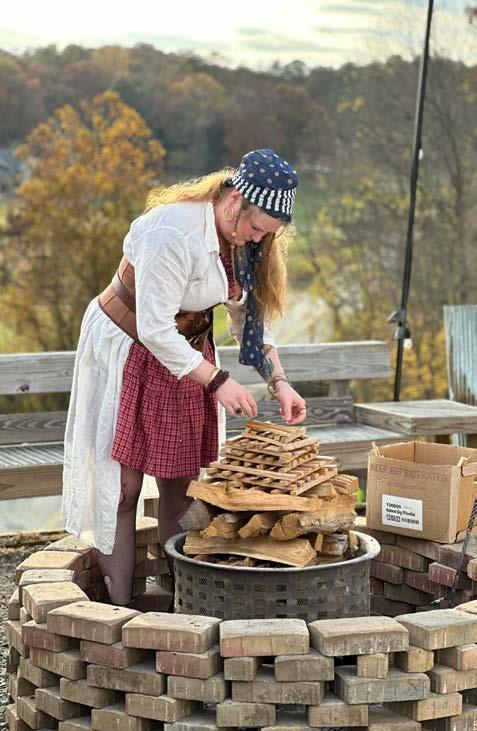
92
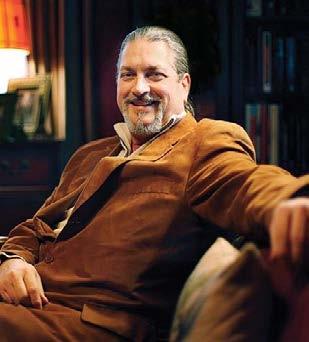
an interview with
ASHVILLE POETRY REVIEW’S KEITH FLYNN
bY CLIFFORD BROOKS
What’s new and next for the Asheville PoetryReview?
We are about to publish our 30th Anniversary Issue in December and have embarked on a complete overhaul of our website which will include content from our very first issue, published in 1994, to the present day. This will ultimately produce one of the most interesting and diverse poetry archives on the internet. We will include generous content from the first 15 years of issues, and complete issues from the last 15 years with lots of graphics and photos. This content will include all the covers, which have become one of the journal’s hallmarks, along with new merchandise, a greater availability to purchase previous issues, and ebooks for our readership.
How has your journal been an agent of positive change over the years?
From the beginning, we have tried to publish translations in every issue, with special sections and issues that included work from entire countries, continents, or communities. We have subsequently published work, sometimes with the original language included, from 22 countries, by Hungarian, Breton, Celtic, French, and African writers, introducing many of them to American audiences for the first time. I have always wanted to expose our readers to different cultures, literature, and marginalized writers who need more attention. I wanted the Review to have no political agenda; the only criteria for inclusion would be quality.
Speaking of more attention, it is my responsibility as an editor to give ALL poets who deserve a greater readership a chance to be better read. In the year 2000, we published a Special Millennial Issue that focused on Ten Great Neglected Poets of the 20th Century, which turned out to be one of our best-selling issues, and we have always wanted to have generous tributes to poets that I admire, or who, through their death have become less known as the years pass and their reputations have suffered.
We have also done a Special Jazz Issue that showed the essential relationship between poetry and music, especially Jazz, that featured poets as diverse as Langston Hughes, Hayden Carruth, Lyn Lifshin, Michael Harper, Betsy Scholl, Fred Chappell, Billy Collins, Yusef Komunyakaa, and Gerald Stern, among many others.
Each issue also contains at least one poet who has never published in a national literary journal, and with each successive publication we have added more essays, interviews, and historical analysis, hoping to add to the ongoing dialogue that contributes to the evolution of our art. Every issue is a testament to the many well-known poets that we have attracted
93
to our pages, but it is the neglected writers, or the up and comers, either from this culture or others, that gets my blood going, that makes the publication of this journal vital to me.
How has publishing a literary journal evolved over the years?
The many digital tools and social media outlets were unheard of when I started the journal in 1994. The fact that so many journals exist only in cyberspace is still mysterious to me. There was no choice between publishing an offset print run or print-on-demand digital copies. Most literary journals were non-profits with state or federal grant monies, university affiliation, or privately funded by reasonably wealthy lovers of literature. The idea of subsisting entirely on subscriptions and retail sales, without including reader’s fees for contests, or the aforementioned budgetary foundations was a laughable conceit, but that’s what we did. Which is why, when I started the Asheville Poetry Review most literary journals had the shelf life of an NFL running back, about 3 or 4 years. There are fewer and fewer actual journals in print and print even seems quaint to some younger editors, though having that document in your hand is still sacred to me.
Shipping costs are more and more prohibitive, and that fact alone has driven many literary mags onto the internet, some of them our most esteemed and respected journals.
The proliferation of specialty journals, focused entirely on prose poems, or the environment, or LGBTQ+ poets, or Jewish, Black, or Latino writers, or mother’s issues, etc. is one of the most exciting developments I’ve noticed in literary magazines over the last three decades and that requires a different degree of sophistication and sensitivity by those editorial staffs.
When the first issue of Asheville Poetry Review was released in June 1994, the price of a gallon of gas was 1.05. The #1 song in the country was Whitney Houston’s cover of the Dolly Parton ballad, “I Will Always Love You.” Kurt Cobain had shoved a shotgun in his mouth and joined the immortals in April, the same month that 800,000 people were massacred in Rwanda. In late June, O. J. Simpson was arrested for the murders of his estranged wife and her friend. Richard Nixon and Jackie O left their mortal coils a couple of months apart. For the first time in history, chain bookstores would outsell independent stores. “Pulp Fiction” and “Forrest Gump” were all the rage at the cinema, and the word “spam” was coined to recognize the glut of promotional ads that would flood the fledgling internet. I thought computers were only housed in huge buildings and were the size of a Prius. I thought we would put out two or three issues, and then I would start a press that would publish other books. The idea of making literary connections and building all these relationships just somehow never occurred to me. I thought of myself as more of a historian, in some ways, trying to capture a moment of that particular time, and saving it for others to enjoy in the future. I couldn’t imagine yet what the future held, though my entire career has been buoyed by, and taken place inside, my editorship of this journal.
What do you look for in a poem?
Poems are made of words, not ideas. The ideas come from the combinations of muscular sentences, and the best poems, said Borges “are the right combination of algebra and fire.” Words are like atoms. The more pressure we put them under, the more radioactive they become. As space yields to nouns, time and pace are controlled by verbs and their various tenses and energy, and it is valuable to try and replace those verbs that lack heft or dynamism. Being small and learning what to take away is one of the hardest things for a younger poet to practice.
But condensation is the final frontier for the poet, after the pulses of the syllables,

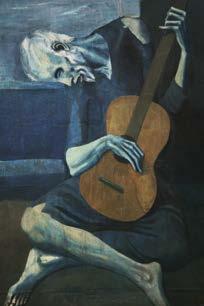
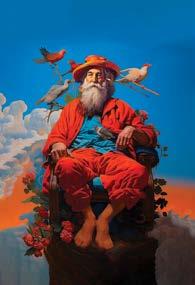
ashevillepoetryreview volume 30, no. 1, 2023 • issue 32 POETRY Carol Alexander • Paul Allen • Rebecca Baggett • Tina Barr • Joseph Bathanti Brook Blaylock • Emma Bolden • Bruce Bond • David Bottoms • Bill Brown Fred Chappell • Wyn Cooper • Rachel Dillon • Lisa Katz Duncan • Richard Harris Stephen Haven • David Havird • Brian Patrick Heston • Je erson Holdridge Mike James • Margaret M. Kelly • Abigail Mengesha • James Norcli e C. Mikal Oness • Barbara Perry • Stella Vinitchi Radulescu • Doug Ramspeck Diane Seuss • Richard Tillinghast • Rebecca Timson • Marisa Tirado Robert West • Walt Whitman • Martha Zweig SPECIAL FEATURES Ernest Suarez: Rearranging the Scales: An Introduction to A Scrap in the Blessings Jar: New and Selected Poems by David Bottoms J. W. Bonner: This Sunlit, Pulsating Life: A Review of A. E. Stallings’ This Afterlife Angele Ellis: Birds of America: Poets George Looney and Michael Simms Reflect on Nature, Loss, and the Inevitable Passage of Time Keith Kopka: A Commitment to Her Essential Work: A Review of Taslima Nasrin’s Burning Roses in My Garden Suzanne Cleary: Traveling with Poets: A Review of Richard Tillinghast’s Blue If Only I Could Tell You and Jennifer Franklin’s If Some God Shakes Your House 2023 WILLIAM MATTHEWS POETRY PRIZE WINNERS Selected by Diane Seuss Kate DeLay: Repentance Rodney Gomez: Tableau With Tarantella, Public Housing, and Underwood Ham Jeanne Wagner: Penelope REVIEWS OF NEW BOOKS BY Michael McFee, Jonathan Minton, Katherine Soniat, Linda Parsons, Catherine Pritchard Childress, Ross Gay, Kenneth Chamlee, Marie-Claire Bancquart, Margaret Mackinnon, Ed Madden, Sam Barbee, and Mary Makofske $13 asheville poetry review volume 30, no. 1, 2023 • issue 32
poems KEITH FLYNN
The Skin of Meaning
the break of the lines, the word choices, punctuation and stanza order; what we take away is as important as what we leave. “All art,” said Picasso, “is the elimination of the unnecessary.” Just as a foggy or repetitive tone can become an emulsion, or a caul over the head of the poem, the beats and arpeggios of breath inside the poem rescue it from monotony by their variance. If you think of each word as a note, then the language is like an enormous piano and wherever it is, the poet has a medium, just as the painter has his variety of colors and the sculptor the physical presence of wood or stone. On the poet’s keyboard, each note or word is also a breath inside the reader and refers to or stands for something that is not physically present and that is not itself.
A poem should be a long piece of angular hungry momentum, a flow with authority, admitting no impediments. It is important to acknowledge inspiration’s worth here; we have to let our emotions have free reign at the outset, just as there are necessary obstacles that enable one to pause and make changes, to alter and improve the words. To deny the existence of the obstacle or its worth or to give it too much importance, is to empower it or make it sacred. Most writing impediments are either technical problems obstructing the poem’s flow, or psychological problems blocking the writer from his recognition of the true impulse. Not the first impulse, mind you; first thought, best thought is a worthless conceit. The best thought may not be the first one available. And a lazy writer is as apparent as a desperate salesman; neither one can close the deal.
Poetry is the language of hidden things in commerce with one another. Cocteau said, “all poets are mediums and workhands of this force that inhabits them.” It is the hunt for the poem that should challenge us, shaping time into orderly forms, though it may seem sometimes like herding fleas into a drinking glass. But poems are non-logical leaps forward that are proven durable by working backward toward known principles. Only the rebellious can do it. And there is a rebel lurking in every successful poet.
What technical advice do you have for those thinking about starting a literary journal?
I think my advice from a technical perspective would not be worth much, but I can advise new editors to find their place in the communities they inhabit. Technology is not an image of the world, or its mirror; it is a praxis whose purpose is to change the world or cast it aside. “Literature,” said Boris Pasternak, “is life with all the boring parts removed.” Poetry is our best vision of the world as it exists and what is good is always rare. Most of our thoughts of poetry are made of memories, or a world view filled with snapshots that string out along the clothesline of our consciousness, but memories deceive, and poetry, like all living things, must change as memories do, in order to survive.
To be supported by your local community and its writers is the place to start. Develop relationships with performance venues, bookstores, university writing programs, local libraries, and the scattered writing groups that meet in secret to encourage one another. Finding distribution for a fledgling journal is key if you are going to be in print, but if the local readership is strong enough, your immediate needs can be met as your new charge begins to find its footing.
Is there anything that you would like to add, perhaps discuss the relationship of the editor to the journals they manage, or why do you continue to do it after so many years?
All editing is subjective. When we place ourselves in the hands of an editor, no amount of background, biography or backslapping will help them decide to publish or reject a poem. There is only the poem in front of them, and it is as naked or sophisticated as the day it was born. The decision an editor makes in those moments is as arbitrary as possible, and yet, contains a million other factors, dependent upon his or her mood, the weather, the amount of work, the themes of the issue, conscious and unconscious stylistic bias, their last meal’s agreeable digestion, the time that it took to read the mountain of poems in the first place, their children’s piano lesson, the lack of a title, the length of the title, the worth of the first line, the color of the paper stock, the unmitigated gall to send a multi-page biography, the fact that it’s another damned sonnet, the fact that it’s the perfect damn sonnet, the lack of a shower, bravado, pitch, vocabulary, humility, sweep, vision, humor, shape, rhetoric, form, diction.
The action of the editor, however quixotic, is riveted with love. Winston Churchill said, “We make a living by what we get. We make a life by what we give.” The best poems stop us in our tracks, shut us up, make us read the poem again and again, because it has suddenly opened another room in our brain that was hidden to us before. I have been submitting my own poetry to other editors for their appraisal since I was eighteen years old and have known from firsthand experience the pain of that rejection letter. So, I treat prospective contributors the way I would want to be treated myself, and I hope my process bears the quality of tenderness.
95
FIFTEEN RULES TO WRITE BY
BY keith flynn
1. Always allow your true nature to be expressed and apply no limitations to your beginning flow. Let come what may, as much as possible. “The road of excess leads to the palace of wisdom.” —Blake.
2. Inspiration is fleeting. Technique is eternal.
3. “Compose aloud: poetry is a sound.” —Bunting.
4. Music is the universal language because it is mathematical. Always know the number of beats in your line, the number of lines that want to be a stanza.
5. Never fall back on cliche, or use any metaphor, simile, or other figure of speech that you have ever seen in print.
6. Never use a long word when a short one will do. Scientific terms are rarely short, but have their purpose if they do not have to be explained. Never explain, never apologize, never withdraw.
7. Examine every sentence for more active verbs. Never use the passive where you can use the active.
8. Clear your poem of abstractions. Never use an abstract concept when a concrete image will do. “No ideas but in things.” —Dr. Williams
9. Fear gerunds, participles, adjectives that bleed your nouns of energy.
10. Beware the artificial music of prepositional phrases. Remove them when you can.
11. Give a poem the distance to speak clearly and never send a new poem to be published. Compose in a flood. Edit in a trickle.
12. Cut out every word you possibly can and realize that every line is a muscle in the body of the poem. Be muscular.
13. Less is more. Repeat number 12. Condensation is the final frontier.
14. Admit no impediment. A poem must flow with authority. Remove all obstacles, technical, psychological, or musical.
15. Rhythm loves proximity. Balance all like sounds for greatest impact. Avoid syncopation unless that is your goal. Variance in rhythm creates surface tension, propulsion and momentum.
P.S. Start the poem with action and leave it in motion.
96 BLUE MOUNTAIN REVIEW APRIL 2024

UCLA WRITER’S EXTENSION PROGRAM’S MICHAEL JANN
bY CLIFFORD BROOKS
What is the childhood moment that inspired you to write comedy?
I remember being ten years old, and my Mom locking herself in the bathroom, so she could take a bath and escape her seven children, for a few minutes. On the tv downstairs, a Bob Hope comedy special began. I knew she loved Bob Hope, and I wanted her to love me, too. So, after each joke, I ran upstairs, and repeated the joke to the closed bathroom door. And, I would hear her laugh. I’d ask her why it was funny, and she’d explain it to me. Then, I’d run back downstairs for another joke, and run back up, and so on for his entire monologue.. Decades later, I got that gig, writing the monologue for Jay Leno. Mom was very very proud of me.
How did you find a balanced love life in the madness around us?
I met my dream girl online, and I have no doubt that being a comedy writer helped me there. Comedy writer sounds nothing like “axe murderer”. Also, a lot of guys are kinda cavemen when it comes to communicating, especially if they have to type their short, boring answers, and not grunt them. For me, it was perfect.
What is a major misconception about your vocation?
Some people think comedy writing is fun and easy - a bunch of funny people sitting around a big table making each other laugh. It’s actually very hard work, and more solitary than you might imagine. But, it is true that comedy writers are all tall, sexy and devastatingly handsome.
97
an interview with
What’s a question you’ve always wanted to be asked, but never have? (What’s the answer?)
I’ve always wanted a beautiful waitress to ask me if she could sit down, and join me for dinner. It hasn’t happened yet, but I remain hopeful.
What drew you, and draws you, to teach for UCLA Extension Writer’s Program?
It’s so fun. There’s a magic moment that only teachers know about, when you see the light come on in a student’s eyes. They suddenly get “it”. Just between you and me, I would pay UCLA to let me teach. But, do not tell them!
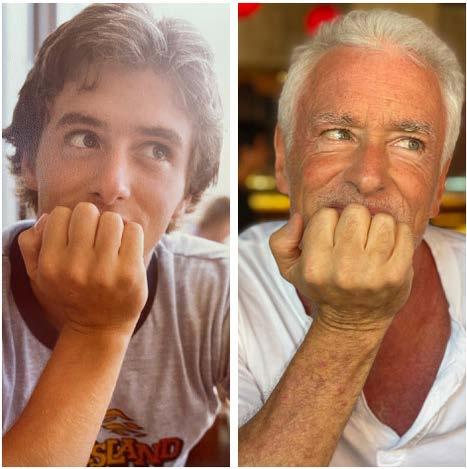
BLUE MOUNTAIN REVIEW APRIL 2024
REVIEWS
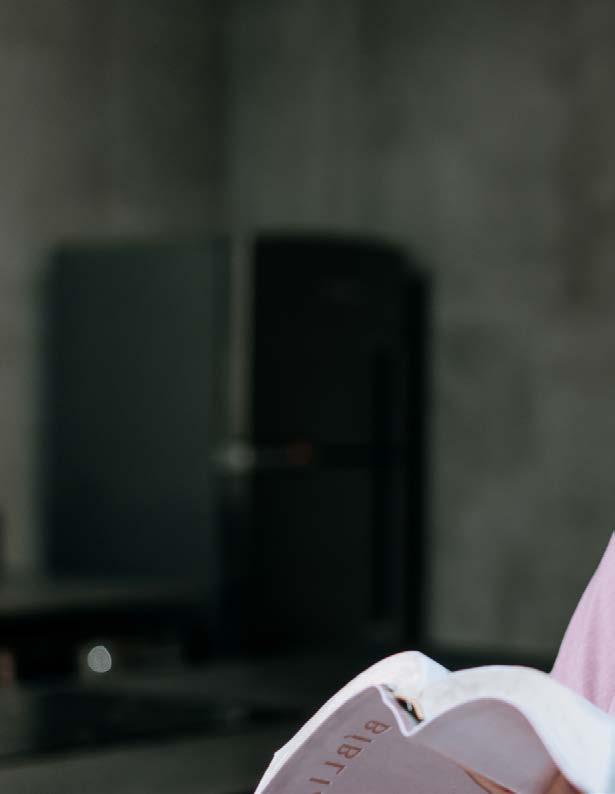
REVIEWS

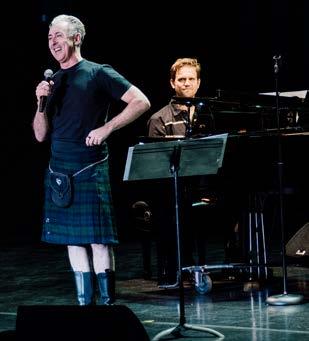
IPERFORMANCE REVIEW
A GUIDE TO ALAN CUMMING’S NEW CABARET SHOW
REVIEWED BY judy kirkwood
t seems as though movie, theater, and television actor/performer and proud-to- be-gay Scottish actor Alan Cumming is everywhere. Known for his over 500 performances as the Master of Ceremonies in the musical Cabaret and Eli Gold in The Good Wife from 2010 to 2016, Cumming is currently starring as the host of The Traitors, an American reality television series now in its second season streaming on Peacock. He has won two Tonys, a BAFTA, and been nominated for and won awards in various categories for numerous projects over decades.
Cumming’s new cabaret show Uncut, which I saw in April in Ft. Lauderdale at the Parker Playhouse, is tremendously entertaining and stimulating, hilarious, and poignant. It also has some of the most unusual content to be served up on the stages of small theaters in coastal Florida, the Hudson Valley, and other intimate venues to come—stories about his, well, penis.
The theme of Uncut, Cumming explained at the beginning of the show, is about being your authentic self. One aspect of that for Cumming is the fact that he is an “uncut” man, meaning intact, meaning uncircumcised, meaning his penis has a foreskin, meaning that element of his body is as natural today as it was the day he was born. But he had the advantage of not being born in this country, which is the only technologically advanced country in the world that routinely circumcises baby boys for no reason other than conformity to a cultural cosmetic ideal.
In between energetic and searing vocals--including an Abba mash-up and the classic “Take on Me”, the powerful song “Pluto” (a showstopper), “You’ll Be Back” from the musical Hamilton, and contemporary songs by Billie Eilish (“What Was I Made For”) and Rihanna (“Umbrella”)—and stories of theater gossip and personal reminiscences of his childhood, Cumming revealed what it was like for him to come to America at the age of 30 as an uncut man. Surrounded by intact penises in Great Britain and Europe, Cumming was often puzzled by the most common response to his penis in America— variations of “WHAT IS THAT??!!”
In fact, the natural intact penis is so unknown in the United States that Cumming even offered a viewing to the make-up woman who painted a temporary tattoo swastika on his butt cheek before every performance of Cabaret, providing an “Aha” moment for his friend. “She thought it would be more like a waste-bin situation where you step on a pedal to make the foreskin pull back,” Cumming related to the Uncut audience. She’s not alone since intact penises historically are not even shown in United States medical texts, which only feature the circumcised version.
Woven into Cumming’s repartee were the benefits of having a foreskin and the bold statement that circumcision is genital mutilation. At one point in the show, he asked for all the men in the audience who were uncut (who still had their foreskins, present at birth in all male mammals) to raise their hands. As expected in a South Florida crowd near
101
UNCUTANDUNFILTERED
Boca Raton, where everyone and their dentist is Jewish, not a lot of foreskins in the house. A few people may have been offended, but no one left. After all, Alan Cumming is known for playing the provocateur in his various roles, and challenging people to think about exactly what circumcision entails is consistent with the theme of Uncut
The entirety of Uncut fits the cabaret format perfectly, where the artist/performer can talk about serious things one second and hilarious the next; turn rowdy encouragement and applause from the

audience into silent contemplation of the connection of souls. Uncut is so powerful—whether you come for the songs, stories, or just to see Cumming in his element—because it is above all a shared experience.
As the co-author of a memoir by Marilyn Fayre Milos, “Please Don’t Cut the Baby!” about the beginnings and evolution of the intactivist movement to end routine medically unnecessary circumcision of infants in the United States, I was thrilled that Cumming brought up a subject few celebrities would touch. And that he educated people about it in both a serious and funny way. He even gave a shout out to Intact America (intactamerica.org), an organization that educates, advocates for, and empowers people to have the conversation about the risks of circumcision (male genital cutting) and the benefits of remaining intact.
After the show, I went backstage to meet Alan Cumming and thank him for an unparalleled evening of magic. I gave him a tote bag from Intact America’s new Skin in the Game (skininthegame.org) awareness campaign that proclaims Circumcision Cuts Through Us All. And a tee-shirt that promoted Foreskin Day, which was April 4 this year, with the theme of “F is for Foreskin.” “But it’s too late for me to wear it,” he said.
“Are you kidding?” I replied. “You can wear it every day because you have a foreskin!”
Performances of Uncut pop up quickly and are not scheduled far in advance. Pianist and musical director Henry Koperski provides a seamless transition between song and story; his calm and sweet presence is essential and strangely comforting during Cumming’s high energy performance. If Uncut shows up anywhere near you, GO! It will not only touch your heart, it will open your heart.
ABOUT Judy:
Judy Kirkwood, an award-winning journalist and author based in Delray Beach, Florida, works as a developmental editor for Lucid House Publishing, which will publish her poetry book “Twirling in a Beam of Light” in the fall of 2024.
102
Photo credit: JD Manarang for WTLGO Magazine
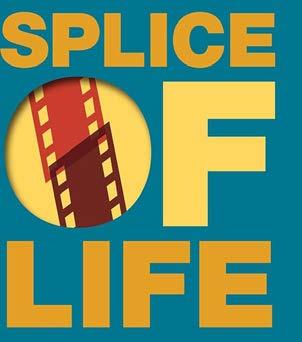
SBOOK REVIEW
CHARLES JENSEN’S ASPLICE OFLIFE
REVIEWED BY MATTHEW SCHMIDT
panning the awkwardness of adolescence through a more assured middle age, Charles Jensen digs into his past relationships with queerness, partners, and, of course, the cinema. As a fellow cinephile, this book was not only fun, it was enlightening. Each of the 13 essays pairs a lived experience with a film. For example, the opening essay, under the aegis Political Satire, contrasts Mean Girls with Jensen’s time in high school—cliques, growing pains, and selfishness on full display. Growing up queer in rural Wisconsin is, to put it mildly, a struggle, and yet Jensen finds himself exactly where he doesn’t want to be: spotlit and in the running for Homecoming King.
Jensen doesn’t spare himself in recounting his actions and how he came to better understand them in considering what the storytelling of movies can teach us. Even though I’d watched 12 of the 13 films, I was surprised by Jensen’s takeaways from them, particularly his reading of characterization. His parsing of the main characters in the Sexual Thriller Fatal Attraction was shocking—I realized I hadn’t been taking the film seriously, blind to its rhetoric, foolish in my understanding. Furthermore, Jensen’s experiences are varied, ranging from learning ballet to participating on Jeopardy! In fact, I’m still not over the Film Noir essay on Shadow of a Doubt—a startling, too-close-to-home look at one of Jensen’s past boyfriend’s family. As this memoir unfolds, Jensen, like movie protagonists, is framed as hero, villain and everything between.
Questions for Charles:
With an abundance of options available, how did you pair a film with a particular time in your life?
I think each film had a basic resonance that drew me to it initially. With THE DESCENT, for instance, the main character continues to work through the grief of her husband’s death, and I found the caves she and her friends become trapped in a relevant metaphor for the confusing (and sometimes scary) experience of grieving. GET HIM TO THE GREEK made sense at first because it was about going on a trip with a narcissist, but it was only after I started writing about it that I realized its dominant theme of family--the ones we inherit and the ones we build. My initial impulse for the essay on visiting Tombstone, Arizona, was to use WYATT EARP as the film--but surprisingly it didn’t fit as well as WESTWORLD did, because that second film is rooted in the desire to commit and glamorization of violence, which connected better. Aside from one or two wrong turns early in the process, the films I picked stuck pretty well, and they did what I needed them to do.
103
The essays interweave distinct sections on a film and in your life. What determines the pacing of sections within a given essay, including balancing the separate strands?
Again, an intuitive part of my writing process. Most of the essays were drafted once I had the films squarely in mind, and I alternated back and forth between them as I wrote. I looked for points of climax in both sides of the story and used those as the moments to shift to the other narrative, and as much as possible I tried to make sure there was a link between the end of one section and the beginning of the next, whether that was an image, a feeling, or even a plot point. The essays had to pivot effectively to work. If the gaps between my story and the film were too wide, the reader wouldn’t follow and might draft away. If they were too obvious or too literal, the reader would get bored. I think there’s an art to those “lyric” gaps and using them has been part of my poetry writing for a long time, so they feel comfortable for me in prose.
Having a background in film studies, why did you decide not to use film theory or dissect film techniques more heavily (i.e., camera angles, lighting, shot distance, cutting, etc.)?
Not to be glib, but space. I had only so many words I could devote to each side of the essay, so I had to be judicious about what I covered and what I left out. Film theory may not be front and center, but I think my readings of the films are in conversation with things like feminist film theory, psychoanalytic frameworks, and film history. I was also conscious of writing for lay readers. If I got too technical or too scholarly, it wouldn’t have served the overall project of the book. I’m using the films, in part, to show that all narratives are constructed for a purpose--even my own memoir sections in this book.
ABOUT MATTHEW:
Matthew Schmidt’s poems have been published in Pleiades, The Seattle Review, Hawaii Pacific Review, and elsewhere. He is an associate poetry editor at Fairy Tale Review and the Co-Founding Editor of the Iowabased literary editing and educational nonprofit 1-Week Critique.
ABOUT CHARLES:
Charles Jensen (he/him) wrote Splice of Life: A Memoir in 13 Film Genres, forthcoming in May 2024 from Santa Fe Writer’s Project. His most recent collection of poetry is Instructions between Takeoff and Landing. His previous books include two collections of poetry and seven chapbooks of cross-genre work. The City of Los Angeles Department of Cultural Affairs designated him a 2019-2020 Cultural Trailblazer. His poetry has appeared in American Poetry Review, Crab Orchard Review, The Journal, New England Review, and Prairie Schooner, and essays have appeared in 45th Parallel, American Literary Review, Exposition Review, The Florida Review, and Passages North
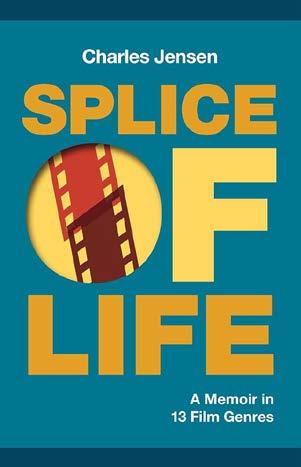
BLUE MOUNTAIN REVIEW APRIL 2024

https://www.visitathensga.com/athens-beer-trail/


Atlanta & Nashville CREATIVE CRAFT COCKTAILS & CIGARS PROGRAM IN A 1920’S SPEAKEASY ATMOSPHERE www.redphonebooth.com www.redphonebooth.com
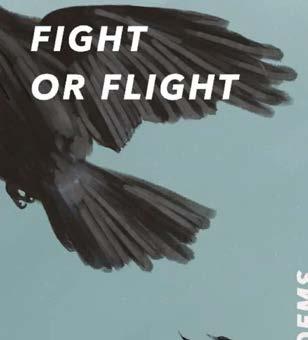
ABOOK REVIEW
ANDREW MCFADYEN-KETCHUM’S FIGHTOR FLIGHT
REVIEWED BY JENNIFER YANEZ-ALANIZ
ndrew McFadyen-Ketchum’s award-winning third book of poetry, Fight or Flight, reveals an unfiltered glimpse into the human condition. Divided into three distinct sections, “Forgiveness,” “The Unborn,” and “Beautiful Dreams,” the collection survives through a landscape of emotional upheaval deeply rooted in the instinctual human responses of confrontation and escape. McFadyen-Ketchum employs the symbolism of birds to mirror the human spirit›s oscillation between enduring hardships and seeking the solace of departure. This is exemplified in poems like “A Trio of Crows,” where crows become dual aspects of protection and predation, echoing the internal struggle between resisting and retreating. Similarly, “Luck” contrasts the desire for life with the temptation of death, with peregrine falcons representing the survival instinct amidst peril. In the hauntingly beautiful “Raising the dead,” McFadyen-Ketchum revisits the idea of death in his most suffering moments, unearthing the profound depths of despair and longing. This is acutely felt in poems where the imagery of birds and nature serves not only as a backdrop but as a resonating reflection constantly echoing the poet’s internal struggle of survival versus surrender. McFadyen-Ketchum, a master of his craft, skillfully layers, recasts, and arranges words to seamlessly convey images and ideas, creating an immediate connection with the reader. In the final section, he compassionately brings readers into a healing space, enriched by the mercy offered by words, Ndee, Home, Inupiaq, Galaxies, Ndee, Truth, Inupiaq, Lover, Ndee, Son, Inupiaq, Siliuna! This collection is truly a survival guide.

107

www.autismdelaware.org
www.autismdelaware.org
FICTION

FICTION

LAUNDROMAT SALVATION
by BEN M C FRY
“Human
decency is not derived from religion.” —Christopher Hitchens
For the third time this May, W.T. McCrary got saved at Pastor Otho’s Tent Revival down at the Wishy-Washy Laundromat. Like slivers slid from a lint-ridden pile of quarters into machine slots in a swap for clean clothes, a love offering plopped in a plate bought him a sin washing at the sprawling canvas tent, patched and stitched over decades of use. W.T. needed the tent revival, for Pastor Otho would dunk him in holiness anytime he wanted. He had no qualms about multiple anabaptisms, not like the other churches that W.T. had visited.
Trinity United Methodist down on Second Avenue sprinkled his head just once, and they even made him go through confirmation classes first in a hot upstairs Sunday school room. But when he asked for another round soon after, the preacher said that his theology forbade repeated baptisms in the same church. The case was identical with First Baptist on Clocktower Hill. They didn’t mind redunking him once as an adult with soul competency, seeing as how the previous christenings didn’t count in their eyes, but the minister said another would annul the one he had just done unless he was a true apostate, and W.T. was no backslider. Even the charismatics at Full Gospel Holiness Pentecostal, way out in the boonies on the banks of the Oostanaula river, wouldn’t give him a second immersion in that river water, no matter the tongues in which he spoke or how many times he fell out in the spirit.
In lieu of baptism, prayer or confession were not enough, for W.T. most fervently believed that water must be involved to get stainless. The sin had to be both figuratively and literally washed away, not just whispered away with words into the yonder unknown. W.T. also most fervently believed that the baptismal water had to especially be moving for the cleansing to take proper effect. River water assuredly flows, but even Wesleyan sprinkled water washes away sin when wiped. Pastor Otho had rigged up a pool pump and filter to keep the water clean and streaming in his baptistry, seeing as how many of the unwashed he hoped to process. For W.T., prayer or confession just couldn’t get him the immaculate feeling that a holy washing could. He just somehow deep down believed that baptism was what kept him cleanest when he needed it most. It was a personal theology, if such could exist. He needed to be washed regularly in the blood of the Lamb. And he had good, good reason to, which he could thus far not enunciate.
What made it all the harder for W.T. to argue for more baptisms was his impairments. Not only was he mostly walker bound, meaning he had to be steadied into the baptismal baths, pools, and rivers, but he also had significant difficulty with speech. The stroke the week after he buried his wife took a good bit of the use of his legs, palsied his hands, and distorted his speech. W.T. wasn’t too sure that this wasn’t the reason that some of the churches were reluctant to work with him in the first place. When he tried to articulate an argument for being baptized again, only pieces of what was so clear in his head could emerge in his trembling and truncated voice. He stuttered, slurred, and couldn’t sound S at all. And no one would take the time to try to listen to him. They were so quick to dismiss him as some senile elder living out a delusion. He was just a burden wanting baptism, a man craving intimacy with the Holy Spirit but who could not receive momentary fellowship with a minister.
He felt the same way about his home healthcare. Attendants didn’t last very long, and it was difficult to get to know them
111
when communication was so encumbered and time with them so short. Norrisha always made sure his pillows were fluffed and that his soup wasn’t too hot, but she kept showing up later and later for her shift, and one day she didn’t come at all. Samara was punctual, but she fed him like a sloppy infant, and she hated, hated his dachshund Budroe, so much so that she left because of him. Jakayla was good with the food and the dog, but she would always ask to leave early for her second job, which eventually took her from him when they hired her full time. W. T. just never got time to know any of them, to have at least one friend in this world since all the others he knew had already passed on like his wife.
The home healthcare attendants were all reluctant to take him for his attempts at rebaptism too, even when he printed the directions to the church out. They’d ask why he wanted to go again, and he would shakingly point to a loaded shelf whose most prominent feature was an extra-large family Bible and try to explain with his best speech, “Buh..Kuh.. ov R..Ruth.” Those that knew the Bible would puzzle over what the Book of Ruth had to do with getting baptized all over again, but they would eventually acquiesce out of impatience or indulgence, as would those who were ignorant of Scripture altogether.
The ministers at the churches gave the same looks of bewilderment when he said the phrase too, “Buh..Kuh.. ov R..Ruth.” They could find no connection with the Book of Ruth and baptism at all, even symbolically, and they would not engage W.T. in deeper theological discussion since they found it too cumbersome. “Your people shall be my people, and your God my God” just didn’t jive with a double dipping: He had no living kin or kith with which to somehow bond over baptism. He was already testifying to his commitment to the Lord through any initial baptism and could thus not show more devotion, as Ruth did to Boaz. One lay-preacher even quickly re-read a summary of the Book of Ruth to make sure he didn’t miss something that W.T. had found. None could understand. Most just chalked it up to W.T. forgetting that he had been baptized in the first place because of his disabilities, even though his mind was sound and sharp, and the remainder had to be at the hospital or funeral home in fifteen minutes and just didn’t have the time to sort it out. And all except Pastor Otho refused to give him another baptism after the first, and Otho only questioned whether money was in the plate.
After Alivia worked her notice, W.T. was in danger of being left without home healthcare, but as fate would have it, Cordelia signed on. From the moment she walked in, W.T. knew Cordelia would be different. She carried herself with esteem but also humility. Budroe immediately ran to her but didn’t jump on her; he just squatted and waited for the petting that she dutifully gave. Cordelia warmed his soup just right, and she fed him with all the dignity that one could muster in such an act. She asked if he would like his pillow fluffed rather than just doing so. When he asked to be taken to the churches for baptisms, she made him say only once and only the first time, “Buh..Kuh.. ov R. . . Ruth,” and then she took him on, no further questions asked. Cordelia was such an advocate that she would even try to argue with ministers over W.T.’s attempts at rebaptism, but she had about as much luck as he. They just wouldn’t take the time to listen or to understand. He was just another old invalid with crazy ideas.
But unlike the preachers, even Otho, Cordelia talked to W.T. She got to know him. Through tediously slow exchanges, Cordelia learned about W.T. She learned he had children and grandchildren, though deciphering their names was tough. It seemed like his oldest boy was Joseph, though because of his lack of S, he pronounced it “Jo…eph.” She heard a little about his career. He was an English teacher at a local high school and likely did that most of his life. His favorite work to teach was apparently “The Great Gat…by.” She discovered a few things about his hobbies. He seemed to enjoy working wood and would build fixtures for the house, especially “...helve…” to keep his many books on. One day, she picked up a picture that W.T. kept next to his family Bible on one of those shelves. She remarked how beautiful the woman was. She asked if it was his wife. W.T. nodded as best he could. Though small, it was his favorite picture of her in her youth. He said, “Ye.. Yeah that i.. R..Ruth. I..I got tuh be alway cl..clean ..oh that I..I can ..ee her again in the g..great here..after. I got to wa..h way any lil ..in I get. Let go..go to Otho.” He held out a trembling hand and pointed at the picture Cordelia was holding: “Buh..Kuh.. ov R..Ruth.”
112 BLUE MOUNTAIN REVIEW APRIL 2024

ABOUT BEN:
A lifelong resident of rural Northwest Georgia who teaches at an urban public high school, Ben McFry’s perspective cuts across many strata in his interactions with folks of all manner and ilk. Ben enhances that perspective through his teaching at a small Christian college and at a public community college, remembering his life abroad, speaking fluent German, and holding a PhD in comparative literature from UGA. His work has appeared in The Comparatist and is forthcoming in The Headlight Review. He hopes to capture the complexities of Southern living and dying in terse prose.
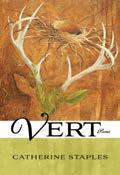
VERT: POEMS
by Catherine Staples
GHOST FOREST: POEMS
by Jack Bedell
All manner of ghosts haunt the poems in Jack Bedell’s new collection, GHOST FOREST. From memories of lost loved ones, to the ghosts of heroes, to the remnants of an eroding coastline, these spectres fill Bedell’s lines with beauty and wisdom to help us all move into the future. Sometimes through memory, sometimes through visitation, sometimes through pure fantasy, Bedell’s poems invoke spirits to help us see the world as it needs to be seen, or put back whole our broken pasts to make moving forward possible. (Feb 2024)
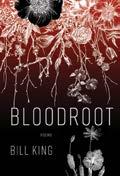
BLOODROOT: POEMS
by
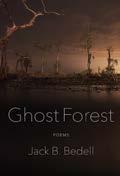
Bill King (1965–2023) Co-Winner of the 2023 Weatherford Award for Poetry
The poems in Bill King’s first full-length collection, BLOODROOT, articulate a life grounded in the Blue Ridge and Appalachian Mountains, and follow the root of a life nourished by and inseparable from garden soil, mountain rivers, and the hearths and kitchen table of home. A mature father’s sense of home and family take on depth and gratitude after a cancer diagnosis and chronic illness. King’s poems offer a language for how to love a world we must, ultimately, leave. (Oct 2023)
OLD GODS: POEMS
by Clifford Brooks
Through the redemptive power of words, OLD GODS confronts personal battles of addiction, autism, heartbreak, otherness, anxiety, and escapism through journey poems. Bolstered by faith, family, friends, and vocation, the poet’s telling is ordered and meticulous. Here, readers will find that seeping wounds can be healed only by facing life head-on, not getting in its way. (Sept 2023)
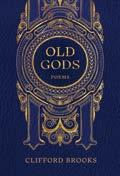
Catherine Staples grew up in Massachusetts and it’s there, in New England woods, meadows, and Cape Cod coasts, that the loss of her brother plays out as a quest across space and time. Place is at the heart of the transformation of loss. So, too, are myth and the lives of New England’s early naturalists and Transcendentalists. Henry David Thoreau’s narrative echoes and enlarges hers. (May 2024) Use coupon code MUPNEWS online for 20% discount off your entire order or call 866-895-1472 toll-free —Shipping charges will apply—
114 BLUE MOUNTAIN REVIEW APRIL 2024 www.mupress.org
www.mupress.org
YARD FRIENDS
by Brian Belefant
Now I’m not all that bright, so it was a long time before it ever occurred to me that it ain’t normal for a house to have a yard full of cement bird baths, statues, figurines, and columns. I mean, yeah, pretty much every neighborhood has a house like that, but that don’t make it normal.
In our neighborhood, that house was owned by the Papadopouloses, George and Irena. And it was next door.
You would have thought the Papadopouloses thought that their yard was finished, the way it was packed to the gills, but it never was. Every couple of weeks Irena would come home with a new figurine––a ceramic bunny, an angel––and she and George would proudly place it in a spot where you’d never know there was a spot until the figurine came home.
And then it would disappear, subsumed by the multitude of other statuary and figurines that overwhelmed the yard.
Interior designers will tell you that you need to have a focal point––a singular element that draws the viewer’s eye, giving them something to appreciate. I learned that off of this decorating show that Sanjay used to watch on the TV at the halfway house I lived in after I got out of Juvie and before I got me a job in the mailroom at Smith, Keller, Smith, and Smith. But that was way after I lived next door to the Papadopouloses.
I was telling Tony about the house this one time and he said that you don’t have to have a singular focal point. You could make the whole yard the focal point and I guess that’s what George and Irene were going for. Every added element, every new cement bridge, family of ducks, and sundial would simply be one more reason to appreciate it.
George was short and squat and his black hair was thick and dark and rose from the top of his head like the grass in everybody’s yard except his. And he had a mustache, the bushiest, most spectacular mustache I have ever seen. I can’t grow a mustache, even now, but if I ever did, that’s the mustache I would want to grow.
Irena was tall and thin, easily a head taller than George, but the remarkable thing about the two of them was that they looked so much alike. Except for the mustache. Hers was kind of wispy.
They both spoke English with their hands more than their mouths and with accents that were as thick as the lenses in the matching black-framed glasses they both wore.
Like I said, I’m not all that smart and I was even stupider when I was eleven, and before you come down on me for being unkind to my younger self, let me explain: I wanted an Estes rocket. You know, those kits that came with the cardboard tube and the plastic fins? You put the thing together and you use a real, live rocket engine to launch it hundreds of feet into the atmosphere. When I told Mom and Dad about the Estes rocket at dinner one night, they made it clear that no way (in hell, was how Dad put it) were they ever going to get me one of those.
115
“But it’s only $12.99,” I explained. I’d priced them at the hobby store the last time I was at the mall.
“Which is not germane,” he replied.
Dad was a lawyer and he used a lot of words I didn’t know, but I picked up a little legal theory and that night, while I lay awake, replaying what he said and wondering how I could have made it come out a different way, I found opportunity––a loophole, you might call it––in the categorical rejection. They weren’t going to get me one, sure. But that didn’t mean I wasn’t going to get one for myself. All I needed was $12.99 and a ride to the mall.
First thing the next morning, I pulled the lawn mower out of the garage and wheeled it over to the Papadopouloses’.
George and Irene answered the door in unison––they did everything in unison––and I explained that I was looking to make some money and could I mow their lawn?
Which, of course, I couldn’t.
See? Now do you understand why I say I wasn’t a very bright eleven-year-old?
This led to an animated exchange between George and Irena in Greek and gestures, in which they tried to work it out why their eleven-year-old next-door neighbor was standing at their door with a lawn mower. Eventually, Irena spoke for both of them. “It is good you show… what is word?” She turned to George for help, but he simply smiled at me. “It is good you show that you want to work,” she finally said. George nodded. I nodded back, hopeful. “We have not lawn, but put machine away and we have job for you.”
“Awesome!” I said, “I’ll do anything!”
So I did. I rolled the lawn mower back to our garage and returned. I hoped that whatever the job was, it wouldn’t require actual work. I mean, I wanted the Estes rocket, but not so bad that I was eager to get tired in order to earn it.
When I got back, the front door was open and the two of them stood just as they had before. Only this time George held a bucket half full of soapy water and Irena held a cloth. “We will like you are cleaning our beautiful… what is word?” She turned to George again, but again, he simply smiled at me. “Yard friends,” she finally came up with. I turned to take in the task. It was like Heracles being told he had to clean out the Augean stables and I bet the look on my face was pretty much the same. I would have asked them, too, George and Irena, but we didn’t get to Greek mythology until eighth grade and it wasn’t until even years after that that Tony told me that just because George and Irena were Greek, they might not be exactly experts on the mythology that died out centuries before they were born.
“All of it?” I remember asking, probably with a little too much horror in my voice for a kid who just volunteered to do anything.
“Only until night,” Irena replied. George nodded in agreement.
Night. It wasn’t even nine in the morning and I’d just signed on for a 10-hour shift. But as Dad said more than once, “A contract is binding, so be sure you’re okay with the terms before you enter into one.” I didn’t do the thing where you make sure you’re okay with the terms, but I did enter into a contract, so with a sigh that the Papadopouloses were kind enough to ignore––in unison––I took the bucket and the cloth and set to work.
It really wasn’t hard. Basically, all I did was dip the cloth in the bucket and wipe down the yard friends, one at a time. And in doing so, I got to know each of them in a way I couldn’t have from next door. I wiped at least seven bunnies,
116 BLUE MOUNTAIN REVIEW APRIL 2024
fourteen butterflies, and two statues of Liberty (I didn’t wipe her crotch or her breasts because that would be a bad thing to do). There was a suit of armor almost as tall as me close to the front door and I wiped his crotch, though. The visor opened and closed, too, so I spent some time trying to decide which way it looked best.
The Papadopouloses had nine bird baths and all of them were full of algae. I wiped out the first one as best as I could, but the cloth got pretty gummy and I had to rinse it out.
I didn’t want to ask the Papadopouloses for another cloth or to sneak around their house, looking for a hose, so I took the cloth back to our yard and rinsed it out there. Then I wrung it out and came back.
When I did, I saw George and Irena standing in the picture window of their living room, both holding cups of coffee and watching. I wondered if they’d been watching me all morning.
At around noon, Mom came out. I suppose she figured I’d been watching cartoons all morning, which is what I did every Saturday, and when she finally came into the living room to check on me I wasn’t there.
“What are you doing?” she asked from the other side of their fence. I had no idea how long she’d been there.
“I’m working,” I told her.
“Do Mr. and Mrs. Papadopoulos know?” she asked. She could have seen them standing in the window.
“Of course,” I said. It was the first time I’d used that tone of voice with her and I could tell that it took her by surprise. Guess she wasn’t ready for me to go all puberty on her.
She left, then came back in a little while with a sandwich and a glass of milk.
“Thanks, Mom,” I said. “Could you just put it down over there?”
“Aren’t you hungry?” she asked. I was, but I hadn’t discussed breaks with the Papadopouloses, so I wasn’t sure if lunch was authorized.
“It’s okay,” I said. I’ll eat it in a while.
I didn’t. I kept wiping down statues of birds and books and columns and kittens, one after another.
It was close to 3:00 when I was done, which presented a problem. Night was still a good four hours away, but I’d run out of things to clean. I looked at the picture window and saw George and Irena, still holding coffee cups, still watching me. George checked his watch, which I figured meant I still had work to do. So I gathered up the bucket and the cloth and I started wiping down the fence.
When I was done with the fence, I did the mailbox. Then the door. Then the railing. And still the sun hung high in the sky.
I went into our yard one more time to rinse out the cloth and when I came back, George and Irena were standing in their yard, surrounded by their clean yard friends. Irena held a wad of money.
“You are finish?” she asked.
“Well, it’s not night yet.”
“Night?” the two asked in unison.
“You know. Night. You said I should go until night.”
The two did that thing again, where they flailed and discussed in Greek. Finally, I could see a realization dawn on
117
George’s face. “Night!” he said. “No night. Knight.” He gestured toward the suit of armor. “Only until knight,” he explained.
“Oh.”
I can still hear the way I uttered that syllable. I think of it as the sound of defeat. Acknowledgment of my limited intellect. I’ve done it since, in pretty much the same way, like that time when I asked Tracy Madison to come over to my place for dinner. Tracy was Mr. Harper’s secretary at Smith, Keller, Smith, and Smith, that ad agency I worked at when I got out of Juvie. I hadn’t had a lot of experience with women, but Tracy had a sympathetic look and I took the risk, hoping that if I were to be rejected, she’d do it gently.
She thought it over for a minute and said, “Why not?” So I spent the entire afternoon cleaning up my apartment and preparing a menu. I spent $14 on food, which meant I was going to have to walk to work for a week, but I figured that having Tracy over for dinner was maybe going to be worth it if you know what I mean and I think you do.
Tracy brought a bottle of wine and I suppose it made me fearless, or at least less fearful. When we’d finished eating and I’d brought out the lemon bars I’d picked up at the grocery store, I sat down and made myself put my hand on her knee.
She didn’t act surprised. “I should tell you,” she said, putting her hand on top of mine, looking directly into my eyes, “I have a boyfriend.”
“Oh,” I said then, too, exactly the same way. Accepting defeat.
I took my hand off of Tracy’s leg and even though she wasn’t finished with her lemon bar, I got her coat and walked her down to her car, then gave her a totally platonic hug and thanked her for coming over.
“Oh.”
Tracy never would talk to me again after that and when I told Tony about it, he thought it was hilarious, but I didn’t. He said that lots of times, what people tell you isn’t the same thing as what you hear, which I guess is exactly what happened with that word “night.”
“How much we owe you,” asked Irena, holding out the handful of money. We hadn’t discussed my rate, but I was prepared.
“Twelve ninety-nine,” I replied.
“Twelve ninety-nine?” she asked.
“Yes.”
She and George discussed and gesticulated a bit again, and then she shuffled through the money and handed me two bills, a ten and a twenty. “You take thirty,” she told me.
I took thirty.
Then I picked up the sandwich and the glass of milk and went back to my house, where Mom was at the door, watching me come home.
“So? How was work?” she asked. It sounded like the way she talked to Dad.
“Fine,” I said. “Can we go to the mall?”
118 BLUE MOUNTAIN REVIEW APRIL 2024
“Of course, Sweetie.”
At the mall I made a beeline for the hobby store. I paid for my Estes rocket with the two bills, confusing the old man behind the counter. It took him a while to figure out that he could give me back the ten and make change from the twenty.
I wanted to head straight back home, but Mom insisted we stop at the food court and get something to eat.
“I’m proud of you,” she said, although I wasn’t sure why. I didn’t really care, honestly, I was so hungry that I inhaled my burger and fries.
When we got home, the sun was just setting. I could see it glinting off of the Papadopouloses’ yard friends. Their curtains were drawn, though, and George and Irena were no longer standing in the window.
Mom headed for our house, but I went next door. As quietly as I could, I put the change in George and Irena’s mailbox. Then I ran back home to build my rocket.
119
#

ABOUT BRIAN:
Brian Belefant used to be good-looking, but now he has a dog, and not just any dog, but a friendly, goofball dog who loves everybody except Santa Claus. His short stories appear in American Writers Review, Magpie Messenger, Story Unlikely, Libretto, and Half and One. Brian is also an award-winning fine art photographer. His novella The Sultan of Garbage will be published in 2024 by Atmosphere Press. He’s currently at work on his second novel.
ESSAYS

ESSAYS

THE MAGIC OF CONNECTION
by ECHO MONTGOMERY GARRETT
After writing more than two dozen nonfiction books, I decided to join our son, Connor Judson Garrett, in Lucid House Publishing. My desire for our company was to attract diverse authors in a wide variety of genres with unique and important stories to share. I especially wanted writers with the ability to paint scenes with their words. Once you put such an intention into the universe, get ready.
Shortly after, I started with Lucid House during the pandemic, I heard from my dear friend Marcia Scaggs, who had worked for big advertising agencies before launching her own marketing/pr firm. She and her husband Larry, who we met in Marietta, Georgia, more than two decades ago, had sold everything they owned and bought one of those villas in Sicily that you sometimes see advertised as being for sale for a song. “I’m part of a book club made up of expats from around the world, and I’ve come across an author I think you might be interested in,” she said.
The manuscript was a cross-genre time-travel/ fantasy/suspense thriller/romance/historical fiction written by Andrea Faye Christians, a Welsh writer living in Sicily. I was gripped by her cinematic storytelling and wildly creative characters, especially her heroine Carla. When Andrea and I connected, she told me that she’d originally conceived the story line as a movie, but she thought it would be easier to write as a novel first. That became “Suspension: Time Binder Series, Book 1,” which won a Book Excellence Award for best paranormal romance. The follow-up, “Happenstance,” is slated for an October 29 release.
In 2022, Marcia reached out again on behalf of another author. “Would you be interested in a children’s book? I think you’d love what my friend Annie Wilde has written,” she said. Like Larry and Marcia, Annie and her partner Doug had left life in London behind and bought and renovated a villa in a neighboring Sicilian village.
I agreed to take a look and was enchanted. Annie’s series was based on bedtime stories she’d told her now adult children. After her move to Sicily, she’d found a box filled with her manuscripts and sketches of the characters as she envisioned them. She happened to mention them to Marcia, who shares my zany sense of humor and love of puns.
I am so glad Annie did. Her pitch-perfect story of how 90-year-old Emma Puff and her old dog Rusty navigated the magical transformation that made them young again was filled with antics to entertain children while also bridging the generation gap between older people and youngsters.
The only barrier was that we needed an illustrator, capable of capturing children and adults, animals, landscapes, and buildings. That is a tall order. Marcia to the rescue again. “Beebe Hargrove is an illustrator from California, who moved to Marietta during the pandemic,” she said. “She lives about a mile from you.”
Beebe had never illustrated a children’s book but had always wanted the opportunity. A graduate of California State Fullerton, she’d spent most of her career doing architectural illustrations, but she’d also led the mural arts program in King City, the small, diverse farming community where she grew up. After she showed us a series of sample sketches, we agreed we’d found the perfect illustrator.
The chapter book with 26 full-color illustrations geared to elementary age readers debuted in October 2023. Hannah Deasy, Annie’s daughter, an actress in London, narrated the audiobook that will be coming out this summer and distributed worldwide by Blackstone. "Rusty and Emma’s Big Shock: Emma Puff’s Secret Series" was awarded the Silver Medal for the prestigious 36th Annual IBPA’s Benjamin Franklin Awards for Young Reader (8-12) Fiction. Annie attended the ceremony in Denver on April 27, 2024. Big stuff for a first-time author and first-time children’s book illustrator. The
123
adventures of Rusty, Emma, and the gang continues in "The Magic Purple Potion", which comes out on October 1, 2024.
In 2021, my husband Kevin followed up on an industry connection by photographing Joseph M. Marshall III, a prolific Lakota author, historian, educator, and inductee of the Western Writer’s Association Hall of Fame. The following year, after I met with him in person in New Mexico, Joseph agreed to give Lucid House his new contemporary novels set on a fictional Lakota reservation in South Dakota. He also agreed to allow Lucid to publish his previous works to which he’d regained his rights.
"Sing for the Red Dress: Smokey River Suspense Series" is both a love story between university professor Dr. Gavin Lone Wolf and Washington DC lawyer Katherine Hill and a haunting narrative of the ongoing tragedy on Indian reservations of Missing and Murdered Indigenous Women (MMIW). I spent four days last October with Joe at the South Dakota Book Festival where he was a keynote speaker and served on a panel addressing the problem, which has largely been ignored by the media. The issue has been neglected for years by both the Bureau of Indian Affairs and the FBI, partly due to jurisdictional conflicts. In Joseph’s novel the fictional Smokey River Tribal Police Force decides to make a difference when they find the names of twelve Native girls who are thought to have been abducted for sex trafficking to oil field workers. During the event, I met several family members of women and girls, who had gone missing or been found murdered. I wept at several points as I listened to their heartbreaking stories.
The novel’s release date May 5 is MMIW Remembrance Day. The South Dakota National Endowment of the Arts is sponsored copies of Sing for the Red Dress to be handed out to attendees of a gala organized by Lily Mendoza (Lakota), a bookseller and distributor specializing in Native works, to benefit the Lakota families, whose daughters, sisters, and mothers remain lost or have been found murdered. The Rosebud Reservation in South Dakota where Joe was born has the highest number of missing and murdered women and girls. “Not one single one has been recovered alive,” he said.
In addition to writing 22 books (including the four contemporary novels for Lucid House with the other three slated for release October 1, 2024), Joe, who has acted in more than 50 movies and TV series, served as a consultant on Return to Lonesome Dove and Into the West, has written several screenplays. “I once got one of my scripts to Ron Howard. The feedback was that although he thought the storyline was excellent, it wasn’t ‘authentic’ enough. Our stories have always been told from the white man’s point of view,” he said. “Take ‘Killers of the Flower Moon.’ Once again, our story was told by a white man, produced, and directed by white men. The time has come for our voices to be heard.”
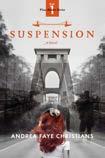
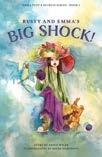
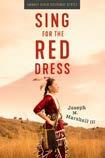
This essAY INSPIRED BY THESE WORKS
124 BLUE MOUNTAIN REVIEW APRIL 2024

ABOUT Echo:
Echo Montgomery Garrett’s most recent book collaboration is “This Penis Business: A Memoir” by Georganne Chapin, which she also published. She first connected with Georganne when Jeanie Ashford, her publicity person, contacted her on LinkedIn. Echo almost ignored the message and missed the entire project because she didn’t recognize the name, but looked at her profile and realized this Jeanie was her former editor-in-chief, who had hired her at Venture Magazine in New York City in the mid-1980s.

www.patconroyliterarycenter.org
https://patconroyliterarycenter.org
CONFESSIONS OF A DEVIANT READER
by MARILYN KRIETE
As a child in the 1960s, the best place to hide from my mother was behind a book. Reading was sacred in our family— luckily for me, a hardcore bibliophile by the age of ten. My upstairs bookshelf was small, but rich in company. Alice, Anne, Mary, and the March girls: these were the heroines who brought comfort, and not a little envy. My bedroom books, gifted by relatives, were approved by my mother, who’d grown up on the same fare. She’d even been named by her mother after Carroll’s bemused Alice.But if I really wanted escape, I’d head to the basement.
In the downstairs rumpus room—filled mostly with a pool table—sat a corner armchair, lit by a swag lamp, next to three rows of shelves. This collection was random: a set of 1927 encyclopedias, from which I researched school assignments; classics like "How Green was My Valley" and "Of Human Bondage" (a title that terrified me); a history textbook coauthored by my grandfather, and scores of other books of limited interest to my developing brain—though I examined every volume.
Two books became my obsession, and both have vanished in the years since I left home. One was called "Harriet"; the second title escapes me, though I still occasionally search vintage book shops in hopes of finding it. What I remember is how each book made me feel.
"Harriet" was the story of a mentally handicapped woman who’d been married for her money, and henceforth locked away while her husband cavorted with his evil girlfriend and squandered his wife’s inheritance. I had yet to hear tales like this in real life, and the adulterers’ escalating cruelty engrossed me.
The scene I most remember was a picture of Harriet, hair unwashed, dress disintegrating, sitting in filth and licking from her fingers traces from an empty tin of condensed milk—her sole, pathetic pleasure. I could taste the sugar and feel the jagged metal. Would she cut herself and slurp the blood in her hunger? Horror, yes. But shame was my strongest emotion: shame at my voyeurism, my compulsion to spy on Harriet’s abuse and not feel sorry for her. In secret, despicable ways, I wanted her to suffer.
I was struggling with having several slow learners at school, exasperated at the snail’s pace their questions and confusion wrought on the classroom. My teacher wouldn’t advance without a majority following, and, in an excruciating private talk, she’d chided me for my visible boredom and disdain. (Apparently, I was prone to eye-rolling and loud sighs.) To teach me a lesson, she gave my year-end Top Student award to someone else. Since the rebuke and her punishment occurred the same day, I was deeply aggrieved. But I was also conceited, lacking patience and compassion. I already knew this about myself, and secretly worried I’d have a stupid child one day and be unable to love her. Harriet surfaced my prejudice, and I felt the burn of my sin, something I felt powerless to change.
127
The second book had a redemptive storyline. A young girl’s mother dies, and she’s sent to live with her aunt in another city. Meanwhile, her father and brothers struggle on their own, and both parties lose contact. She grows up and finds her family but keeps her knowledge secret. Absent a woman’s touch, the men are living in squalor, so she begins sneaking into their house while they’re at work. Most of the book describes her weekly visits to clean and transform their home (before the inevitable reunion), and these were the sections that transported me.
What ten-year-old compulsively rereads a story about housecleaning? I resented my own household chores, yet these descriptions of scouring cupboards, waxing floors, folding towels, and conquering cobwebs enraptured me. To heighten the tension, she starts baking pies, cakes, and bread for her menfolk, leaving them to cool on windowsills. She buys fresh linens and curtains, foregoing her own needs as an underpaid typist. Loving this book embarrassed me.
I envied the heroine. Her mother was dead; mine was ruining my life. The chores I grudgingly performed at her demand brought no satisfaction. I also had three brothers and a beleaguered father and sensed we all needed rescuing. But our matriarch wasn’t going anywhere.
Except for my best friend, I kept both books a secret from everyone, and even with her, I confessed only to reading "Harriet"—without sharing my contempt for poor Harriet’s feeblemindedness. The first book unmasked my heartlessness. Loving the second book felt dangerously regressive. Only Little Suzy Homemakers would fall for a home make-over story, and this was decades before HGTV.
I don’t know how long these books circulated before falling out of print, or if other young readers fell for their charms. But if good writing means eliciting strong feelings—burning, contradictory, disturbing feelings—both books deserved a Pulitzer. My upstairs literary friends were classic and respectable, making me yearn for rabbit holes, sisters, magic, and bygone worlds. But they never unsettled me. My downstairs companions unearthed my secret darkness and light, stirring ambivalence I’d yet to understand.
I knew where to find them. They hunkered in the basement, where my father’s homemade wine fermented in deep barrels, wafting the sour-sweet smell of yeast and forbidden alcohol, willing me to partake.
128 BLUE MOUNTAIN REVIEW APRIL 2024

Marilyn Kriete is the multi-award winning author of two memoirs: "Paradise Road." Her latest is "The Box Must Be Empty: A Memoir of Complicated Grief, Spiritual Despair, and "Ultimate Healing," which was just named the winner in the Book Excellence Awards Christian Non-Fiction. Her third memoir to be released in 2025 will cover her time as a missionary in India.
ABOUT marilyn:
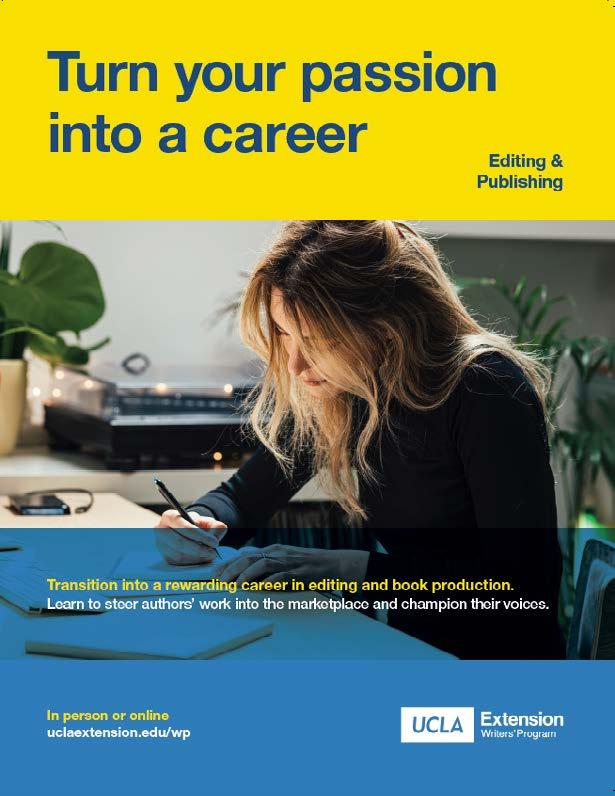
uclaextension.edu/wp
BECAUSE THAT HAPPENED
by CHELSEY CLAMMER
You don’t know the feel of a tumor being tugged. How it might not even be there because who knows that a teratoma tumor can even be tugged? It’s about a fallopian tube, the ovary it’s attached to. You don’t yet notice the swelling in your lower abdomen—and even when you do, you figure it’s some organ of sorts because you’re not the type of person to get a teratoma tumor. As if you even know what that is.
But then you lose some weight—thanks almost-breakup and its accompanying anxiety prompting some not eating—and you feel this maybe-it’s-an-organ lump that you can push around your body. Like, up to your rib cage. Like, from one side of your uterus to the other. Must be that floating organ, you think, because you don’t know better, and how you yawned your way through your college anatomy class nineteen year ago.
You don’t know that the teratoma tumor is tethered to your ovary and that each poke, push, prod, more-thangentle nudge across the landscape of your lower abdomen could torque it. That would cause pass-out—possibly blackout— pain. But you know nothing of this, nothing of how the lump has been gaining existence since you were a fetus.
You don’t know that back then, during your embryonic era, you basically ate your twin.
Who does that?
You.
Because once the lump is CT-scan- and doctor-certified discovered, once you’re not quite done with being freaked out about it for two months while you continuously exude an aura of what the fuck?, once they knock you out and then pump your abdomen cavity full of air and professionally pull that shit out of your belly button, you’ll later see the pictures, and even later here the glee in your doctor’s voice as she tells you about the blonde hair that gnarly-ing-ly grew inside of it. You see, blonde is oh-so-rare.
“It’s always black,” she’ll explain about the insides of teratoma tumors. “In fact in med school,” she’ll squeal, “it was a contest to see who would find a blonde hair-filled tumor first!”
You don’t know how you’ll feel about this—how she won something because you lost it.
131


thefabulous.co
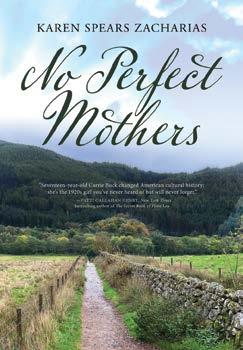

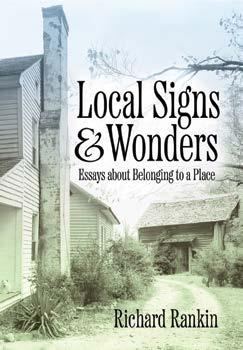
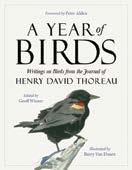
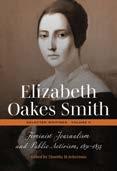
134 BLUE MOUNTAIN REVIEW APRIL 2024 www.mupress.org Use coupon code MUPNEWS online for 20% discount off your entire order or call 866-895-1472 toll-free —Shipping charges will apply— www.mupress.org
BUILDING A MOVEMENT AGAINST MALE CIRCUMCISION
by GEORGANNE CHAPIN
In late winter 2003, I arrived at a seedy motor inn in the pre-gentrified southeast quadrant of our nation’s capital. I’d been invited to speak at a meeting being held by a group of activists who opposed the U.S. medical profession’s penchant for cutting off the foreskins of newborn baby boys—a practice known as circumcision to some, genital mutilation to others.
At that time, in my last semester of an evening law school program designed largely for people like me—mid-career professionals looking for a new challenge—I had become absorbed by the question of why most American males had been subjected to a brutal surgery that removed a normal body part without their consent. In writing a term paper about the topic for a bioethics course, I’d discovered that a movement existed whose goal was to end that practice.
I first became aware of circumcision in 1962 when my brother Chip was born. I was 10 years old. Within the first week of Chip’s life, his genitals were cut—twice. The first time was a routine circumcision done when he was a day or so old. At that time, nobody asked parents whether they were okay with paying someone to remove part of their baby’s penis. “They just did it,” Hank (the father who raised me) told me years later.
I watched my mother change Chip’s diaper and saw the angry red, raw and oozing wound where his foreskin had been. I knew nothing about the male anatomy, but I shuddered at the sight of the open wound on my newborn baby brother’s body. A few days later, my parents rushed Chip back to the doctor. The tip of his urethra had closed up, and he couldn’t urinate. The solution: using a scalpel to reopen the hole while my mother held him in her arms. As with the first surgery, no anesthetic. I eventually learned that this complication, called meatal stenosis, only occurs in males who have been circumcised.
A decade later, when traveling in Mexico I realized the intact (“uncircumcised”) penis was the norm throughout most of the world. And that men who were allowed to keep their natural genitals did just fine.
Now, 50 years after witnessing the aftermath of my brother’s circumcision, I was in the room with this odd group of anticircumcision activists, or intactivists as we are now known. Accustomed to professional conferences, I was struck by the informality and openness of the conversation among the 25 or so people present. Topics veered from impassioned appeals to protect babies from the pain and trauma of circumcision; to sexual dysfunction among circumcised men and their partners; to strategies for ending Medicaid funding of routine (i.e., medically unnecessary) infant circumcision; to the complicity of the medical profession in promoting a harmful surgery that served no therapeutic purpose.
My colleagues ranged in age from late teens to early 80s, and included at least three attorneys, two physicians, a sunburnt man with long blond dreadlocks who lived in Florida and mowed lawns for a living, an anthropologist who as an army
135
physician during World War II had conducted Elvis Presley’s intake physical, an industrial designer from Indiana, a retired airline pilot, a PR guy from Chicago, and Marilyn Milos, nurse and founder of the intactivist movement, who was in her early 70s. Almost all were white, and a disproportionate number (given their small percentage of the U.S. population) were Jewish.
So far as I know, every man in the room had been cut as a baby. Marilyn left the meeting right at its start to check on the pregnant wife of a young man attending the meeting. He was in the process of suing his mother’s doctor for capturing her signature on the “informed” consent form when she was under the influence of drugs administered during labor and delivery. In her absence, Amber Craig, a North Carolina mom, took her place as moderator and opened by saying: “Probably the only thing this oddball collection of advocates agree on is that people should stop cutting off little boys’ foreskins.” I joined that club.
Five years later, I helped spearhead the founding of Intact America (IA), a nonprofit organization that has become the largest professional organization in the world focused on ending male genital mutilation. IA opposes the genital mutilation of any child—male, female, intersex, or transsexual. During the early days of organizational development, my close friend, neighbor and fellow anthropologist, Lucie Saunders, asked in her Virginia drawl, “How did you get into this... this penis business?”
In February 2024, I published my first book, This Penis Business: A Memoir, which answers Lucie’s question. How did I become an activist in the human rights movement to end the genital cutting of boys? I was raised by my liberal welleducated parents to be an activist, exposed to discussions, debates, and philosophical forces from an early age. I had opinions and the confidence to express them.
I became increasingly aware of what now seems so obvious: Circumcision doesn’t only wound babies but everyone around them, and our culture perpetuates and condones the abuse of children by prioritizing economic interests over evidence that circumcision is medically unnecessary. I could not and would not shut up about this national tragedy that first took hold more than a century ago.
This surgery—classified as cosmetic—deprives males of the most sensitive part of their penises, and profoundly compromises human connection and sexual intimacy. As a culture, we pay a huge price for this uniquely American custom, which most people never even think about. Protecting future generations from this injustice depends upon bringing this routine practice into the open and calling its perpetrators to account.
Since becoming a professional intactivist, I have engaged in thousands of face-to-face conversations and received and responded to thousands of letters, emails, and phone calls from men who were assaulted by medical practitioners as babies. Some but not all these men knew for years that something wasn’t right, something was missing, but they did not have the information or words or confidence to talk about it.
I have spoken or corresponded with thousands of women who love those men—whether brothers, friends, sons, or lovers— who resent the damage done to their loved ones who had no voice in being circumcised other than to scream in protest as a doctor cut their genitals. I have heard from wives and lovers who suffer from painful sex and lack of intimacy caused by their partner’s denuded and desensitized penises. And I have had too many excruciating conversations with mothers whose sons are paralyzed with grief, rage, and resentment. Some have gone so far as to take their own lives. Mothers can suffer paralyzing guilt—not only because they couldn’t offer enough solace, but because they were the ones who signed the form allowing a stranger to cut off a piece of their baby’s penis.
136 BLUE MOUNTAIN REVIEW APRIL 2024
In addition to advocacy, surveys, and information-sharing on our website (intactamerica.org), via social media, and now through two memoirs—my own and Please Don’t Cut the Baby! by the mother of the intactivist movement, Marilyn Fayre Milos—the biggest contribution Intact America has made to ending circumcision and healing its wounds has been to provide a forum for those who have been harmed to tell their stories. Speaking the truth is the beginning of knowledge. Listening provides the path. Walk with us to establish a greater understanding of the consequences of circumcision and turn the tide of a useless cultural convention.
Circumcision cuts through us all regardless of race, ethnicity, economic status, gender at birth, or role in society. Do you have a circumcision story? Share it and become an intactivist yourself. You are not alone.
137

ABOUT GEORGANNE:
Georganne Chapin is a healthcare expert, attorney, social justice advocate, and founding executive director of Intact America, a 501©(3) nonprofit and the nation’s most influential organization opposing the U.S. medical industry’s common practice of surgically altering the genitals of male children. Chapin earned a BA in Anthropology, magna cum laude, from Barnard College, a Master’s degree in Sociomedical Sciences from Columbia University, and her law degree from Pace University.
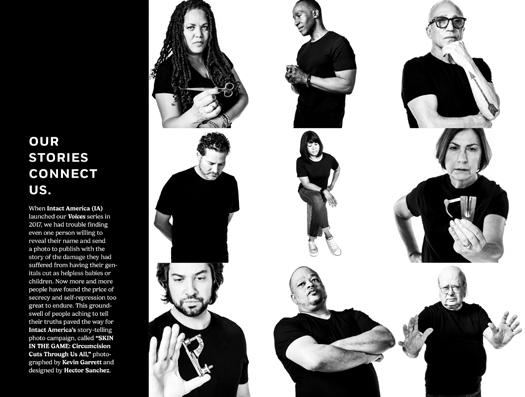
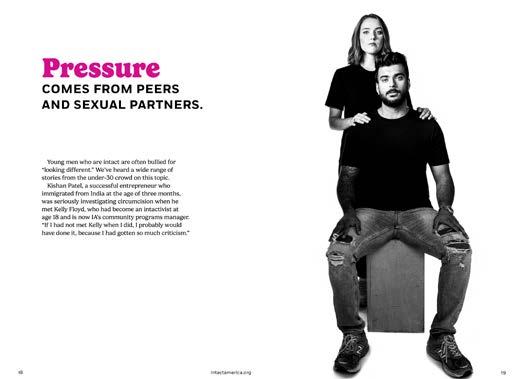
139

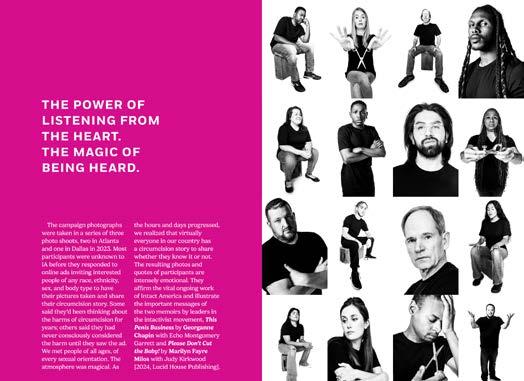
140


141

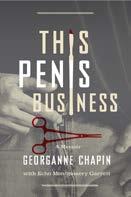


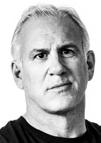


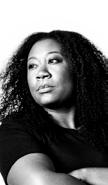


BLUE MOUNTAIN REVIEW APRIL 2024 Help spread the word and STOP routine medical circumcision. BUY THE BOOKS. DONATE. intactamerica.org/donate lucidhousepublishing.com Intact America is a 501(c)(3) nonprofit lucidhousepublishing.com lucidhousepublishing.com
SKIN IN THE GAME
A PERSONAL PROJECT FOR AN AWARD-WINNING PHOTOGRAPHER
by KEVIN GARRETT
As a commercial lifestyle photographer most of my days are spent making images of happy people in lovely settings, living their best life. Once in a great while as an artist, you get an opportunity to make a big difference in a human rights issue, an opportunity to change the way people think about a topic through images. That’s what the Skin in the Game: Circumcision Cuts Through Us All campaign to raise awareness of and end medically unnecessary circumcision of babies and children was for me.
I learned about Intact America, a nonprofit committed to ending circumcision, through my wife’s involvement with two books by leaders of the intactivist movement. Marilyn Fayre Milos’s memoir "Please Don’t Cut the Baby!," co-written by Judy Kirkwood, chronicles the beginnings of activism to spare infants in the United States the trauma and pain of being surgically altered within days of birth. My wife, Echo Montgomery Garrett, co-wrote Georganne Chapin’s memoir "This Penis Business," about Chapin’s path to activism as a healthcare executive and co-founder of the nonprofit, Intact America. Finding out that 1.5 million boys born in the U.S. each year have their foreskins cut off, which translates to removal of the protective covering of the head of the penis and the loss of erogenous nerve endings, rang some bells for me. I came to understand that this unnecessary cosmetic surgery can have a lifelong negative impact on sexual and mental health of boys and men. I felt alarmed at the trauma and pain to which babies and children in this country are subjected— because this was my story, too.
I was born in rural Alabama in 1959 at the tail end of the baby boom. My father, who worked at a papermill, paid the doctor’s delivery fee with $20 and a deer he had killed. People in rural areas or in poverty didn’t have their babies circumcised. Mine was done when I wasn’t yet three years old. I don’t know why it was done at that time, or why it was done at all. It was never discussed. But for years I’d been haunted by shadowy memories of a searing pain in my private parts done in a dark room with my mother present. It was not until I met Georganne Chapin and heard the stories of others that I was able to put together what had happened to me.
But what could I do to help break this cycle of genital mutilation that abuses days old babies and older children?
I began to think of how the powerful, heartbreaking images that Gordon Parks made in 1960s Birmingham highlighting the human suffering and brutality during the fight for Civil Rights made a case from which the viewer could not turn away. The images Eddie Adams made reflecting the inhumanity of the Vietnam War are still on my mind decades after first seeing them. Storytelling with images leads us to engage with issues on a deeper level and makes it impossible for us to walk away from injustice. I decided that’s what I could do for the cause of ending circumcision.
Even though nothing in my portfolio showed the kind of iconic images that could make people change their minds about subjecting babies to circumcision, I shared my vision of activism through story-telling and images with Georganne. We brainstormed and came up with the Skin in The Game: Circumcision Cuts Through Us All campaign and in April and June of 2023, I photographed more than 80 participants during two photo shoots in Atlanta, Georgia, and one in Dallas,
143
Texas. Our team made black and white images that connect the viewer to the subjects in an emotional way that draws the viewer into the pain, anger, regret, and sorrow caused by male infant circumcision. Men and women of all races, ethnicities, and all ages are affected, and they all have a powerful story to share.
The images are striking in their reduction of visual elements around the subjects. We made the choice to have everyone in denim jeans and simple black tee shirts, to photograph on a stark white background, under classic lighting schemes. This structure highlights the humanity and unifies us as all similar. My goal was to have the viewer’s focus solely on the individual featured in the shot, to his or her face, to their emotion.
We assembled a talented team of creatives to pull these shoots off. Kelly Floyd, community coordinator for Intact America, put out the call for people who would share circumcision stories and allow us to photograph them in this emotional portrait style. Our lighting director, Ken Schneiderman, lit the sets with beautiful and distinctive light. Ray Hardy and Joe Lacerte, as our digital technicians, gave us clean and consistent files. Stephen Mancuso was impeccable with hair and make-up and kind and reassuring to all the subjects who sat in his chair. Kelly Floyd and Echo Garrett interviewed all the subjects. They all made my job easier.
Because I was asking participants to dig into traumatic and deeply personal experiences, I engaged the subjects in quiet, empathetic conversations. My goal was to have them feel safe enough to tap into whatever the subject of circumcision made them feel. This studio and set were a safe place for our subjects to be vulnerable and to share their painful stories.
Everything matters when you are asking people to bare their souls. We even engaged a talented and conscientious caterer, Lisa Callens, for all the shoots so there would be nutritious and comforting food available for all because we wanted to send the message that everyone’s story matters and that we care about their wellbeing. For the Atlanta shoots, we also brought Felicia Guevara, a massage therapist, on site, who gave chair massages. We selected soothing soundtracks for each day but made sure it didn’t interfere with the bonding we witnessed. We wanted to honor people’s willingness to share such intimate stories and do everything in our power to make them feel safe, because truth-telling could make a profound difference for future generations.
What ended up happening surprised everyone on the team. Most people wound up hanging around for quite a while after their shoots and interviews were done. They gathered in pockets around the studio, deep in conversations. Several mentioned their relief at knowing that they were not alone in their experiences.
On the backside of the shoots, my long-time assistant Holly Brown did a meticulous job retouching the final images. Hector Sanchez and Jan Sharrow made inspiring, captivating designs for the campaign. Some of their work is highlighted in the Skin in the Game mini magazine that serves as a preview of the art book we hope to produce based on the almost 300 golden images winnowed down from the 30,000 I shot.
The heroes of this campaign are the men and women who shared their stories and gave their hearts on the set. Many found the courage to voice things that they had never shared with anyone. I’ve never worked on a more personally fulfilling professional project or collaborated with such special people—both those who worked on the project and those who volunteered to share their stories with strangers, all of us wanting to make a difference.
144 BLUE MOUNTAIN REVIEW APRIL 2024

ABOUT KEVIN: Kevin Garrett has done work on award-winning campaigns for nonprofits like the Ronald McDonald House Charities, Susan G. Komen Foundation, Chattahoochee Riverkeeper, the Boys & Girls Clubs of America, and Orange Duffel Bag Initiative. KevinGarrett.com
https://kevingarrett.com/
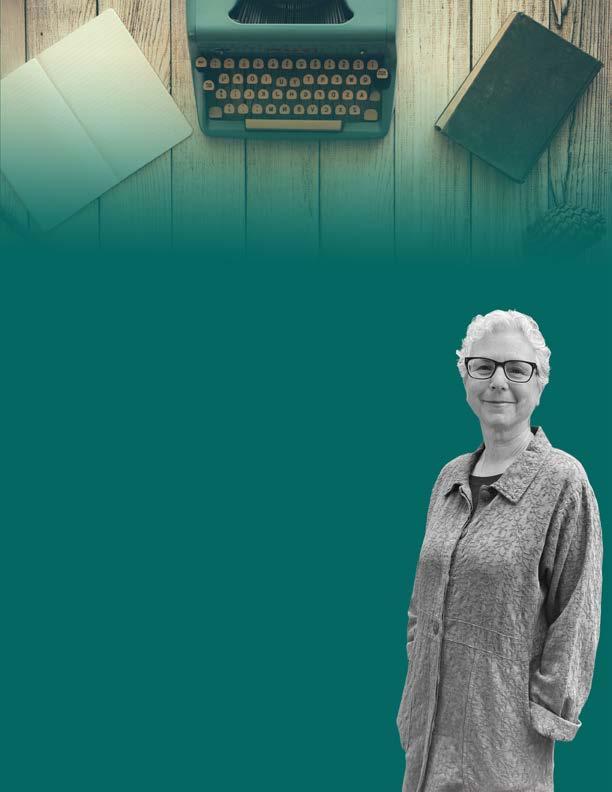

www.ellenbass.com
by BRYAN FRY
IF YOU FIND THIS
AS A CHILD landlocked in Great Falls, Montana, I was fascinated with the ocean, that vast space where men with long, tangled hair once searched for islands and the promise of buried treasure. I would pull an encyclopedia off the shelf and read about conch shells, coral reefs, and Mother of Pearl. I imagined parting through the salt water in scuba gear searching for star fish, jagged coral, and the mysterious giant squid.
When I was ten, I overheard a story of two American men who were stranded on an island in the Pacific. They wrote out a note pleading for help, put it inside a Coca-Cola bottle, and let it drift out to sea for someone to find. The note contained vital information about the men’s whereabouts and so forth, and I don’t remember if anyone ever found it. One windy day after school, I decided to see if it was possible to make connections with such a message.
In black ink on several sheets of clean white paper, I scrawled a sentence requesting immediate assistance. The sentence read: “Help!! If you find this piece of paper, please return it to its proper owner.” I listed my name and phone number and marveled at the way each sheet rattled up into the wind as I let them loose across the school playground near the tractor tires and monkey bars where we boys pillaged loose change during recesses. Many of the sheets fluttered across the street toward the quiet houses around the neighborhood.
For two nights I waited near the phone, hoping strangers would call claiming they had found a piece of paper with my urgent message and wished to respond. I imagined faces: a boy my age with curly brown hair who had tried once to send a similar message but failed to get a reply; an older girl with shiny pink lips who liked to French kiss in the dark; an older couple who always wanted to adopt a boy, which saddened me.
The story of the stranded Americans is still vivid in my mind. I can picture the men stripped down from their business suits, sweating under a hot, relentless sun. I can see the glass bottle and the familiar cursive Coca-Cola lettering buoying in the nearby surf. If I focus I can smell salt and seaweed, and feel wind whip across my small ten-year-old frame. It is a scene so entirely real, as if I had been among the two men, and yet I know the details are partially fabricated, that it is a narrative I must have constructed over and over until it lodged somewhere deep in my memory.
Who am I to say how much of these things are real?
This was sometime after my father’s second marriage. My birth mother was an addict of sorts and my only real memory of her in our household is of the day she packed her purse with fat markers and bingo money, slammed the front door shut, and pulled our blue sedan out of the driveway.
When my father remarried, his new wife brought three children into my home. In all, I grew up with two brothers and three sisters. Our house swelled with noise and for a long time we were a family. Our father tended to our small yardwounds and our mother mended our clothes.
And yet with a house so full I often felt alone, a child trapped on open land, hundreds of miles from the nearest shoreline. How difficult it is to explain that child, or to explain my childhood, how I sometimes felt so much that I wanted to escape
147
the confines of my own body?
Once, while exchanging class photos in grade school, I asked my friend Jared if he thought we started our lives as spirits in Heaven pleading with God, saying “God, please, can we go down there and play?” I pointed down to the earth below our feet and Jared just stared at me, confused.
“And then God finally says ‘Okay, sorry, but you have to be this guy.’” I slid my photo across the table so Jared could see what I saw in myself—a boy, all freckles and teeth, sheepishly grinning at the camera.
Jared looked down at my photo and then went into a convulsive laughter. “Shit, man, that’s great,” he said, slapping my back. “‘You have to be this guy!!’ Seriously, hilarious.”
Really, I was just a boy trying to figure things out. Who was I? Why was I here? These are common questions kids ask. I obsessed about them and my obsessions turned into fantasies. I made myself dream and I believed in my dreams. In many ways I believed I knew the man I would be for a long time becoming, and I knew that to become that man I had to escape childhood. And so I often looked out towards the horizon imagining I could see the curved ends of the earth.
When we read William Golding’s Lord of the Flies in sixth grade, I wished desperately to find a world without adults, to be stranded on an island, surrounded by sand and sun and that perfect oceanic blue I’d seen in so many books and movies. When I closed my eyes, I was standing barefoot in the hot sand, blowing through a giant shell, gathering my tribe who danced half naked around fires and believed, unlike Ralph and Piggy, in the beast that lurked outside our camp.
In class, I thought about exploration and time travel. I studied the world map and planned trips across continents, navigated between meridians and tropic lines, pinpointed the smallest dots of land surrounded by the swirling blue sea. I wrote poems with perfect rhymes and hid them inside my notebook, imagining someone years later would find them and print them in volumes that would eventually swell book bags and library shelves.
I used to daydream during math and grammar lessons. Once, between recess and lunch, I created a whole philosophy on the concept of sleep. I concluded when asleep in this world, our minds awaken in another where we live another life in another body. Likewise, when we’re asleep in that world, our bodies reawaken in this one. This explained, too, why we had good and bad dreams, our sleep affected by the moods of our alternate lives.
Once, I even figured out what happens to missing pairs of socks.
In the basement of our Great Falls home where my siblings and I played make believe, I remember dressing in my father’s clothes, wrestling on a tie, while my sister, Jamie, brushed through the yarn hair of one of her dolls. We would imitate our parents, fighting with one another and sending our other siblings to timeout for talking back or not eating the plastic food we prepared. Then the timeout spot would quickly transform into the peak of a dingy castle and my brothers and I would have to fight with vacuum cleaner hoses through demons and dragons in order to reach the top and save our sisters.
In that same basement, I used to listen to music and write down lyrics: Slippin’ and a-slidin’, peepin’ and a-hidin’ /Been told a long time ago-ho-ho-oh-who. Line by line, I wanted my sister, Becky, to believe I was a songwriter by inadvertently stealing lines and making her believe I wrote them, I too began to believe. And so I entered into my notebook rock songs and rap lyrics—all the obscure music I knew she had never heard. Her admiration encouraged me and when I ran out of music to perform, I switched to the poems I had read in school and practiced jokes from comedians I saw on television.
I wanted to be someone else, someone other than the boy with the encyclopedia who lived vicariously through stories,
148 BLUE MOUNTAIN REVIEW APRIL 2024
who fought five siblings for attention. Because my sister was the youngest, she was great at suspending reality, and I often clung to her, especially on dreary days when the rain drummed against the house and there was nothing else to do but stare out a window at the sheets of running water and dream.
Once, I was sitting on our front porch singing Oh baby, won’t you come out tonight when two neighborhood girls came up and told me I was cute and had a nice voice.
“Where did you learn that song?” one of the girls asked.
I tilted my head to the side and threw my hand in the air pretending to be embarrassed and said, “I just finished writing it.”
The girls giggled and swooned, encouraging my confidence. I sang every song I could think of, told them I had written them all, and they each kissed me on the cheek before they left. I never broke character, and I believed sincerely at the time they took me for a rock and roll star.
Make believe involves letting go. It allows your mind the freedom to empty out its pockets, which requires more faith than discipline. Open the school doors and watch the children scatter. If you open a book, if you read about pirates and conch shells, if you are able to feel the warmth of sand, smell the salty earth, for a moment, however slight, is it not worth experiencing? Sad is the boy who scoffs at the imagination, who does not understand his mind is planted with possibilities. He has everything he needs and yet continues on his way toward adulthood where time travels more quickly and there is little, if any, to daydream about.
At some point, perhaps after my first real kiss or my father’s second divorce, long after those wind-whipped papers with my urgent message, I stopped dreaming. Not completely of course, but definitely I did not daydream at the pace I used to. In college, I learned to walk slowly and hold my shoulders high; in graduate school I learned to compose myself in front of large crowds and rehearse words before I spoke them.
After spending an entire childhood imagining who I was or who I might become, I was suddenly in my twenties, in college and married. My wife Katy and I were expecting our first child, then our second. As low-income students, we spent entire paychecks on rent and diapers and formula and barely had enough food to feed the neighborhood cat.
Once, Katy and I scraped change from under the couch cushions so we could feast on Chef Boyardee. We sat in the living room passing a spoon and a hot can between us while the television flickered over our faces. We were hungry and so the food was delicious. When I moved to clean up, Katy reached for my arm and smiled.
“Let the maid get it,” she said. And we laughed.
These are the moments I remember most clearly when I think about my entry into adulthood. And yet in photographs, I notice something entirely different: a young man with deep concentration, preoccupied. He is staring off into space, but he is not daydreaming. He is doing something entirely different, more solemn, more life-weary than when he was a boy.
And so I find it strange that I’ve spent the first part of my life wanting to escape childhood and now as I near my thirties all I want to do is slip back.
I close my eyes and I see my son Jack in his diaper dancing around with a cookie or my daughter Gracie painting with her
149
watercolors, making collages, and I imagine a world full of adults acting just as they do, dancing naked, mashing Oreos into their faces. I imagine college students cutting out shapes and pasting them together to form awkward looking houses and trees. I think of taking my children outside and letting loose messages scrawled on sheets of paper, watching them drift away in the wind towards the faces of people I imagined as a child, allowing myself to believe they will call to let us know they’ve been waiting to hear from us and are ready to join in our game.
I ask my children to help me build a fort, and we begin to take blankets and drape them over the living room furniture. We tuck corners into drawers and secure loose ends with heavy books until the roof is taut and they crawl inside.
I poke my head into the fort and watch the change in my children’s faces as they seem unsure of what I am doing.
“Yes, officer daddy?” Gracie says.
“Officer? I ask. “Where did you get that?”
She pushes at me with her feet and snaps a look that says it’s time for you to leave.
“I am not the officer,” I say and enter the fort.
I find a place between them, lower my voice, and in an overly serious tone say, “I am the king and this is the land of Purple-Pink.”
We all giggle and suddenly I’m back in the world of imagination, playing make believe with my children, trusting in my faith, trusting in theirs, until the walls begin to cave in, and we close our eyes and fall into blackness and dream of a world filled with nothing but what we’ve brought to it, our hands empty of anything, but holding on.
150 BLUE MOUNTAIN REVIEW APRIL 2024

Bryan Fry received his MFA from the University of Idaho. He currently teaches for the English department and the Honors College at Washington State University and is the co-editor of the online literary journal Blood Orange Review. His work has appeared in Brevity.
ABOUT BRYAN:
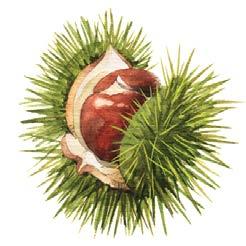
http://www.chestnutreview.com
152 BLUE MOUNTAIN REVIEW APRIL 2024 Chestnut Review FOR STUBBORN ARTISTS CHESTNUTREVIEW.COM Accepting submissions 365 days a year
CONGO DANCE NOTES
(Notes on Faustin Linyekula travelling dance show)
by CHRIS DALY
The longer the time line, the slower the movement. So the art students of the different ages and mostly of the various shades of pale are sitting there and yakking politely for a bit before we realize somebody is in the room.
Faustin, a Miles Davis type, and two other Congo dancers have appeared dimly in a back corner of the stage moving with infinite insect intent, isolating continuously. It takes about two and a half dance eternities for them to get across the back of the stage to three caterpillar suits sitting in piles.
Edna Disney has a symphony room above, we had three musicians, a trap drummer on a riser, an electric bass payer with a long patent leather greatcoat, and a seated two-neck-guitarist in a fabulous long red robe with look into my cave of death hood in place, they had been playing ambiantly in a kind of pop electro rumble barely suggesting those long out and back in savannah chords.
Off to the far side and standing at a high microphone in silence had been a very tall African gentleman in a gold lam-e suit, suggesting powerless, noble, untrustworthy life in a police state.
Picasso influenced freely from the continent and the black gypsy modern art acrobats bend to fit frames or telescope with collapsing twisty angles the big drama, inward turned knees, in/out shoulders, lean, finally isolating their way into the bulky suits.
The music is cranked up into strong power pop and the tall gold guy is rapping and is joined by a second word man in a regular but very cool quilty waxy short stocky suit, shouting the poems of Antoine Mhindo, jailed for a few years before escaping and disappearing.
The linga is franca, the bourgeois party is over unless you can sneak into the people’s party which goes all night in a place that since WW2 may be the world’s war capital, no amateurs need apply.
The texts their own selves are rather filled with big time clichés but are fun when delivered with energy and color and looseness next to touring dancers in puffy, noisy costumes.
Extra-black child no child faces, somewhat detached informal deadpan doing a hidden pachanga africanus, What keeps this from being a night at the circus is the anger, cynicism, transcendence and power of the road. And in the off-center staging later, out of the duds, with a part where it all comes down to Faustin’s washboard.
Thirty-five years beyond home, beyond Paris, the jewel in the belly of the toad is shaped like city hall with a ziggurat tip, mike check, if we are strong we can have humor.
In the belly of my eye, am entranced to high consciousness, like other dancers am sitting there thinking: Miles but not Miles, no single impossible moves, just pretend you’re the Congo River, isolations to the sub-atomic level in the scheme of things.
The intimations of the rhythms of the lost species getting us through the paranoid states of the living beasts, the corporations and the loose networks of incredible brutality. Pour on the miraculous, tune up the stars, even the crappy version I do later at home feels good, and in the moment: literal non-crazy guts.
The people of Congo do not have the power, occupy sequentially in combos, sometimes alone with all the moves in the belly of the air, place over in the back for hard pop wood-shedding.
153
You can watch or not watch this episode in the life of a funky snail, one of the three dancers had an ounce or two of body fat.
The vocalists had various bits like stocky man anger to soulful pain sideways in beyond boutique suit, or skinnying to the heights with hollow deep voice authority, full of dikembe mutombo, shaking out the la-me with much conviction.
The dancers had their wind, the pop music wall present, scalloped, lump of the gravy.
Spirit of the village of the men taken care of, all eight drift over to the original dim corner for a chant circle.
Then back around for some more show biz in the manner to which we have become accustomed.
End it sitting with backs to us watching projected pictures of themselves over floating clouds, demonstrating selfaudience skills.
Ancient trick, barely audible guitar lick, loop to fade.
154 BLUE MOUNTAIN REVIEW APRIL 2024

Chris Daly resides on the West Coast of the USA. Publications include Rolling Stone, Wormwood Review,
the Fence and
ABOUT CHRIS:
Tears in
Chiron Review.
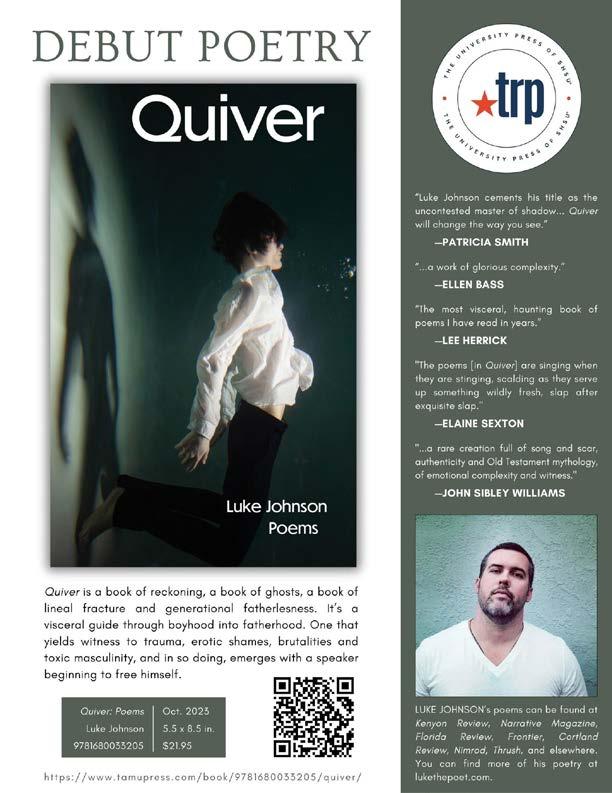
www.tamupress.com/book/9781680033205/quiver
THE ZAZA STANDS ALONE
by JANA HARRIS
from The Armageddon Horse, Essays and Observations from the Farm, a climate change memoir
When a mink moved in with us, I immediately began searching for an existential or paranormal explanation: Why this house, why me? Just to be clear, I’m not speaking about a posh female-identified human, I’m talking about a member of the weasel family whom I named Zaza.
The Zaza migrates around in the walls of the kitchen and mudroom, sometimes venturing into our garage near its food source, the mice and (cringe) rats. These rodents eat bread crumbs, food droppings, dog kibble, and gnaw on the stored produce from our organic garden business—potatoes, onions and, their favorite, delicata squash. Down at the horse barn near the bins of carrots and apples, the Zaza has a private bolt hole—minks do not share territory or anything else. When the rodents have finished eating, their stomachs full and guards down, the mink moves in for a meal, a situation that has a production line feel to it. Ali, the out-of-control Alsatian we rescued from the animal shelter, spends hours being entertained by the Zaza even after the devourer has left the building. Where is it? Under here? The dog never tires of this game. It? It’s difficult to sex a live mink, so let’s just say “non-binary,” otherwise I’m never sure which pronoun to use.
Pronoun confusion aside, the question-of-the-hour is: what fueled a cis-gendered emotional outburst so violent that the Zaza removed all the ham-and-Swiss-flavored rodenticide bars from the cubby holes (where my husband had cleverly stashed them) and then dragged, slid, carried, shuffled or maybe even kicked them to the middle of the kitchen floor? Ditto the cleverly stashed rodenticide bars down at the barn where the mink shuffled them to the center of the aisle between horse stalls. On close examination—with magnification 2.5 reading glasses—I see a few tiny gnaw marks on each rye bread-colored bar. So what’s the take-away? Is Zaza saying, “I’m here, I’m the authority, and I’ll dispatch the rodents: Do not block my path” or what?
Until the Zaza moved in, my only experience with this species was through the deceased; a small scrap of sable-colored fur (probably a single ribbon-shaped European mink pelt) threaded through a silver rhinestone circle pin and permanently affixed to the neck of my mother’s best pink Goodwill maternity smock. Even though Mother always told me, “Ladies don’t work,” she wore it to the polling station at my grade school where she counted votes on Election Day, which, she assured me, was a duty, not a job—even though she got paid for it. I wondered why she was against women working. Another unvoiceable wonderment: Why was she adding to our numbers when the five of us lived crowded into the garage of a half-built house in a posh suburb? My classmates’ mothers wondered the same thing, judging by all their whispering. If ever I asked Mother about our precarious circumstances, Daddy heard about my ungrateful attitude the minute he got home from the meatpacking plant. After one such row, I remember staring at the fancy pink maternity ensemble on its hanger. Something about the jewel at the neck spoke to me. The garment still smelled of the former owner’s perfume and I breathed in the scent, trying to imagine the regal life of the woman who had owned it. When I reached up and stroked the lustrous scrap of fur, it felt heartwarming. Today, now that I’ve entered what is probably my last decade on Earth, a mink ––this time a live one—has again come into my life as a source of comfort.
I’ll explain this new found solace in a minute, but first what to make of the episode around the ousting of the ham-andSwiss-flavored rodenticide? Was “my” mink OCD with a “cleaning manifestation” like my mother? As a kid, my family may not have had a house to live in, but that didn’t mean we didn’t have nice things. For instance: the good silver that I have no memory of ever using. These utensils were to be saved until our house got built and woe be to she (me) who disparaged polishing the silverware then lining each piece up perfectly in the Hepplewhite chest but mistaking the desert forks for the salad forks. Or, worse, accidentally putting a micro scratch on one of the mahogany drawers, a carelessness that was followed by a lot of shouting and hitting. The Zaza’s emotional outburst had the same unhinged authoritarian texture as Mother’s outburst about me slandering the silver and “destroying” the flatware cabinet. Did I think the Zaza was the ghost of my dead mother? More like a reincarnation of me as a kid when, like the mink, I felt a pressing need to re-home myself.
While down at the barn cleaning and re-bedding the stalls, I sometimes caught a glimpse of Zaza up on the sill that runs along the top of the wall. Its favorite ledge was above the new horse, Scifi, that we’d rescued from the racetrack just before
157
the forest fire turned lethal last summer. The mink—narrow-bodied, about a foot long plus a puffy tail—
looked like a one-and-half-pound cross between a ferret and a cat. Intelligent, alert, quick, silent. The pelage shown a deep rich brown, the guard hairs gleamed like the well-groomed Thoroughbred in the stall below, which reminded me that mink oil is used to polish and preserve leather horse tack. The notion that connected Zaza and Scifi for me was that both are universal symbols of a ritzy lifestyle. When the mink saw me, it darted back into the feed-room—where, in addition to carrots and apples, the grain bins, salt blocks, corn oil, horse vitamins, medications, and electrolytes were stored— probably to consider what might be done about this invasion of its territory. It seemed confused as to what to do in the face of its lack of opportunities. If I were smaller, the mink’s MO would be its usual despotic attack and devour.
Speaking of invasions and a lack of choices brings to mind a children’s song that accompanied a schoolyard circle game from my girlhood in an overly-privileged suburb. When my class played this game during recess on the day that Mother, wearing her thrift shop mink adornment, worked at the polling station in the auditorium, we were supposed to sing it in its original German. My family didn’t have the fees for extracurricular foreign languages, music lessons, or voice instruction, so I ad-libbed. The most popular boy in the class was chosen to be the farmer and to stand in the center of a circle where the jingle and the choosing began. You’ll probably recognize the English version: The farmer takes a wife (usually the most popular girl in the class); hi ho the derry-o; the wife takes a child, the child takes a sibling, the sibling takes a nurse, the nurse takes a cow, the cow takes a dog, the dog takes a cat, the cat takes a rat, the rat takes...the cheese. The cheese picked no one, since there was no one left. Everyone sang (or, more accurately, jeered): The cheese stands alone. The cheese was the least popular kid, the one with cooties, the little girl who lived in the garage. Today you might say that I passed the baton, the shame of being odd, different, and unpopular, to the mink, that solitary, lustrous, dangerous creature, millions of which had been sacrificed to the gods of opulence and haut couture. Or you might say (as I do) that it felt more like the mink— the live one, the one that chose me and moved into my house, the one I named Zaza— has snatched, or stolen if you will, the baton away and stands alone triumphantly as if being different were a coveted big-ticket commodity.
For some compelling reason, the mink has found its watery burrow—habitat of Mustela lutreola since time in memorial— inhospitable and has moved into a human habitation on higher ground. I consider a few possible explanations: the ground temperature has become too cold in winter and too warm in summer; the surface water is contaminated; its food source (frogs, fish, small birds, rabbits) has become scarce. Why choose my house and not my neighbors? Other than rodenticide bars, under official USDA certified organic regulations we are prohibited from using any kind of pesticide. Was it by design or mere chance that the Zaza chose to move into the organophosphate-free home of a poet and chronicler of unofficial histories? As the earth’s climate change journey unspools, the narrative threads tangle. Some snarl and knot into unlikely patterns. Others, crushable as a spider’s web, vanish into the ether.
158 BLUE MOUNTAIN REVIEW APRIL 2024

Jana Harris taught creative writing at the University of Washington and at the Writer’s Workshop in Seattle. She is editor and founder of Switched-on Gutenberg. Her most recent publications are You Haven’t Asked About My Wedding or What I Wore; Poems of Courtship on the American Frontier (University of Alaska Press) and the memoir, Horses Never Lie About Love (Simon & Schuster). Other poetry books include Oh How Can I Keep on Singing, Voices of Pioneer Women (Ontario); The Dust of Everyday Life, An Epic Poem of the Northwest (Sasquatch); and We Never Speak of It, IdahoWyoming Poems 1889-90 (Ontario ) all are available online from Open Road Press as are her two novels, Alaska (Harper & Row) and The Pearl of Ruby City (St. Martin’s). She lives with her husband on a farm in the Cascades.
ABOUT JANA:

FINDING REASONS TO RUN
by MELISSA ANNE tolentino
There are reasons why I don’t run: the ground is too hard. The sun, too fierce. The air too cold. Others have told me I might like it because my mind a sprinter—running shuts you down, they tell me. But I know better. My mind is a trickster; she gets busy when I least expect it. And my feet are too slow to run away from her.
Most days I feel like a bag of marbles loose on a table, rolling to wherever the light catches and then staying there, silent examiners sensing everything. When they get called back to the bag, they scatter, and hit the ground instead. Which is to say: most days I end up a kaleidoscope.
My mouth can sing you the sky. My fingers can shapeshift into stories, shadowed and deep. My ribcage is a drum of many rhythms.
But my feet are wimps. I couldn’t tell you what it feels like to run. Especially not through Mason Farm.
“Where is it?”
“You cut through Finley. The golf course. It’s behind it...kind of.”
“The forest?”
“It’s not a forest. It’s a farm.”
“It’s not a farm.”
Mason Farm is not a farm. It is simply land, in the very essence of the word. Nothing is built there but for the sake of science. The runners are visitors to something that cannot be seen.
My creative writing class visits Mason Farm on the sort of North Carolina day that dawns blistering and sets panting. Beyond the gate, I hear nothing. But I feel music. Stupid to say, maybe, but at the unripened age of twenty I’m willing to take a lot of chances. Someone else agrees. This is a place for a soundtrack, they say.
Who should call Mozart for a visit? Call Chopin from his sickbed, Beethoven from his quiet quarters. Place my own hands on a keyboard, calcium to ivory, and whisper me which keys to press for the trees, for the grass, for the miles that go on without even one hill. Everything in this place calls for a pitch, a pianissimo that strikes somewhere between creek and creek bed and in the frayed edges of a spider web.
I start walking and the voices pick up. I hear runners behind me, feet to ground like heartbeat but not exactly melody. They have the right of way, and so I move in the opposite direction each time. Eventually I feel like the runners are pushing me away, then pulling me back. To them, I’m just a tide.
I almost have a fear of runners: they go too fast. Where, exactly, are they trying to get to? Where is the big event that they just can’t walk to? Some of them look like they’ve been running nonstop for years, and maybe they have been. Their faces are too red. Their fists are clenched too tight. And their breaths are hard gasps of air, raspy shouts that beg for mercy. I wish I could give it to them.
There are three, maybe four, of these cursed souls the afternoon I am at Mason Farm. I swear I see one twice within a span
161
of five seconds. But he is a runner, and I don’t ask them any questions for fear that I’ll get the quick answer, the I-don’thave-time-for-you-answer, the go-on-girl, why-don’t-you-run-instead-of-asking-questions answer.
But why run?
My roommate runs every day. Not through Mason Farm, but on the gravel and cracked sidewalks of Carrboro, and late at night when the mist settles on your sweat.
“Clears the mind,” she says when I ask her why. “Gets me thinking.”
I think too much. And I never run.
“Come with me,” she says one night, one sneaker on a foot, the other unlaced on the kitchen table. She is stretching and has her leg hidden somewhere behind her. She is doing magic tricks and I am an audience of one.
“You know I have asthma,” I tell her. I’m almost proud of myself for this excuse. You want me to run? Then deal with my wheezing and moaning on about how I can’t breathe. I dare you.
She hurls back her pre-med degree at me. “Okay, then you have an inhaler, right?”
“No…” My gut reaction is always to lie first, pick apart the truthful bits second. I do in fact have an inhaler; I just don’t know where it is. Technically I could run. My asthma is mild but treated. I could bring it. I could do it. I could force my feet into bravery. Then maybe my mind would clear, too.
“We can run through that place you told me about,” she says, and throws her arm backward. I don’t know if it’s a stretch or if she’s pointing in the direction of Mason Farm—north, or south. Or east or west. I am with directions like I am with runners: distant. “That farm that’s not a farm, or whatever. It’s nature-y, right? Wouldn’t that be cool?”
Yes, I agree. It would be cool for the symphony that plays through Mason Farm. For what might be my only chance to conduct a musical. For the way my feet will finally be a part of something bigger than the weak castle it has to hold up every day. I want to tell her all of this; tell her about the music.
But it’s hard to talk to runners when they are about to go; she has the other sneaker on; she is already out the door even if she is still here.
“It flooded there once,” I say instead. “A lot.”
When Mason Farm flooded, no one ran. Hurricane Florence had too much of herself spread on the flatness of the reserve, so much so that she kicked through the levee and laid her head down on the parking lot. It was her time to be there, and no one was going to have any say in it. Strands of her hair caught on fences and her fingers laced with the infrastructure, but they did not hold her hand back.
Even though I don’t run I still know the restlessness that builds inside a body, inside a mind, and how it must be yanked out somehow. Maybe that’s why runners are so red all the time and so out of breath—it’s the extra hard breathing, and the difficult process of cleansing.
I imagine a life for myself far different than my own. In that life, I run marathons. I pray to the ground with my feet every day, twice a day, sometimes three. My doctor tells me that’s overkill but I tell her with my whole chest that I am a runner and that’s what I’m going to do. I build the castle of my body to such great heights, I am high-fiving God. I hear the music and I make my own. I am a hymn to the earth with my body.
And when it floods, what do I do? I turn on the television and watch the footage. I try to think of ways to get around it. I could run around the neighborhood where it has not flooded. I could run on the treadmill that I got for Christmas. I could eat an apple and not run. I could eat a bag of chips and not run. I could run in my sleep like the dog.
In my imagined life I dream about the farmlands underwater, like if Florence or her sister Hanna grew with power and beauty so grand that they coaxed a new Atlantis from the hills and the bricks and the trees and the Reverend Mason’s land. The lighting-struck trees are beautiful in this newfound ocean, split and torn at the very vein and perfect for fish homes.
162 BLUE MOUNTAIN REVIEW APRIL 2024
Shipwrecks coast along the trails once meant for people. Wild fruit mingle with the kelp and produce new types of seaweed that no one but the survivors and the dolphins eat.
And the running will have gone extinct. But then the music will have too.
I wake up from my dream in a dream, and the land is all dry and I went to Mason Farm once, and it was dry then and the levee intact and the hurricane girls a memory and the bridge walkable and the trees very much above water.. And there was the melody beyond the gate, keeping steady to the metronome of the runners passing by. Everything as I left it. Everything in its place.
I discover that someone in my creative writing class is also a runner, and that they have done so through Mason Farm a couple of times. They tell me that running there is not like running through Carrboro or Battle Park or any old wood (and there are so many old woods) in North Carolina. I think it’s the music, I say, and they look at me like they understand, so I pretend to understand them when they tell me about running.
It is like this: like you are not in Chapel Hill. Like somehow you arrived in a completely alien place by accident, but you are not afraid. You feel good about it. You step behind the gate and start the first run of the day on that trail and it is like putting your entire day in the trunk of your car and heading west, or east, or north or south—away, just away. For those who don’t know the land is there, it is like someone opened a door for them that swung into new country, a country where the bluebirds have rows of homes and the creeks swish alongside you like they are racing and the branches reach out to you with flowers on them, sprays of red like a heart on its sleeve. And you feel like you must bow before you take it.
“I feel that way sometimes,” I confess. “But I don’t run.”
“You don’t have to run to understand it,” he tells me. “Moving your body like that, losing yourself in running—it’s like poetry. You get that, right?”
“Poetry is just music,” I point out. He looks at me like he understands.
If it is true that some people feel aches when the rain is about to come down hard and unforgiving, tell me how bad it hurts when the town floods. Or does it hurt at all? And then get me a runner. And runner, tell me how good it feels when you set your feet into the ground hard and fast; tell me where you’re going. Tell me that you run through Mason Farm. Tell me what it felt like to think of the land as Atlantic. As earth scar. As struck. As gray and not green. As unreachable, untouchable, unrunnable.
I wonder: who hurts worse?
The spot where the forest at Mason Farm opens into field and swamp grass and light is what I’m looking for when I run, but there is nothing like that here. I hear no tempo in the thudding and scraping of my amateur steps. The only light here are the harsh yellow columns thrown from the parking lot lamps. And the worst part is that I’ve forgotten my inhaler when I really shouldn’t have.
“How long,” I gasp, “have we been out here?”
Seventeen years, it feels like. But my roommate—several paces ahead of me—throws her arms in the air.
“It hasn’t even been half a mile,” she yells back, her tone very even. She is barely breathless as we pass our local grocery store. The glare in the windows blinks back at me as I stare, whimpering.
There are reasons why I don’t run. One of them is that my mind doesn’t clear. I think too many things and I ache all over, but I’m not aching for anything, it just hurts. And the wind is painted gasoline.
My roommate sings when she runs. She sings at home, all the time. Even when she is out of breath. Even when there is nothing left to be sung. She can make her own Mason Farm. She doesn’t need to go there.
I look ahead where she’s still swinging her arms. This is her dance party. I think of the runners who have made a life of jogging through Mason Farm because they cannot name anything as close to happiness as that. I think of the flooding. I
163
think of the two together, puzzle pieces that don’t fit, but I am handy with scissors and I snip like a pro. I’m trying to find answers to things I know nothing about, because there is always common ground somewhere. There is always flat land, even in a town, in a state, where the hills reign supreme.
“What do you think about when you run?”
I have to swallow the air between each word to get it out. I vow, from that day forward, never to run in the summer ever again.
“Hm? Oh. I don’t know. Whatever’s on my mind that day, I guess.”
“You never think about how good it feels?”
“Doesn’t look like it feels good to you.”
“It doesn’t. I want to die.”
My roommate laughs.
“Running makes me feel like I’m really living,” she says, and tosses me my inhaler from where I’d left it on the counter.
I think it is like this:
When the music starts, people dance. Or run. Within the fences of Mason Farm, in everything that grows there, there is a note. Hanging off a bush. Sitting on the bridge. Waiting by the gate. Dangling from a spider web. Every single time your eyes fall on something the note is added to the measure. And so on, and so forth. And so, music.
When the music starts, people dance. Or run. Or sing. My roommate sings and though she has never been to Mason Farm, I hear her voice and think of the trails that circle through forest and prairie and trees, some mangled by lightning, some wrapped in the arms of vine. The tune that escapes her mouth doesn’t have words, but I know them already. The lyrics change depending where I am. Behind Reverend Mason’s gate, I am listening to something played at weddings. The words are vows. The tune is like summer.
I couldn’t tell you what it feels like to run. But I could tell you where the music plays and where the runners go to clear their minds and listen. It is one and the same, land in the very essence of the word, a place where the hills carry us forward.
164 BLUE MOUNTAIN REVIEW APRIL 2024

ABOUT MELISSA Anne:
Melissa Anne Tolentino currently lives in the Washington, DC metro area. She is the author of the poetry chapbook Noctua, from Alien Buddha Press (2023). Her poetry and prose have been recognized by a number of publications and organizations, including Rust + Moth, Tinderbox Poetry Journal, Emerge Literary Journal, The Adroit Prizes, the Raleigh Fine Arts Society, and the Alliance for Young Artists & Writers.

https://www.libertytrusthotel.com
THE ROAD TO WOODSTOCK
by ROBERT L. PETRILLO
Our clan was among the earliest settlers, having arrived Thursday after a prolonged and adventurous voyage up the New York State Thruway from the Jersey shore. Fifteen or so of us in four vehicles joined countless others in one snakelike caravan three lanes wide that went on for miles and miles. En route we mingled with dozens of the thousands of other clans who were making the same journey. We inched along for hours in the afternoon sunshine, sitting on car rooftops and hoods and leisurely walking between stopped or moving vehicles, communing with fellow travelers.
Upon landing at Yasgur’s Farm we found prime real estate – a parcel on a lovely knoll situated at the extreme right shoulder of the concert area, somewhat behind it and just out of view of the stage. A couple minutes’ walk through makeshift thoroughfares along which hundreds of other campsites had sprung up led us to the knoll’s edge and an expansive view of the huge natural bowl that would become “the house.” In that open meadow spread out below us was as-yet-unrecorded (and previously unimaginable) history. The “arena” would fill by Saturday – a vast open-fan shape with the stage perched where a lady’s hand would grasp it.
The next 24 hours floated by in unhurried minutes that paradoxically brought with each passing one a rising tension. More people – all of them so much like us! More commotion – the stage area teeming with antlike activity, vehicles coming and going. More adventure -- miles of lanes and trails to explore – into the further reaches of the farm –ponds and woods and endless meadows. And villages! Newly sprung up communities – clans and tribes from all regions of the country, all together in one Hippie Nation – a vast, sprawling exurbia of youth, color, hair, music, smells, laughter, wide-eyed grins and shared rituals. And everyone waiting, passing the time, lolling about, gathering sticks, making friends, waiting for the sun to go down.
Friday evening after campfire communion, we stroll down to the border of the concert area, only a couple hundred feet from the side of the stage. Sitting on a grassy slope under the darkening sky, we take it all in. The air feels clean and dry, starting to cool. We are surrounded by thousands of fellow pilgrims. Richie Havens’ strong voice welcomes us and shares the wonder. We settle back. Next up, some lesser-known sweet-sounding folk artists and groups: Sweetwater; Melanie; Ravi Shankar brings East to West. All the while, in the background, off to the side, there are helicopters landing and leaving – bringing in the performers, we realize, and later Arlo Guthrie will inform us, “The New York State Thruway is closed, man!” Sometime before midnight, Arlo and the rains arrive, nearly together. He’s “comin’ in from Los Angeles/ bringin’ in a couple of keys,” and all heaven breaks loose. Up goes a roar of approval; down comes the rain. The chanting refrain from the crowd can’t keep it at bay. We wait as the band scrambles to keep the electricity from going terribly wrong. We all manage to keep on going, though many campers head back to the shelters they have lovingly or hastily constructed throughout the day. The faithful remaining get close to the stage, and Guthrie recounts to us the comically absurd and sprawling story of Moses and the Israelites, Arlo-style. After midnight, and the Queen of the Ball-of-Days-Past holds court – Joan Baez, preaching now to a much smaller congregation.
We wander back in the light but steady rain to our perch upon the hill. We sleep well.
The next two days pass in a shimmer of heat and cooling rain, in a blur of faces and bodies, in sweat and mud, with the smells of earth and sky and all things in between, and above all, within all, below our naked feet and pounding in our naked chests and ringing triumphantly and defiantly and LOUDLY in everyone there, everyone old or young, male or female, stoned or straight, soft or hard it comes – the MUSIC, the ubiquitous all-night FM radio soundtrack of our lives, not on vinyl, not via transistors, but LIVE, alive, in-person, for several hundred thousand persons – we are there.
Saturday morning and afternoon: further explorations. It’s harder though, more difficult to maneuver from here to there – so many bodies, blankets, sleeping bags, so much mud. But we’re welcome everywhere we go, and everybody’s happy to be right where we are. No one complains about a thing.
Sometime Saturday afternoon between downpours, in anticipation of The Who later that night (much later), a couple of beatifically smiling longhairs are standing near a crossroad of worn paths, leaning against a fencepost, randomly asking passersby, including me: Hey man, have you seen Tormghy? (The name is a soft, muffled blending of indecipherable consonants and vowels.) “Who?” I reply. Again, one of them says: Tahmonny? The word fades at the end. Me again: “Who?” Once more the slurred name: Thaamhhi? Me for the last time: “Who? Tahmmy??” A pause, then a simultaneous cloudburst of laughter from the three of us. I get it. (The pinball wizard, of course.)
167
Saturday afternoon’s musical line-up: Canned Heat in the midday heat, “Goin’ Up the Country/ Girl do Ya Wanna Come?” Seemingly from nowhere, a Latin rhythm-maker stirs an indolent crowd into full-scale boogie: Carlos Santana rocks the house. Country Joe MacDonald further rouses the masses with his anti-authority “FISH” Cheer. Want to hear the sound of rebellion? Try a quarter-million voices shouting a four-letter word that’s not FISH, repeatedly, gleefully, for all the world to hear. Later that evening, the power brokers take over. Creedence Clearwater Revival revs up the night and shakes the audience to their feet. Towers of light and sound bathe our senses. Janis Joplin torches the air, cracks a piece of our heart with her yearning, plaintive voice. Sly Stone and his Family want to take us higher, as if that were possible.
Sunday is a day for ablutions. People wander off to swim and wash in the pond. Some group, probably local volunteer firemen, are also there with trucks, handing out water and spraying people down. Caked dirt comes off. Clothes come off. No one cares. We’re all the same, really.
The rest of the day floats by and drifts along into evening, then night. Joe Cocker’s feelin’ alright. So are we. The white-haired Johnny Winters lights things up. Somewhere in that span of time, long after dark, I know I just won’t make it for the final act.
Then, Monday morning, maybe five a.m., I’m asleep in our tent with a couple of others. Something jarring inside my head wakes me up. I listen to the vaguely familiar notes, open one eye and see a buddy next to me on the ground looking back at me. We say in unison, “Hendrix,” and slip back into some kind of unconsciousness with the “Star Spangled Banner” screaming in the dank morning air. The Woodstock Music Festival is over. The long trek back to reality begins, though there will be many pit stops along the way.
Published in Maine Sunday Telegram, August 2009
168 BLUE MOUNTAIN REVIEW APRIL 2024

ABOUT ROBERT:
Robert Petrillo is a retired English teacher who’s on the editing team for the OLLI arts and literature journal at the University of Southern Maine, where he also facilitates a poetry workshop. He’s been published in several literary journals, as well as in the anthology A Dangerous New World: Maine Voices on the Climate Crisis. His first book, What Passes For a Life, is forthcoming from SCE Press. He lives in Westbrook, Maine.
Kissing the WOUND
here’s the scoop
In J.D. Isip’s second full-length poetry collection, KissingtheWound, readers are asked to look at “this long life” through a multiversal lens, to consider how our lives and our loves, our traumas and our triumphs, fold in on one another, how we are all connected to and reflected by one another. Isip crosses genres and poetic styles, nods to X-Men and Star Wars as well as Shakespeare, Tolstoy, and the Bible; he shows readers what wonders we miss between breaths and days. “When you pay attention,” Isip seems to tell us, “You just might find the healing you were looking for.”
receiving rave reviews
If our memory could shatter like glass and be reassembled with no regard given to time, it would look like these poems: a shimmering window of stained glass whose patterns and glow create unexpected resonances of the many lives one voice can be given. As identities — familial, sexual, spiritual, amicable — intersect and intertwine, time folds in on itself. Everything can and does happen at once. Kissing the Wound is expansive, enveloping. With cross-genre bravery and unfettered honesty, J. D. Isip’s collection examines, at its core, a question of love: for each other, and for ourselves.
- Charles Jensen,
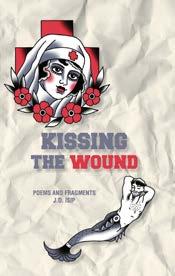
Author of Instructions between Takeoff and Landing and Nanopedia
There is a palpable struggle against powerlessness in J.D. Isip’s Kissing the Wound, and in its expertly crafted poems, the path to victory in that struggle always originates from within. Although its external expression varies from poem to poem (telekinesis, immense empathy, razor-sharp wings, conquering love), Isip shows us that the greatest power we have is our ability to remember, to render, and to navigate the “mess of lights and music” that is the human experience.
- Gustavo Hernandez, Author of Flower Grand First

J.D. Isip is the author of Pocketing Feathers (Sadie Girl Press, 2015) and several other works of poetry, fiction, and theater. His second full-length poetry collection, Kissing the Wound will be out in January 2023 from Moon Tide Press. He is also a full-time professor in Plano, Texas, and a contributing editor to The Blue Mountain Review.
new poetry release from J.d. ISIP & Moon Tide Press
Now available for Pre-Order Here https://www.paypal.com/cgi-bin/webscr?cmd=_s-xclick&hosted_button_id=BL9WWTM76EBM4
POETRY

POETRY
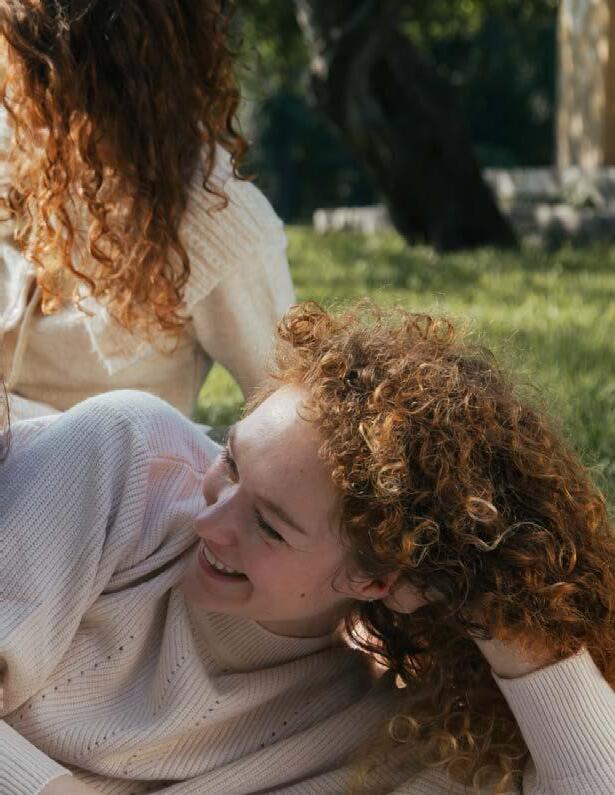
THE HAMMER’S STRIKE
by ANDREW M C FADyEN-KETCHUM
Do the wild things find each other beautiful? Does the buck gaze upon the doe, pluck Forget-me-nots, hoove messages of love In the streambed for her to find? Does the heart of the rainbow trout Quicken with the sight of the season’s first Turning leaves? Do mother robins push Their fledglings from the nest and think, “Beautiful! Just...beautiful!” I hope not. For this means a world in which the starNosed mole knows, one day, her children Will die. This means a world in which The black leach murders the hornworm To take his wife, in which the red fox yearns For deeper caves, the foxglove for more Effulgent bells, that church bells pray for song Without the pang of the hammer’s strike. “Leave that to us,” I say to the tittering Tit mice and doves. “Leave that to me,” I will say to my Lover’s eldest son Struggling with rage in our arms.
“Let’s make a new world together,” I will say to his mother when he quiets Into sleep. “Can’t we stay the hand Of the fisherman woken early For the stream? Surely we can teach Our boy how never to cry, how never To feel pain. Tell me, Sweet Thing, We can catch each fledgling Before it fails to open its wings.”
173

HEAVEN-FIRE
by ANDREW M C FADyEN-KETCHUM
Our middle child sings “Jingle Bells! Jingle Bells!” Well into February when he wakes in his crib Before his mother and I, his stepfather, have come To change his diaper and help him into clothes, And all he has to do is sing. The boy is not my blood Though “Son” is the only name I have for “HeWho-Will-Dance-To-Just-About-Anything,” “SonWhose-Heart-His-Mother-Believed-Was-BrokenUntil-The-Doctors-Inspected-Its-ChambersAnd-Valves-To-Declare-Him-Fit,” “Sweet Ndee Boy,” “Sweet Inupiaq Boy,” “Sweet-CarolerIn-The-Morning’s-Half-light,” “My heart beats Just like yours,” I want to write to him in the half-light Of the kitchen, “your song seemingly serenading The sun through the thin walls of this home we share On 2nd Street, the same sort of blood circulating Through our systems as daylight filters Through the invasive hackberries in which the Emperors Rest their wings, the same sort of blood, Son, Feeding the same sorts of muscles as a whisper Of a door opening down the hall halts your singing, Stills your stepfather (who is only doing his best) In the middle of his next line, the same saline Solution of tears—no matter the record of massacres And broken treaties between our peoples’ histories Brought to our sometimes-green/sometimes-blue Eyes when the mother we both love in our different ways Appears in the doorway, just-risen and withoutCoffee, her hair flaming down from the root like heaven... Like fire...Like heaven-fire. Like life! Like life!”
first published in Vox Populi
175

CATCH & RELEASE
by ANDREW M C FADyEN-KETCHUM
When finally it was time for our child To arrive, I was not allowed to enter The hospital room reserved for those With your last name. Instead, I went fishing, stayed by the phone
All that afternoon as I hunted for those Who breathe water—biding my time Until your text that would tell me
The little girl I’d call daughter
Had been born. My friends on the Buffalo Tried to hide their perplexion. They could not understand why a man Without children could fall so in love
With a woman expecting a child “not his.” Is any child really “ours?”
And how rare is it really for a man To dream of cradling the woman He loves as she nurses the child Who has only just become?
I caught a 23-inch small mouth that day, Biggest catch of my life. Five minutes Of struggle just to catch a glimpse Of that goliath of the shadows. Another ten before I held it aloft
By the gills for a picture then prepared it For release. The metaphor’s lost On neither of us: That little girl born That morning the exact same size As that small mouth I gave back
To the water at day’s end. Truth is, I ate that fish, brought home four fat filets I cooked four different ways for that Ndee mama—pan-fried, deep-fried, broiled, And grilled—the meat my Lover’s body took in Fed back to her child, “our child,” She said as she lay on the bed
That might as well have been a sand bank Of the river that child came from, Body-exhausted and healing while we held Our baby in our arms—“Big Fish” Blinking up at me, her life in my hands, My Lover holding my hand, this child
A gift of the water we hold hard to everyday And must learn, one day, to let go.
first published in Non-Binary Review, Issue 30
177

ABOUT BRIAN:
Brian Belefant used to be good-looking, but now he has a dog, and not just any dog, but a friendly, goofball dog who loves everybody except Santa Claus. His short stories appear in American Writers Review, Magpie Messenger, Story Unlikely, Libretto, and Half and One. Brian is also an award-winning fine art photographer. His novella The Sultan of Garbage will be published in 2024 by Atmosphere Press. He’s currently at work on his second novel.
AND THE WORLD SPINS
by WILLIAM WATERS
When you are laying on the ground Staring at the grass
Everything looks huge; The past seems unforgettable. Monsters hold your hand, Ghosts whisper in your ear, Parents tell you, you are wrong.
Nothing makes sense; Everything shakes. The world spins.
When you are laying on the ground Staring at the grass
People don’t exist; Money is impossible, Truth soaks you in sweat; Alcohol tastes like pain; Nobody hears you crying.
Nothing makes sense; Everything shakes. The world spins.
When you are laying on the ground Staring at the grass
Dry heaves don’t help; Your hands don’t work; Lights bend and break; Dreams stop being possible And your breath breaks like glass.
Nothing makes sense; Everything shakes. And the world spins.
179

ABOUT WILLIAM:
William Waters is an associate professor, in the Department of English at the University of Houston Downtown. Along with Sonja Foss, he is coauthor of Destination Dissertation: A Traveler’s Guide to a Done Dissertation.
HAND-TINTING 25-CENT
by TYRONE JAEGER
Mancy teaches you to hand-tint the photographs. First thing, you swirl the horsehair in your mouth and touch it to the watercolor crayon. Mancy’s brush makes black-and-white Wizard of Oz Technicolor. But you’re clumsier with the brush and the paint goes on thicker, like lipstick. That couple, so in love, and the quarter spun, like a bottle, from his hand to hers to your own. You gave them kerchiefs and a cowboy hat. She wore hers on head. We’ll come back tomorrow, he says. You painted them like bandits of love. No, banties of love, like that rooster painting Lance showed you to be funny: Le coq. Her shirt deep stripes and the background on fire. The blood seems to drip from his bandana. They never returned and so it went up on the signboard. No matter, you get to keep the quarter, but how you wish you could have seen their faces. Months later, you return to Quitman and the man shows up, asking for your husband. He eyes the board nervously. Speaks to Lance behind the trailer. Lance pulls the photos from the board and the man thanks him, tears in his eyes. That woman ain’t his wife, he says, and does his singsong three for a dime. You wonder if the man will trash the pictures or give them to the woman, who will tape it to the bed where they make love. Or, he’ll keep them in a drawer, or in a secret fold of his car’s upholstery, where he’ll pull it out from time to time, a secret ready to blow at any moment, the colors like the fourth of July, the impact like a bomb.
181
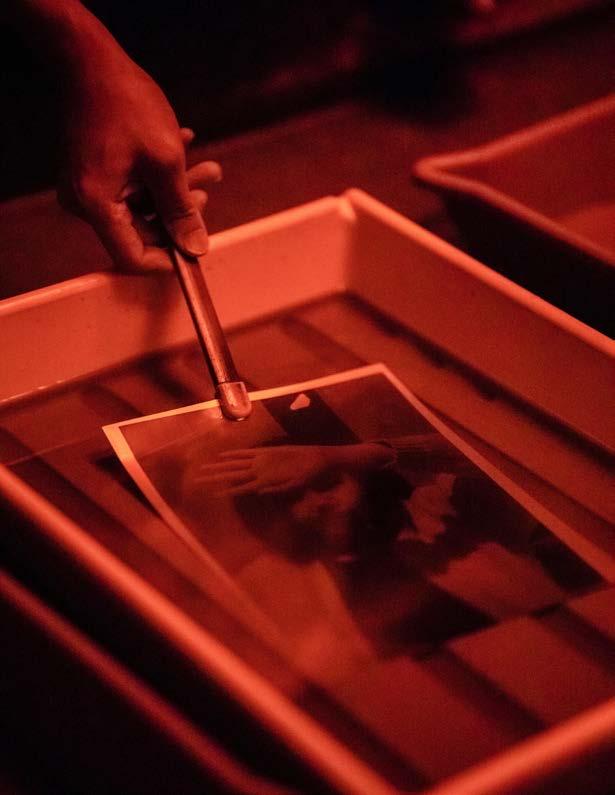
ABOUT TYRONE:
Tyrone Jaeger is the author of the novel Radio Eldorado, the story collection So Many True Believers and the cross-genre novella The Runaway Note. His writing has appeared in the Oxford American, Southern Humanities Review, Indiana Review, and elsewhere. He is the recipient of the Porter Fund Literary Prize, and he has been a member of the faculty at Hendrix College since 2008. Born and raised in the Catskill Mountains, Tyrone lives on Beaverfork Lake, Arkansas, with his wife and daughter. Visit his website www.tyronejaeger.com.
DRESSING FOR DINNER, OR HERE GOES MY DARLING AT DEPARTURES - NAPOLI
by HEATHER HARTLEY
Now that I have gone, hands crushed in my pockets, My pashmina becoming ideal—dusty rose turned early evening
The empty carcassed cars in the strada-side dump along the way to the airport— What does it mean when you look away?
All along the highway I saw yellow flowers abound amid cement buildings, thinking ginestra, ginestra when it’s no longer the season, But what is it the season for?
The season for leaving, For living, depending on how you pronounce. (So much depends on intonation, accident, my dears. Another cup of tea?)
From the road where you are driving, where we are United as never before in this heated leaving, When this happens and Where I write, ADD SOMETHING HERE WORD WORD WORD
And then fumble with the zipper of my leather jacket, black and stiff like a period at the end of a sentence, like that full stop, O how cold leaving is—how clean amidst the chaos— I gave myself some Rimbaud ma bohème
As an older couple laugh to the lees beside me, Drinking their moon drinks with ice and With a look of high school crushes in their eyes, How they sip and sink slowly the drink to end all drinks, This is as good as it gets—
Can we leave one another alone long enough to come together?
The older couple has left, glasses drained— no answers.
183

ABOUT HEATHER:
Heather Hartley is the author of the poetry collections Adult Swim and Knock Knock, both from Carnegie Mellon University Press. She was Paris Editor for Tin House magazine for over fifteen years. Her short fiction, poems, essays and interviews have appeared in or on PBS Newshour, The Guardian, The Literary Review and other venues. She has presented writers at Shakespeare and Company Bookshop. She teaches creative writing at the University of Kent’s (UK) Paris School of Arts and Culture and has also taught creative writing at the American University of Paris and the University of Texas El Paso MFA program.
MOMMA’S SONG
by HEATHER HARRIS
Momma sings, as she slips into the nook of her acoustic, like a mother nursing baby.
Her sadness reverberates me like the rocking chair used to.
The Farmhouse sleeps even through the creaks, and I steal secret glimpses of her transparency in the moonlight.
It’s good to see her insides once in a while.
My favorite is the one she wrote about her brother becoming a man, traveling abroad, and turning into someone no one understands.
I wonder if Momma knows how I ache for he lost dreams, misplaced by my father, my brother, by me.
Now Momma drives wide-eyed into the night, to pick up the sailor who withers what blooms in her heart.
Brother’s head bobs sleepily up and down on bumps keeping time to the radio’s hum.
Tom Petty serenades us peacefully, truthfully. Silently I sing:
Momma belongs among the wildflowers; Momma belongs somewhere she feels free.
In my heart, I dedicate someone like Tom Petty to Momma, And stare unphased as the moon stalks me.
185
***

ABOUT HEATHER:
Heather M. Harris is an emerging writer of memoir, poetry, short-stories, children’s books, and an illustrator who lives and writes in the New Orleans area. Heather holds a Master’s of Arts and Teaching and a Bachelor’s of Arts and Sciences in Psychology both from Southeastern Louisiana University. Heather is a contributor for The Blue Mountain Review, and a member of The Southern Collective Experience.
A RUSSIAN-AMERICAN NOVEL
by MAXIM D. SHRAYER for K.
You played the cello at a classmate’s wedding… It was a hot September in Vermont many years ago. The girls had not been born though we were trying. Desperately? Not so much, not yet—the happy ending obliterates the memory of want.
You played the cello in a sage green outfit, sleeves flowing on the mountain air. I don’t remember what you played. Glière? Or was it Bruch? Some long-forgotten tier of melodies, a hideaway, an orbit where hours were long, arms bare.
You played the cello, but it was your old cello, the one the cleaners dropped and cracked. An accident. It had to be replaced. We bought a German make, it played so lustrously that we abandoned the yellow old maple body though we kept the strings…
The married classmate is no longer a kindred spirit, though once a month you see her at grand rounds. Our daughters now make their own daily rounds, replete with teenage sites and sounds, and only rarely do you and I revisit the places where the past rebounds.
In those memories you play and smile faintly, your fingers stir like pebbles in the brook, your bow unlocks the long-forgotten songbook in which we lived, allowing for the daily Tolstoyan miracle, the promise of a family, Five years. Sixty months. All it took.
187
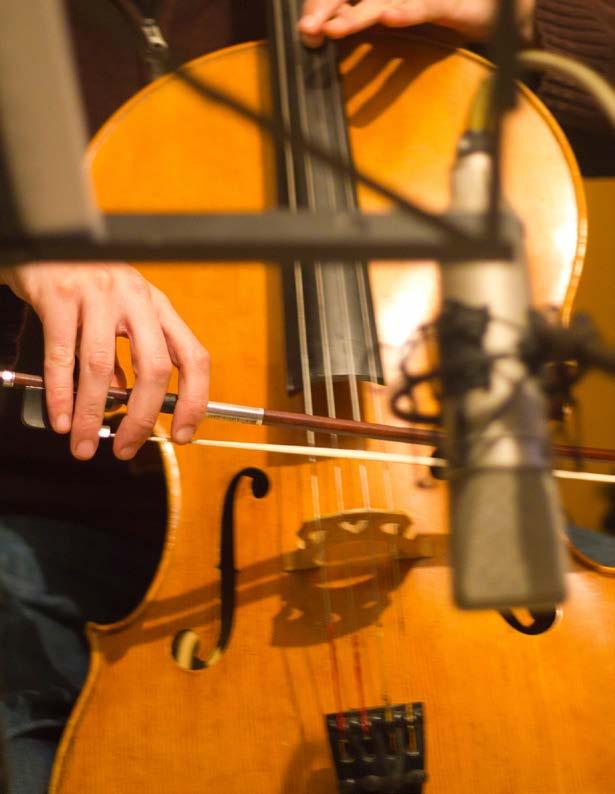
ABOUT maxim:
Maxim D. Shrayer, a bilingual writer in English and Russian, is a 2012 Guggenheim Fellow and a winner of a 2007 National Jewish Book Award. Shrayer left the former USSR in 1987 and lives in the Boston area, where he teaches at Boston College. His 25 books include three collections of Russian-language poetry and a collection of English-language verse. Shrayer’s new collection, Kinship, is forthcoming in 2024.

http://www.southerncollectiveexpereience.com





190 BLUE MOUNTAIN REVIEW APRIL 2024 Look no further... ONE MONTH FREE plus... 1 DAY FREE TRIAL! OfficeEvolution.com/locations/roswell • roswell.ga@OfficeEvolution.com PRIVATE OFFICES, COWORKING & MEETING ROOMS 470-514-1500 821 Atlanta Street, Roswell, GA 30075 *Inquire within for further details roswell.ga@officeevolution.com roswell.ga@officeevolution.com officeevoltion.com/locations/roswell
by HOMA MOJADIDI
BLUE
My husband painted our bedroom white but when he ran out of paint, he painted one of the walls blue
I love the crimson of rose and milky white of the magnolia but I keep returning to the hydrangea’s blue
I crave the joy of unrestrained laughter but the feeling I keep returning to mostly is blue
I love the towering smoky clouds that gather before a storm but the color of sky that I love best is blue
My seven-year-old keeps swimming outdoors even in October until his pouty pink lips start to turn blue
I look at a picture of my grandfather in his green chapan but I always envision him shrouded in robes of royal blue
If the blood in my veins runs red, then why is it that the veins beneath my skin appear blue?
My mom preaches to me against antidepressants and their side effects—but what if I’m really tired of feeling blue?
My son tells me everyone’s soul has a color when I ask him the color of my soul? He says blue
191

LIFE SENTENCES
by Jeffrey Greene
1. The Myth
I shouldn’t have dreamed this, because it wasn’t dreaming, but being alive again, side by side, gossiping, an aftermath of talk and touch, whatever can’t possibly last, and then the lesson, do it right, a hard slap to the chest, the heart, and don’t pull out like that, in true fury, and say you don’t know how alone that makes me feel, and I stay quiet, close my eyes, you on your stomach, while I dreamed, going somewhere, maybe walking a path where there was an adder, making you jump to me, like a myth I stayed in forever.
2. Weekend
Why should I believe you when you have already left, not these walls, not this bed, not the morning sheets filled with October light, tremulous, shadows from a changing tree, the clean window, and you wearing nothing but light, because you left, have nothing else to put on, the way that I have nothing to wear in a dream of the dead, and you don’t work today, Saturday, say it’s okay, try something new.
193
3. The Leaves
Finally free of you to whom I sang your theme song, even at the very end, “I believe in miracles,” nearly night, a continent away and then some, while all you could do is turn furious circles in dreams, though by then you couldn’t even feel your legs that were once leaves parting, beautiful fearless love, enough to make me enter a real church you hated, to pray.
4. The Underworld
Tell me what it means to be you, a strange emotion-filled dream, you as corporeal as a night curtain over the courtyard moon, stepping toward this bed, the struggle in trying to remember where we are this time, which room in which building after both you and our years are gone, and you standing over me pull back the sheets to peer across my body and then run your hand down my split chest, divining an underworld in the heart’s roots.
194 BLUE MOUNTAIN REVIEW APRIL 2024

ABOUT Jeffrey :
Jeffrey Greene is the author of five collections of poetry, a memoir, four personalized nature books, and a book of mixed genre writing. His writing has been supported by the National Endowment for the Arts, the Connecticut Commission on the Arts, and Rinehart Fund, and he was a winner of the Samuel French Morse Prize, the Randall Jarrell Award, and the “Discovery”/ The Nation Award. His writing has appeared numerous publications, including The New Yorker, Poetry, The Nation, Ploughshares, The Kenyon Review Online, Agni, Southwest Review and the anthologies Strangers in Paris, Intimacy, and Nothing to Declare: A Guide to Flash Sequence. He is a professor emeritus at American University of Paris.

https://www.sweetwaterfamilydentistry.com/ www.sweetwaterfamilydentistry.com
by JOHN ROBERT LEE
What spectres of loneliness do they yearn after, hearts prone under hard and cold eyes, untouched, faced with backs turned to distractions, assaulted with impatience, scourged with edged word?
ROCK
—the first bright-eyed gazes of interest that laughing mouth which invited intimacy the first knowings of deep sacred spaces embraces of holy moving — these, these wraiths of midnight remembrances, bewilderments, despair, decaying bones of who once pledged for ever.
197

198 BLUE MOUNTAIN REVIEW APRIL 2024
ABOUT JOhn:
John Robert Lee is a Saint Lucian writer. His Belmont Portfolio: poems (Peepal Tree Press) and IKONS: new and selected poems (Mahanaim Publishing/Msgr Patrick Anthony Folk Research Centre, Saint Lucia) were recently published.
Loveontherocks by Shallon Fadlien

https://www.nuci.org www.nuci.org
199
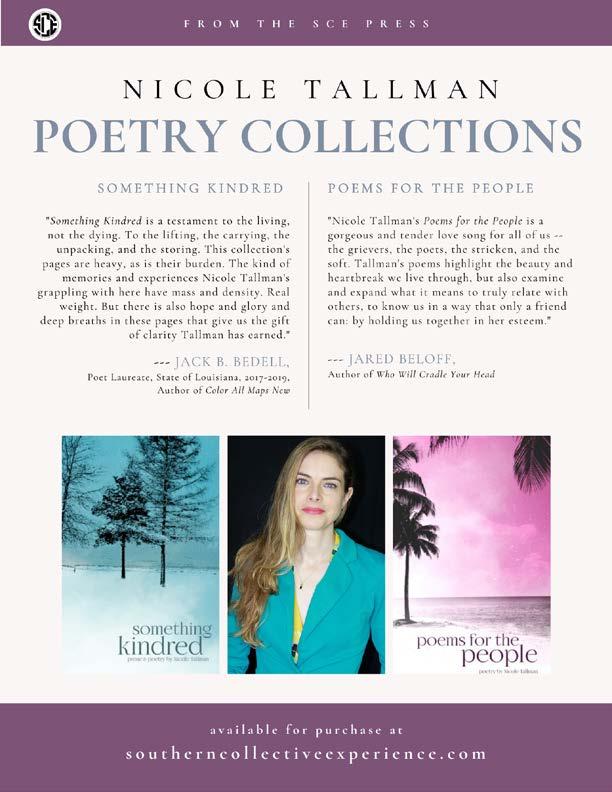
southerncollectiveexperience.com
BRIGHT
by KENDEL HIPPOLYTE
Consider this:
that death may not be a darkness, but a white light so harsh we have to close our eyes.
See it then as an illumination that we cannot face, a lucence that we turn our backs against, fearful of blindness.
And yet we know the wavering shapes before our squinted eyes are not quite true, they change too much although we name them down.
Consider too, though not with blind belief, the rumours of the few who, opening their eyes to seering light, saw without shadows.
Perhaps whether death is a darkness or a light finally depends on how you see things. Sometimes when you really see a thing in time, knowing it must go, it can seem so bright.
201

ABOUT KENDEL
: His poetry ranges across the continuum of language from Standard English to the varieties of Caribbean English. He has published seven books of poetry, the latest being Wordplanting (Peepal Tree Press, 2019) and his poetry has appeared in regional and international journals and anthologies. He has taught poetry workshops in the Caribbean and the UK. He has performed his work internationally at events such as the Medellin Poetry Festival and Havana Book Fair. He has been the recipient of a James Michener Fellowship to study poetry and an OAS scholarship to study theatre. He is the winner of the Poetry Prize in the Bocas Literary Festival, 2013.
SQUISHMALLOW POEM
by NATHAN SPOON
I don’t care about seeing the sun again so long as I have a place to walk and so long as the forward feature is growing.
I’ll grow up and start acting my age after I’ve had the rest of my life to unmask more. The thing about masking is you keep doing it even as you are undoing it. Besides everybody knows you can’t cut the head off a thing that doesn’t have one. All you can do once you are in its jaws is look on in awe and clap more. You want what you want and that’s alright and not your fault. But I have a heart with rows of the most dazzling teeth. Living takes a lifetime for all of us. Teeth in your heart swear it.
203

ABOUT nathan :
His poetry ranges across the continuum of language from Standard English to the varieties of Caribbean English. He has published seven books of poetry, the latest being Wordplanting (Peepal Tree Press, 2019) and his poetry has appeared in regional and international journals and anthologies. He has taught poetry workshops in the Caribbean and the UK. He has performed his work internationally at events such as the Medellin Poetry Festival and Havana Book Fair. He has been the recipient of a James Michener Fellowship to study poetry and an OAS scholarship to study theatre. He is the winner of the Poetry Prize in the Bocas Literary Festival, 2013.
205
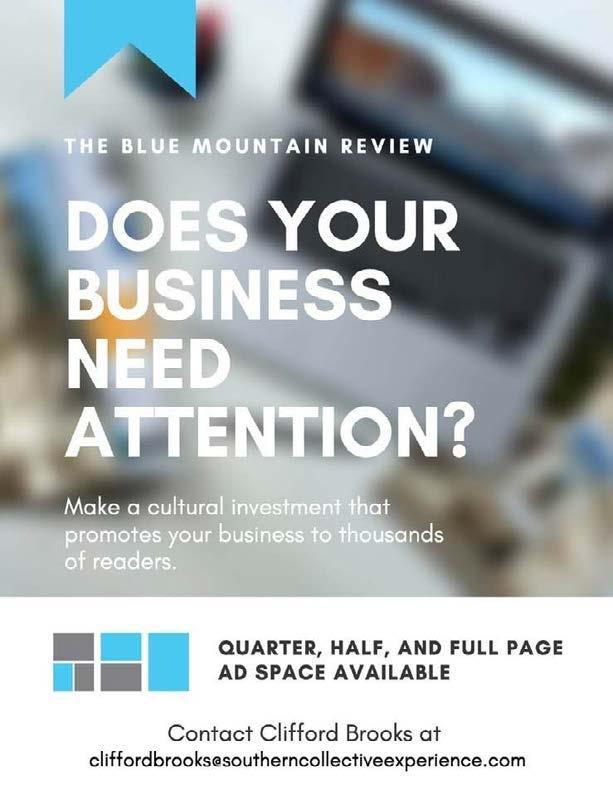
cliffordbrooks@southerncollectiveexperiemce.com
I’VE RECENTLY BEEN DIAGNOSED WITH DUMBASS DISEASE
by Rani Ruado
You can say a writer practices being dumb. Only a dummy would stand out in the rain and watch a puddle. If you’re smart, you get in out of the rain so you won’t catch a cold, and you have health insurance, in case you get sick. If you’re dumb, you are more interested in the puddle than in your security and insurance or in getting to work on time.
-Natalie Goldberg
My doctor gave me the news during a routine physical— says I caught it by loving with a bareback heart.
When she finished I nodded unsurprised, agreeing.
That explains a lot, I said.
She asked me what I meant and I told her that a week ago two men in orange vests chopped down the tree I used to look at during lunch.
I never sat beneath the shade of this tree. Never hugged it. Never climbed it. Just stared at it from a nearby table while eating a sandwich on my hour-long break.
I told her I ugly-cried about that tree the entire drive home. No tissues in my car— the road in front of me an impressionist’s painting of traffic.
207
She said, you should have pulled over, collected yourself I said, I didn’t know that was allowed.
I asked her if insomnia is symptomatic of Dumbass Disease.
Because I can usually go to bed before midnight, but on nights of a full moon I stay up well-past 3 a.m., my face lit by the glow of my phone, waiting to see if the first boy whose forehead I kissed might still text me back
Her chair swiveled to face me, the doc’s eyes wide, eyebrows arched. Oh honey, you’re worse than I thought.
So many things suddenly made sense.
I told her how, when I see an ambulance rushing a few blocks away, I audibly whisper good luck to them as if they can hear me.
How I can listen to an entire class compliment me on something I wrote, and not believe a single word.
How I’ve gotten soaked by the rain countless times walking back to my car from class, forgetting I keep an umbrella in my backpack.
I asked her if there’s anything I can do about my condition. If there’s some pill I can swallow. Some herb I can smoke. Some shot I can shoot. An operation to cut the stupid out my brain— any kind of cure!
She only smiled. Placed her hand on my shoulder and said:
Now why the fuck would you want anything like that?
208 BLUE MOUNTAIN REVIEW APRIL 2024
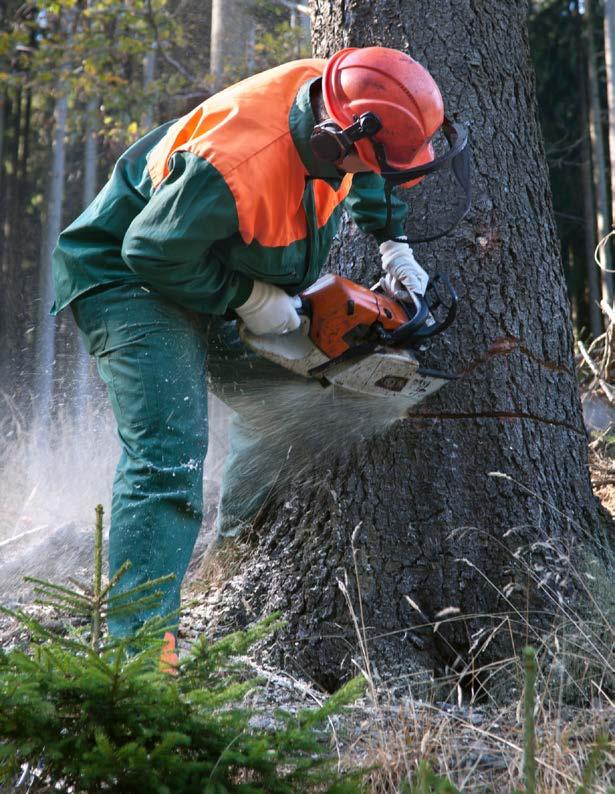
ABOUT rani:
Rani Ruado (he/they) is an award-winning poet, baker, first-generation Filipino-American, teacher, Capricorn, songstress, and amateur grandma. Born and raised in Miami, Florida, he is a recent graduate of FIU’s Creative Writing MFA program. You can find him on Instagram as @ran_jun. If you ever need a karaoke partner, he is always available.

Selected as one of Kirkus Reviews’
Best Indie Books of 2023
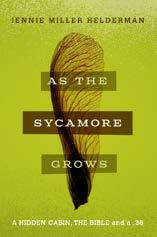
“Helderman chronicles a woman’s journey from battered wife to advocate for victims of spousal abuse in this nonfiction work ... At times a difficult read, but the humanity and McNeil’s indomitable spirit shine through.”
– Kirkus Reviews (starred review) 100 Best Indie Books of 2023

 By Jennie Miller Helderman Award-winning Journalist and National Speaker
By Jennie Miller Helderman Award-winning Journalist and National Speaker

Kirkus Reviews’ Best Indie Books of 2023 Top 100 lucidhousepublishing.com
Available in print, e-book, and audiobook lucidhousepublishing.com
IN THE SANTA MARIA SOPRA MINERVA
BY raye hendrix
Forsaking redemption, I touch you, let you touch me, in the votive lit dome of the empty cathedral that once was a temple to a goddess of war, the soft sopranos of sisters singing their Latin offices reaching us trespassers from somewhere within the marbled walls. Your confession at my throat, my back a new arch among high gilded arches, my eye’s corner bright with candles lit for the dead, our quiet little deaths. Lips and hands doing what lips and hands do, unholy palmers watched by golden stars and painted saints. Vaulted ceilings pitch our small sounds like offerings to the altar where headless Catherine sighs a breath of roses, her thousand -year hunger suddenly renewed. O, divine songs of our transgression. O, this human worship. O, your mouth on my mouth, the shape you make of my mouth.
211

ABOUT raye:
Raye Hendrix is a writer, photographer, and disability scholar from Alabama. Her debut poetry collection, What Good Is Heaven, is forthcoming from Texas Review Press (2024). Raye is the author of two chapbooks and the winner of the Keene Prize for Literature (2019) and the Patricia Aakhus Award (Southern Indiana Review, 2018). Their work appears in American Poetry Review, Poetry Northwest, 32 Poems, and others. Raye is the poetry editor at Press Pause Press and co-editor of DIS/CONNECT: A Disability Literature Column (Anomalous Press). She is a PhD candidate and Oregon Humanities Center Dissertation Fellow at the University of Oregon.
SAGRA DEL PESCE, CAMOGLI
by stephanie papa
All year they wait for it, round basins three feet wide filled with floured fish, bubbling in metal baskets which the women shake with their cast-iron arms. They share the fish in paper boats stained with shadows of oil. Bread rises, the sea rises, heads lean into newspapers. Boys chase a ball in the piazza, bathers unfold chairs in the shade of the bagni lido, their buttocks like warm figs. At sundown, the young ones take their positions, straddling the village walls, necking at the fountains, tongues of fish scales and lemon. A priest tall and somber as a lighthouse leads the procession, then come the naval cadets with tassels raining from their shoulders, gypsophila tucked in their breast pockets. The fishermen carry San Fortunato encircled by windless candles that beacon the black sea. Then comes the burning of the wooden statues. The fisherman light them on fire, the villagers climb onto each other’s shoulders to watch. They become themselves so effortlessly in the dark, clinging to one another in desperation and rapture, forgetting their names.
213
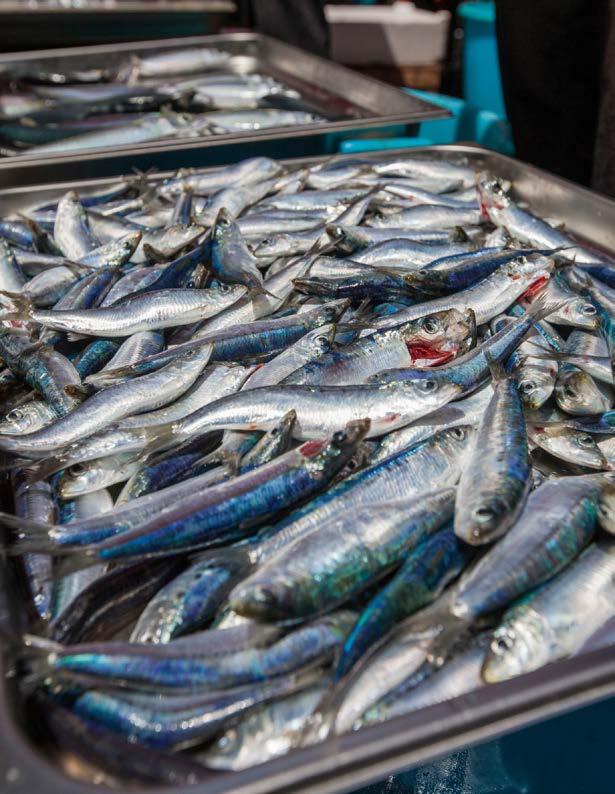
ABOUT STEPHANIE:
Stephanie Papa is a poet and translator living in Paris. She was an Irish Research Council Postdoctoral Fellow at University College Dublin in 2022-2023. Her poetry and translations have appeared in The Stinging Fly, Modern Poetry in Translation, Michigan Quarterly Review, World Literature Today, Magma Poetry, the anthologies Diversity Poems and It All Radiates Outwards (Verve Poetry Press), and elsewhere.
I DON’T REMEMBER WHAT SHE LOOKS LIKE
BY TREY RHONE
my nana wasn’t born in a hospital or a manger or down in the reeds by a river no, she popped out of a bowl of grits a fully formed Southern woman the kind I remember the kind I always saw & knew
her Southern Baptist God blessed her hands to be those of a healer & blessed her heart to be full as church on Easter Sunday
she fed the hungry with Waffle House waffles & healed the sick with a simple honey or sugar
God knew she was too good for this Earth so he cursed her lungs they couldn’t hold weight they couldn’t hold air they were leftover birthday balloons too weak to float into the atmosphere & inevitably burst
weighed down by oxygen tanks wrapped up in breathing tubes voice fading day by day don’t buy instant grits they won’t taste as good
215

ABOUT trey:
Trey Rhone is a queer black southern writer and educator who hails from Augusta, Georgia, but now resides in Miami, Florida. He has earned an MFA in Creative Writing from Florida International University. He’s been published and has forthcoming publications in Stirring, Mayday Magazine, Daily Drunk Magazine, Olney, BULL, and Broadsided Press. If he isn’t ranting about the latest music releases, ask him to tell you a fun fact about his favorite animal, the possum.
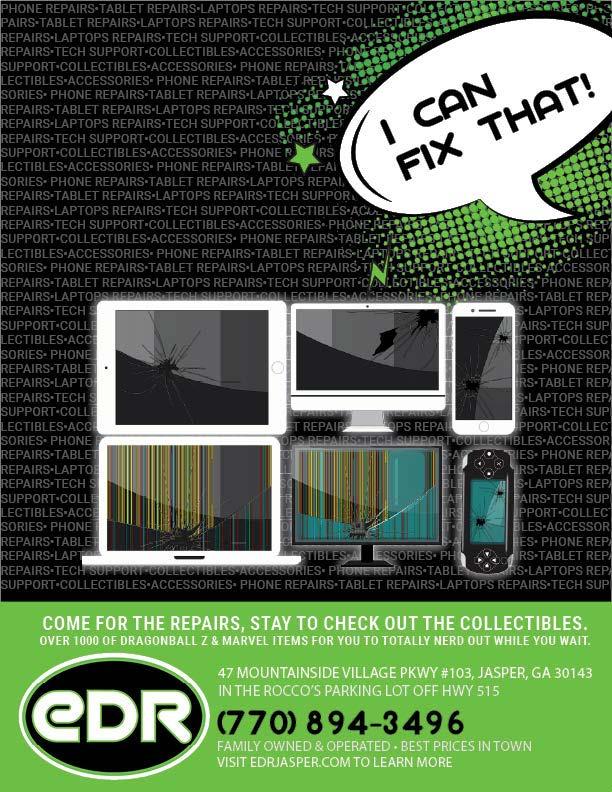
https://edevicerepair.com
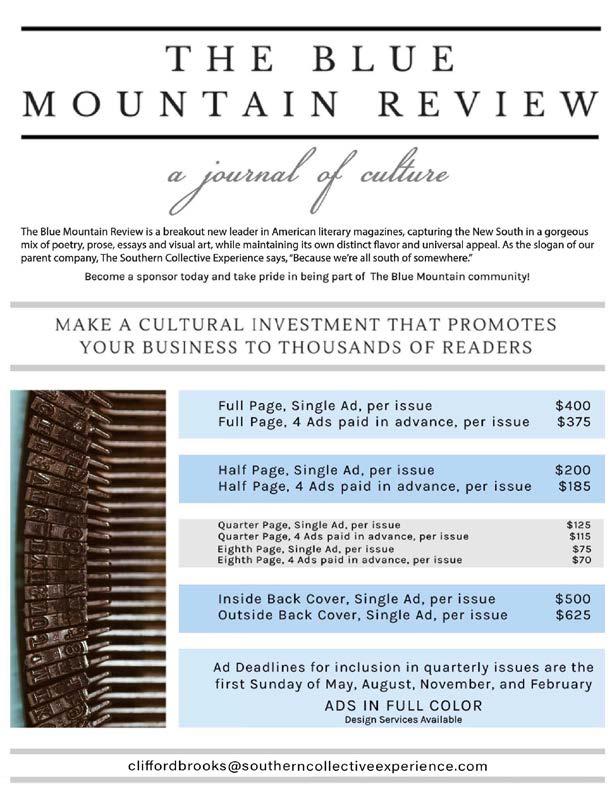
Full-Page Ads: Single Ad, per issue.......................................................$400 4 Ads paid in advance, per issue...................................$375 will work with nonprofits for donations to advertise. Half-Page Ads: Single Ad, per issue.......................................................$200 4 Ads paid in advance, per issue...................................$185 Quarter-Page Ads: Single Ad, per issue.......................................................$125 4 Ads paid in advance, per issue...................................$115
cliffordbrooks@southerncollectiveexperience.com
CONTRIBUTING EDITORS

nicole tallman
contributing editor
Nicole Tallman serves as Poetry and Interviews Editor for The Blue Mountain Review. She is the author of Something Kindred & Poems for the People (The Southern Collective Experience Press) and Poetry Ambassador for Miami-Dade County. Find her on Twitter and Instagram @natallman and nicoletallman.com.
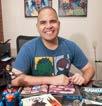
J.D. Isip Contributing editor
J.D. Isip is a full-time professor at Collin College and a writer. His poems, plays, fiction, and essays have appeared in a variety of national magazines and journals. His first collection of poems, Pocketing Feathers (2015), was released by Sadie Girl Press, and his second collection,Number Our Days, will be released by Moon Tide Press in 2023. He grew up in Long Beach, California, served in the U.S. Air Force, and worked for Disney before he started teaching.

Ahna Phillips contributing editor
Ahna is the executive director of a community-based philanthropic arts organization in metro Atlanta. Her professional experience includes book publishing in Nashville, Tennessee, as a literary agent and freelance writer and editor, as well as in nonprofit leadership in Austin, Texas, at an art studio and gallery for artists with disabilities. She holds an MA in Theology and the Arts and is a singersongwriter with two independent albums.

CLAYTON JONES contributing editor
Clayton Jones is a writer, singersongwriter, and professor living in Chickamauga, GA. His poetry and prose has appeared in many journals and magazines including The Cortland Review, Boston Literary Magazine, and American Songwriter. He has written and recorded several albums of original music. He is founder of Southwind Media (southwindmedia.net) where he offers editing and other literary services. He is a professor of English at University of Tennessee at Chattanooga and holds a M.F.A. in poetry from Georgia State University.
Photography credits
Anthony Tran
Bella Thornton
Connie Thornton
Kinga Howard
Oscar Chevillard
Priscilla duPreez
Yuri Efremov
Aaron Burden
Andrey Zvyagintsev
Daiga Ellaby
Darius Cotoi
Gift Habeshaw
Jeremy Bishop

JENNIFER GRAVLEY contributing editor
Jennifer Gravley has published widely in such venues as Southern Poetry Review and North American Review, among others. She has an MFA from the University of Alabama, where she was a winner in the AWP Intro Journals Project in fiction and held a Teaching- Writing Fellowship. She has attended the Sewanee Writers’ Conference and been awarded a residency from the Ragdale Foundation. Gravley, assistant director of an academic library, hails from the North Georgia mountains and now resides in the middle of the middle of the country with her husband and his plant.
219
Marcos
Rod Long Todd Trapani Tschernjawski Sergej uwe-conrad Vladislav
Gabarda
Nikonov
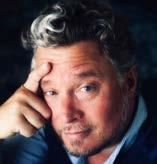
clifford brooks editor-in-chief
Clifford Brooks is the CEO of the Southern Collective Experience and Editor-in-Chief of the Blue Mountain Review. He is also the journal’s content editor.
Aside from these duties, Clifford is the author of The Draw of Broken Eyes & Whirling Metaphysics, Athena Departs, and Exiles of Eden. These collections of poetry can easily be found online.

NICOLE parry
SUBMISSIONS CONTENT COORDINATOR
Nicole Parry, M.Ed., BCBA, LBA is a Board Certified Behavior Analyst, licensed in the state of Virginia, who writes care plans for children with Autism and supervises the ABA therapy provided to her clients. She earned her B.S. in Psychology from Bridgewater College and her M.Ed. in Educational Psychology: Applied Developmental Science from the University of Virginia. In her free time, Nicole enjoys reading, writing, singing, and playing piano. She has always had a passion for editing and proofreading, be it academic papers or creative fiction.

Carmen Acevedo Butcher
contributing editor
Carmen Acevedo Butcher is the translator of The Cloud of Unknowing, a Georgia Author of the Year Awardee, and Practice of the Presence by Brother Lawrence, among others. Her dynamic work in spirituality and the power of language has garnered interest from various media, including the BBC and NPR’s Morning Edition. A Fulbright scholar at University of London and Fulbright Senior Lecturer at Sogang University, Carmen currently teaches in the College Writing Programs at UC Berkeley. Online at www.carmenbutcher.com and https://linktr.ee/carmenacevedobutcher

kaitlyn young design & layouts
Georgia-native, Kaitlyn Young is a freelance graphic designer, specializing in both print and digital creative collateral.

lynne kemen contributing editor
Lynne Kemen lives in Upstate New York. Her chapbook, More Than A Handful (Woodland Arts Editions, was published In 2020. Five of her poems appeared in Seeing Things Anthology, Edited by Robert Bensen. Her poems are in La Presa, Silver Birch Press, The Ravens Perch, Blue Mountain Review, Fresh Words Magazine. She was Runner Up for The Ekphrastic Journal’s competition of Women Artists. She is on the Board of Bright Hill Press in Treadwell, NY.Her full length book of poetry was published by SCE Press in Oct 2023.
220 BLUE MOUNTAIN REVIEW APRIL 2024

Chris terry contributing editor
Chris Terry draws from his fanatic love of films & music when crafting his reviews. After receiving his Master›s in Fine Arts from the Savannah College of Art and Design, he’s gone on to work on numerous independent and major films along with producing film scores and music for a wide variety of genres. Chris is currently working with the film production company Fifteen Studios on upcoming projects.

Debbie hennessey
contributing editor
Debbie Hennessey was named AC40
Female Artist of the Year by New Music Weekly and scored a Top 20 Hit on their AC40 Charts. A song she cowrote recently hit the Top 5 on Roots Music Report’s Americana Country chart. Her songs have been honored by Great American Song Contest, International Songwriting Competition, Billboard World Song Contest, and others. Her music and videos have aired on USA/UHD Networks, NBC, GAC, Extra, and The Next GAC Star. She has over a dozen releases on her label Rustic Heart Records and is a voting GRAMMY member. In addition, Debbie was the managing editor of LA411 & NY411 for Variety and has created several magazines and directories for various industries over the years. Through her company Entertainment Editorial, she works with a diverse range of clients to meet their editorial needs. She also writes for Dante’s Old South Radio Show blog and the Blue Mountain Review. You can find Debbie at www.entertainmenteditorial.com and www.debbiehennessey.com.

KAYLA LOOKINGHORSE-SMITH
contributing editor
As a mother, designer, artist, and tribal citizen, Kayla lookinghorse has forged her own path by creating iconic printed dresses and signature jackets which are the cornerstone of the K.lookinghorse brand. Working toward bridging the gap and creating space for Authentic Inspired Native design Not Native Inspired. From her creations to your closet shop the latest collections that naturally empower through storytelling and design.

Ellen Bass contributing editor
Ellen Bass’s most recent collection, Indigo, was published by Copper Canyon Press in 2020. Her other poetry books include Like a Beggar, The Human Line, and Mules of Love. Her poems appear frequently in The New Yorker, American Poetry Review, and many other journals. Awards are Fellowships from the Guggenheim Foundation, The NEA, and The California Arts Council, The Lambda Literary Award, and four Pushcart Prizes. She co-edited the first major anthology of women’s poetry, No More Masks!, and her nonfiction books include the groundbreaking The Courage to Heal: A Guide for Women Survivors of Child Sexual Abuse and Free Your Mind: The Book for Gay, Lesbian and Bisexual Youth. A Chancellor of the Academy of American Poets, Bass founded poetry workshops at Salinas Valley State Prison and the Santa Cruz, California jails, and teaches in the MFA writing program at Pacific University.

Trey Keeve contributing editor
Vernon (Trey) Keeve III is a doctoral candidate in the Teaching of English Program at Columbia University, Teachers College. They previously taught in a continuation school in Oakland, California. Their book Southern Migrant Mixtape (Nomadic Press) was the recipient of the PEN Oakland Josephine Miles Award in 2019.
221
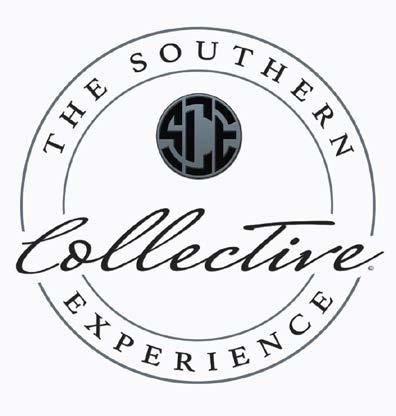
222 BLUE MOUNTAIN REVIEW APRIL 2024

































































































































































































































































 By Jennie Miller Helderman Award-winning Journalist and National Speaker
By Jennie Miller Helderman Award-winning Journalist and National Speaker





















